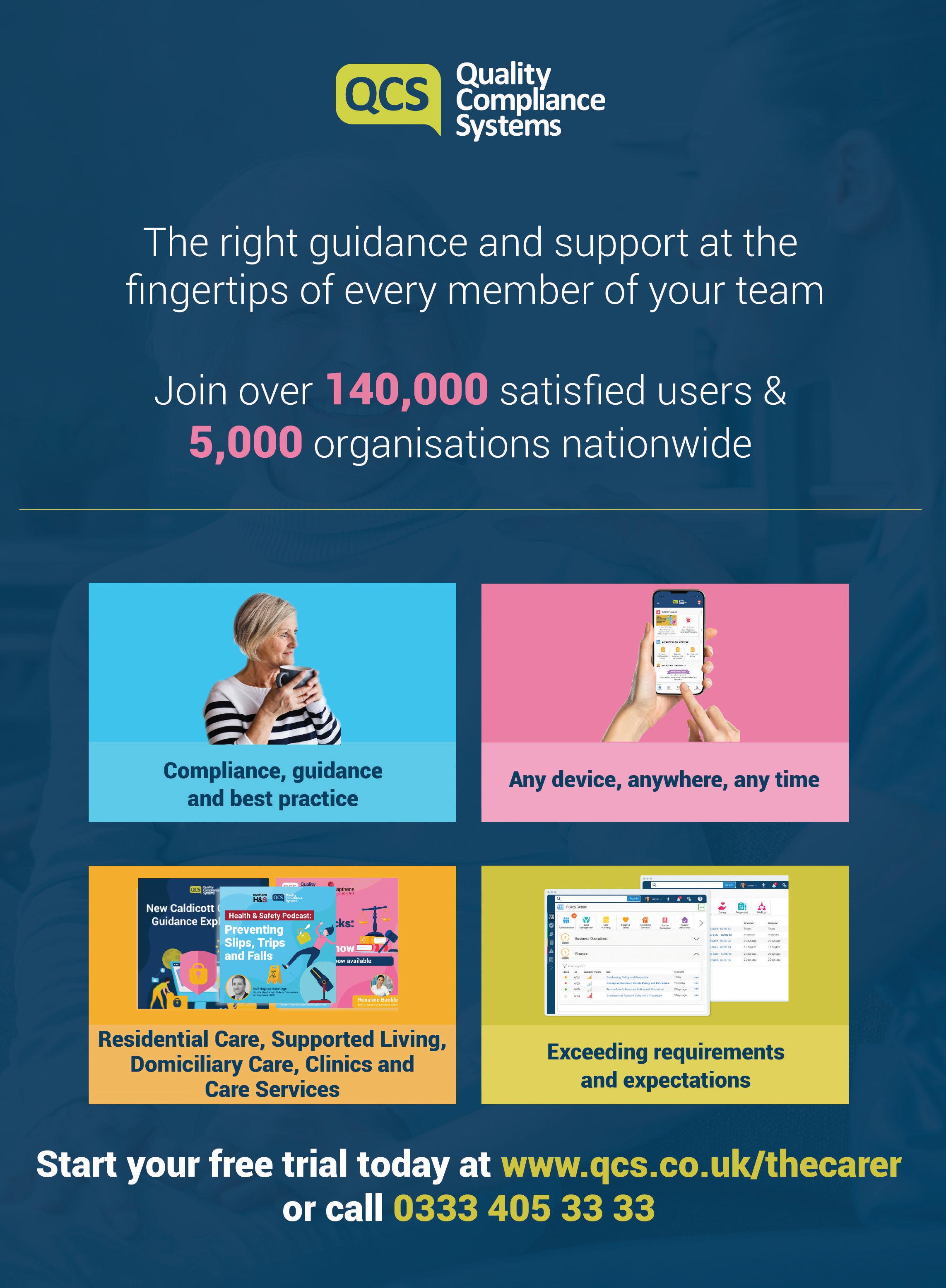New Report Calls for Urgent Action to Reduce Social Care Workers Pay Gap















Welcome to the last edition of The CARER for 2022!
Perhaps not as to tumultuous as 2020 and 2021 but a turbulent year nevertheless for the country and the adult social care sector
At the very beginning of the year we still had isolation rules in place and they were in the process revised down to 14 days Up to half of care homes at the time were refusing to accept new residents as the staffing crisis intensified leading to calls for a volunteer army to alleviate the crisis
The mandatory vaccine policy for care staff was in place However, the government revoked its policy for NHS care staff and a consultation on mandatory vaccines the care staff followed, resulting in mandatory vaccination being revoked on March 15 The government also introduced a policy to prioritise care residents with booster shots
In the same month we saw that the government was defeated in the House of Lords with its proposed changes to the care cap following which we saw calls by campaigners to introduce a legal right for families to remain in contact with their loved ones in care settings
This was followed by news that the effectiveness of vaccines wavered after three months among care home residents and the then Prime Minister Boris Johnson proposed a care Levy to be added to National Insurance contributions
April saw the discharging of hospital patients into care environments deemed unlawful by the High Court, and at the same time we saw calls for the immigration Visa rules to be scrapped followed by report revealing that over 500 000 people were waiting for social care
Another report in May revealed that the government had seriously underestimated its care reforms by as much as £10 billion while in June the government announced the biggest shakeup to health and social leadership in a generation Come July a report revealed the staggering cost of waste and personal protection equipment (PPE) with £4 billion of taxpayer money wasted on a new Covid PPE
The same month also saw the Labour Party call for a national care service and at the same time the government kicked the can down the road once again in social care reform until 2025
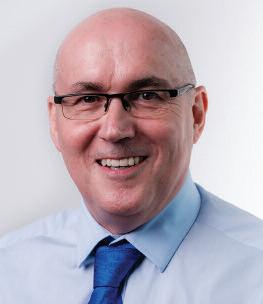
In July Baroness Hallett officially launched the UK Covid-19 enquiry opening its first investigation into how well prepared the UK was for the pandemic August saw the Health Secretary order an increase in overseas recruitment to solve the sector staffing crisis and it was revealed that operators were struggling to compete with supermarkets’ rates of pay
September saw new Prime Minister Liz Truss, who abolished the proposed Social Care Levy, and we also saw the death of our longest reigning monarch Queen Elizabeth II
Further reports revealed a care system in crisis and gridlocked, with vacancy soaring to the highest level at 52% with the adult social care workforce shrinking for the very first time
October saw Liz Truss forced out of office after only 44 days to make way for our new Prime Minister Rishi Sunak, and Chancellor Jeremy Hunt
November saw Parliament hold a debate to end isolation in care environments and saw the new Chancellor increase social care funding but not to the level he had himself had called for when he was chair of a health select committee The Chancellor also announced a delay to adult social care reform for 2 years
We also saw positive results for a new Alzheimer s drug bringing renewed hope to sufferers of this devastating disease and at the same time we saw the release of former Health Secretary Matt Hancock s diaries which observers including me denounced as a blame game
We also saw at legal challenge to the government s vaccination policy in care workers fail at an industrial tribu-
nal and the news that the NHS had visited every care home in England to offer vaccines ahead of Christmas Have I left anything out? So a very challenging year for the sector, but once again a testament to the sector’s resilience its ability to adapt and its ability to continue to provide the care that it does despite the challenges it faces
Oh, there was one more thing! In August this year we launched our very first “Afternoon Tea Week” competition will be invited care homes around the country to send in their stories and how they were celebrating this quintessentially British tradition with the prize being a luxury hamper packed with Scottish goodies!
The reason I mention this is we were staggered here at THE CARER with the response we received Don t take my word for it have a look here: https://issuu com/thecarer/docs/the carer digital issue 114/28

We were overwhelmed and again a testament to the hard work and dedication inspiration enjoyment job satisfaction those in the sector demonstrate on a day-to-day basis
We were delighted when we were at a tradeshow in September that the winners of the competition Hutten View care home in Brentwood paid our stand visit!
We were so encouraged by the response we introduced a competition for a festive hamper for one lucky care home that really pushed the boat out this Christmas (see page 5)
So please do continue to share your stories of awards and any other birthday celebrations fundraising sports events singing and dancing you name it we are receiving them at the moment- all feelgood stories which highlight the dedication commitment and devotion staff display in every day improving the well-being of the residents!
Once again as we bring 2022 to a close we here at THE CARER will take this opportunity to thank you all readers contributors, sector organisations, and our valued advertisers who without their support what we do would not be possible a big thank you and a very happy New Year to you all!

The findings were published in it s first Unfair To Care report in July 2021 providing a first of its kind in-depth analysis with research debunking the myth of social care as a “low skilled” profession and found that many frontline social care workers are undervalued by as much as 39% (£7,000) in comparison to their peers in equivalent positions in other public funded sectors
This year Community Integrated Care revisited the data and finds they say that painfully slow progress has been made VACANCIES RISE BY 52% IN 2022

With social care vacancies rising by an unprecedented 52% this year Unfair To Care – 2022-23 has revealed the roots of this crisis Demonstrating that social care workers are undervalued by more than £8 000 compared to their exact equivalents in the NHS and that at current rates it will take more than 23 years to arrive at equal pay the report warns that without urgent action, this crisis is set to escalate for more than a generation
Providing a detailed look at the reverberations that low pay and the recruitment crisis creates on care workers people who draw on social care and society at large alongside exclusive polling on public views of parity between health and social care it offers an essential analysis of one of the biggest crises facing the UK today The full report can be found at www unfairtocare co uk
The 2022-23 edition of Unfair To Care startlingly reveals that social care workers would need a 41% pay rise – equalling £8,036 – to have parity with their direct equivalents within the NHS – Band 3 Healthcare Assistants It demonstrates that modern frontline social care requires complex technical and emotional skills to effectively support people who commonly have complex medical and behavioural needs proving that social care is significantly undervalued
With the cost-of-living crisis meaning that many people are no longer able to accept a job that is vocationally rewarding for significantly less pay than they could immediately command elsewhere the sector is facing an unprecedented talent drain resulting in 165 000 vacancies on any given day
The average Support Worker in England receives a salary of £10 01 (outside of London) – 89p per hour below the Real Living Wage the rate that is independently defined as the minimum for a reasonable quality of life Totalling at an annual salary of £19 573 Support Worker pay falls well short of the NHS Band 3 average take home Total Pay of £27 609
The report shows that by projecting forward social care pay-trends since the incumbent Government was elected in 2019 it will take an astonishing twenty-three years for equal roles in the NHS and social care to arrive at equal pay Despite the first edition of Unfair To Care in 2021 highlighting a then £7,444 pay gap with the NHS and an escalating attrition rate the Government has failed to respond to issues of workforce renumeration and strategy
Unfair To Care highlights that social care pay has tracked above the percentage increases in minimum wage rises for the first time in four
years increasing by 8 2% compared to the National Living Wage increase of 6 6% However the reality is that these pay rises are being funded by organisational reserves meaning care providers are facing greater peril than ever Analysis indicates that providers are utilising their limited financial reserves to fund these rises in a desperate bid to reduce their attrition rates as people seek more viable employment in other sectors
Social care providers are, largely, dependent upon funding from local authorities who are at financial breaking point and have limited scope to support pay increases A recent sector report cites evidence that 80% of providers believe that their income will not fully cover wages with further research from the CQC Market Oversight Scheme stating that many care provider CEOs predict an acceleration of unviable local authority contracts being cancelled With these relatively small pay rises neither being sustainable nor achieving a competitive market rate of pay that stems the exodus of care workers providers are putting sticking plasters on gaping wounds
Despite the lack of government action Unfair To Care finds significant public concern around this growing recruitment crisis in social care In a new Ipsos survey, commissioned by Community Integrated Care, 85% of GB adults aged 16-75 said that shortages of social care workers is a problem for society in the UK, with 67% regarding it as a ‘major problem’
There is also significant public recognition of the shared value of both social care and the NHS Ipsos found that 91% of respondents think that social care is important to society with 94% recognising the NHS in the same terms and 90% of the public classified social care as a skilled sector
Unfair To Care calls upon the Government to give an immediate and fair pay rise to all frontline social care workers It highlights the need for the Government to apply the NHS Agenda for Change framework which provides a system of pay bands for workers based upon skill, accountability, and experience, to ensure fair pay across these symbiotic systems
The report clearly articulates that pay is only part of the solution needed to both fix the employment crisis that is engulfing a sector and to extend the societal impact of social care Its recommendations include a significant expansion of training and development options a focus on creating routes to career progression the introduction of professional registration campaigns to raise the esteem of the sector investment in mental health support and wellbeing strategies
With social care delivering almost £59bn to the economy in 2022 and there being the potential to implement progressive reforms that improve efficiency and quality of life through delivering joined-up services reducing the burden on family carers and embracing innovations, Unfair To Care highlights that the Government does have scope for action
Teresa Exelby Chief People Officer at Community Integrated Care says This current system serves no one It is entirely wrong that this
sector has 165 000 vacancies on any given day – significantly impacting the quality of life of people who should rightly expect reliable support built upon consistent relationships The social care sector has real headroom to be an even greater force for good – changing lives at scale offering greater efficiencies for public spending and investing in local communities, but without a stable workforce, we are unable to seize this initiative
Change is possible and it must come now We understand that many sectors and industries – including the NHS – are calling for fair pay and this report does not seek to curtail or diminish their progress but rather simply advocates for parity across these parallel sectors For too long, consecutive governments have exploited the goodwill of people who have a vocation for care believing that their passion offsets an expectation for fair pay
“Now in the midst of an unprecedented cost-of-living crisis it is clearer than ever that this position is as untenable as it is immoral We are calling on the Government to invest in social care now, to apply NHS terms and conditions in this parallel sector When delivered alongside other progressive reforms it will be making its rhetoric of levelling up an absolute reality in the most profound of ways ”
Unfair To Care has drawn on support from the Future Social Care Coalition an alliance of more than 100 people and organisations representing a cross-party coalition of former Ministers, private and third sector providers trade unions charities and those who draw upon care and support
Phil Hope, Co-Chair of the Future Social Care Coalition, says: “Unfair To Care shows us that the recruitment and retention crisis in social care is here to stay for an entire generation unless the Government takes serious action to fix social care Warm words about the rise in the living wage are simply not enough to retain staff
“The current number of social care vacancies is simply staggering and will only continue to grow without a commitment to pay fair for care Unfair To Care makes it clear that it is untenable to lurch from crisis to crisis with just a sticking plaster to remedy the far deeper problems in social care
We support Community Integrated Care s calls for an immediate and fair pay rise for all frontline social care workers and agree it is time for pay parity with the NHS Fair pay is the nettle that must be grasped by the Government Failure to do so will fail an entire generation
Oonagh Smyth, CEO of Skills for Care, the strategic body for workforce development in social care in England says: Community Integrated Care have once again brought together a wide range of real-life experiences, insights and data – including from our Adult Social Care Workforce Data Set – to build on a clearer understanding by the public that our sector s 1 5 million-strong workforce are highly skilled professionals, who deserve to be better recognised for the vital work they do in our communities Reform of adult social care will only be successful if it addresses workforce pressures and challenges –including a workforce plan that is underpinned by data and informed by the experiences of people who work in care and draw on services
ulate and care for those we support with compassion dignity and respect
By de-institutionalising dementia care, we are ensuring that people living with dementia can remain as independent as possible in their own homes keeping families together and communities intergenerational, while giving carers time to care for themselves maintain jobs and have essential respite even on weekends
There are massive issues around carers experiencing breakdowns and mental health issues have certainly increased However we offer a 24 hour advice line and we’re open seven days a week from 6am to 6pm
In turn we want to provide a joyful work environment for the staff at Me2U Working on the front line of mental health nursing for more than twenty years I’ve experienced environments where staff are burnt out turning on one another retention is low sickness is high staff feel like a number not a person and they just don t feel valued
of caring for those who care for us
Our initiatives and practices have contributed to really good staff retention low sick rates and effective communication We ve created a personal culture that we re proud of and we now feel that our values and foundations are strong and sound enough to expand to a second location in the north west so we re currently fundraising to make this a reality - to broaden accessibility to our flexible day support service and enhance the quality of life and well-being of our clients
It will be a space to give more people the specialist care they need and promote participation from all aspects of community life by facilitating visits from young people, hosting social events and spreading awareness of dementia, its causes, prevention, and its challenges
Carers will be able to take advantage of holistic therapy sessions and carer support groups, as well as receive expert advice on dementia care and diagnoses In addition, as a CQC-registered facility, we will be able to provide domiciliary care to those above and below 65 years
Caring for a loved one can be a particularly challenging and stressful experience, caregivers find themselves overwhelmed trying to keep up with their daily lives while caring for a loved one, and respite for caregivers offers the chance to take a rest from caring for a loved one, while they remain in a safe and supportive environment ” This break has many benefits for both the caregiver and the individual in need of care ”
“We here at The Carer caught up with Rosie Whittington, (pictured above) founder and director at the Me2U dementia daycare centre in Kirkby, Liverpool (our editor’s home city) to get an insight of respite care for those living with dementia and the value and support to caregivers, Rosie explains:
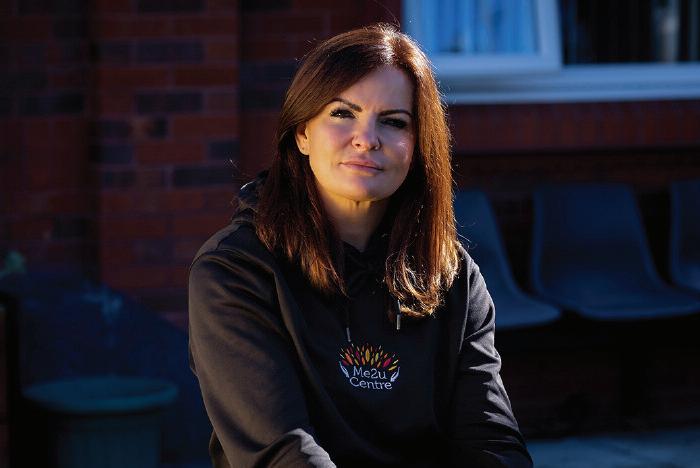
At the Me2u Centre we strive to alleviate the pressures on carers by offering a joyful home from home for their loved ones living with dementia using creativity and innovation at our daycare facility to stim-
If care workers feel undervalued and underappreciated, then this is going to have a big impact on the care they give as the job itself can be both physically and emotionally draining So if you re not rewarded both financially and spiritually, then it’s going to cause low morale, resentment and ultimately people are going to leave the industry
At the Me2u Centre we empower staff with the tools to be transparent speak their truth and to process things as a team with an opendoor policy - it’s an intimate job, which requires a personal culture
We provide mental health first aid training and the opportunity to train in yoga meditation reiki and mindfulness for our 35-strong team of volunteers apprentices university placements part-time and fulltime staff members
Every four months one staff member and a plus one is awarded a free holiday and one staff member gets a free place on a Me2U mindfulness retreat, which offers a three day escape for members of the public - such as nurses doctors lab workers school teachers - by way
Prevention is a massive part of what we do We have close links with primary schools and we re part of the health and social curriculum in local high schools to educate young people about healthy brains lifestyle choices substance mis-use and diet exposing them and carers to an alternative and a better way of living to prevent the inevitable
We invite these young people into the Me2u Centre to be dementia buddies and to be part of our intergenerational choir To watch the exchange the energy the emotion between the older and younger generations who are both so innocent in different ways is magical and so beautiful
At the Me2U Centre we follow the Green Care Farm model prioritising exposure to the outdoors fresh air eating organic healthy food and even encouraging people to grow their own produce
It s ultimately about us being proactive as well as reactive and targeting young people through education
Residents at a Powys care home joined together with a local primary school as part of a project of learning how to engage people with music
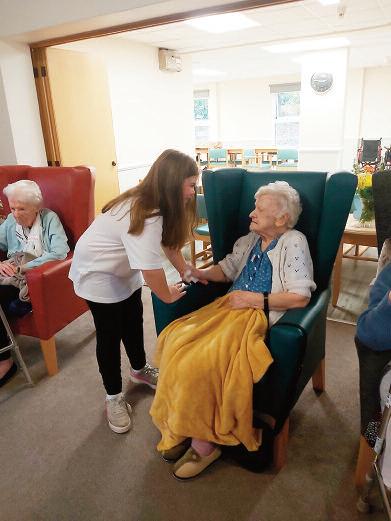
The Grove care home in Ystradgynlais welcomed children from Ysgol Gymraeg Dyffryn Y Glowyr for an intergenerational afternoon of singing and games

Intergenerational Music Making (IMM) is a national not-forprofit organisation which delivers programmes training and research to improve mental and physical wellbeing of older people and the young through the power of music
The session involved children writing down how different songs made them feel as well as the residents trying their
hand at conducting There were also games including pass the bean bag
Intergenerational partnerships can help build confidence challenge assumptions and prejudices and help tackle social isolation and loneliness for children and older people
Service manager at the Shaw healthcare-operated home Joe Jenkins commented: To see the interactions from both the residents and children was so heart-warming to watch You can see on their faces how music can really touch people’s emotions We are very much looking forward to the children visiting again ”

The
The funding is available to businesses that are looking to grow and move from the research to implementation stage Successful applicants will become part of a network made up of NHS providers the investment and academic community – with the aim of leading the adoption of new digital innovation across the NHS to drive efficiencies improve patient outcomes and support economic growth
Peter Dines Chief Operating Officer at Mercia Asset Management said:
“We have a track record of financially supporting and building life science businesses across the UK all of which provide a scalable and innovative way of streamlining services, improving patient safety and releasing the burden of cost on the NHS ”
Tammy Holmes Head of Delivery Innovation and Commercial at West Midlands Academic Health Science Network, said
The life sciences sector can provide answers to some of the biggest health and care challenges of our
•
Responding to the confirmation of new strike dates that have been announced for January, Matthew Taylor chief executive of the NHS Confederation said:
“Health leaders will breathe a sigh of relief on behalf of their staff and patients that next week’s ambulance strikes have been called off but with four days to prepare for in January they know that trouble awaits
“No health leader wants to be in this situation and the new strikes announced for January could have been avoided had the government attempted to find more common ground with the unions pay The government cannot just sit back and let these strikes happen when patient care is on the line and the unions must honour their commitment to protect life and limb
“It’s clear this is becoming critical and the worry is that NHS will be held hostage to this position of stalemate between both sides This benefits no one and the government must act and reach a compromise with trade unions now

Commenting on the impact strakes have has so far Mr Taylor said: “No NHS leader wanted to be in this situation in the first place and are very aware of the disruption that the strikes have caused already with 25,000 rescheduled procedures and much longer response times for ambulance calls The strikes haven’t caused these cancellations and delays but they are making them worse and that s why the government and
trade unions cannot afford to let this situation drift We need talks to resume and a swift solution reached
The full effects of the strikes won t be known for many days and weeks but we are now starting to see the ramifications We are seeing an increase in walk-ins’ to emergency departments and a slow-down in patients being discharged from hospital Both will serve to clog up local services and lead to greater delays over the Christmas period
“Many NHS leaders are concerned about the impact on services as we head into the holiday period Some are already more than 90% full to capacity with little or no slack for new patients that need a bed “But this isn’t just about hospitals as existing pressures combined with the knock-on impact of the strikes are piling even more pressure on community services mental health and GPs In primary care we are being told by some of our members that some patients are presenting to primary care very unwell often requiring oxygen There is a general increase in calls and demand including more requests to assess falls in care homes In many ways the extra demands on our primary care services are hidden from view but they are no less critical
It s clear that the NHS is very fragile at the moment and it doesn t take much to push it off kilter That s why we continue our plea to the Prime Minister and trade unions to resume talks in order to avert planned and future strikes Without a swift national resolution patients will continue to suffer and that can t be allowed to happen ”


The holiday season is upon us and we here at THE CARER are offering care homes the opportunity to win a LUxURy SCoTTiSH HAMpER packed with festive goodies!
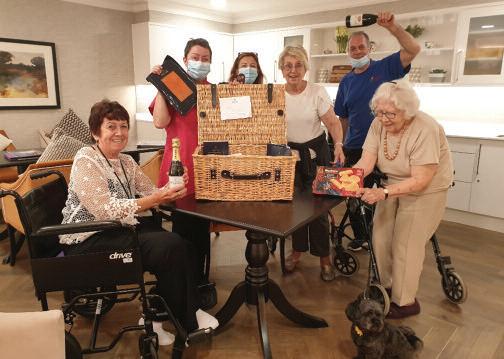
Remember Afternoon Tea Week? We do! That wonderful and quintessentially British tradition so loved in care homes This year we put up an Afternoon Tea Week” prize inviting care homes to share the celebrations with us
We were overwhelmed with the response we received we are delighted to say care homes all over the country sharing their activities menus stories and celebrations which filled 5 pages in our digital issue at www thecareruk com/carerdigital114
With the lucky winner being Hutton view care home in Brentwood
So this festive season we are running a Christmas competition and once again a delightful luxury Scottish festive hamper is waiting to be delivered to a care home who pushes out the boat to celebrate Christmas All you have to do is briefly tell us what you did at your home to celebrate Christmas menus and decorations details of any festive events you held Christmas fundraising activities or details of the homemade traditional tasty delights you create with a couple of photographs and perhaps quotes from residents and we will pick a winner!
That’s it! We will be picking a winner on Friday December 30 and hopefully will be dispatching a luxury hamper to a lucky winner the very same day! Simply email your entry to nominate@thecareruk com
basis When he is home we visit him and his family multiple times a day He is a wonderful young boy, who has had a really tough start in life so to be able to help him in this way has been very rewarding
Over the past few months we have been working with his family his clinical team and the local authority on a way that we can take over his whole care package and bring him home Once it was agreed we set to working out a plan to get Sam home for Christmas
This as anyone who works in our industry knows was not an easy task With so many stakeholders involved in Sam’s care, all of which have an important role to play in his health and wellbeing it was a methodical process but one that we were determined to bring to fruition
His five key carers from our ND Care and Support team had just eight weeks to get the correct training they needed to allow them to give Sam the care he needed once he was home They did this without question, keen to learn, keen to help and desperate to work towards our big goal which was to get Sam home for Christmas
Working with the clinical teams who were caring for Sam was great as we learnt a lot about their procedures and requirements Of course getting him home meant that we were also freeing up a hospital bed which are so desperately needed
When you work in the Care sector the word care can sometimes lose its essence and true meaning – that was brought to the fore for me recently when our team worked tirelessly to bring a very ill young boy home for Christmas
This four year old who I ve called Sam to protect his true identity has been critically ill since birth and in and out of hospital since then as he has significant health needs This year has been particularly challenging for him and most of it has been spent in one hospital setting or another
We have been working with Sam and his family since April 2021 so are well versed with his needs, both clinically and on a day-to-day care
But of course the greatest reward was getting to see Sam come home, to see him interacting with his siblings and having his family around him at Christmas MAKING
The icing on the cake was when we could take Sam to see Santa New Directions Group (our parent company) through its ‘Giving Back’ programme has been offering children in the local community near our Cardiff headquarters the chance to see Santa for free The thinking behind Santa s grotto is that during a time when the cost of living is so high, families can go somewhere warm and make memories without having to worry about the cost – and so Sam was able to take advantage of this and get some one-on-one time with Father Christmas
Seeing his face light up when he chatted to Santa was a memory I shall treasure for a long time and the words his guardian said will also ring in my ears as she told us: it is a memory I will hold in my heart forever It was so touching Nobody has ever done anything like this for my family before ” It really brought to the fore how much we do care how much working in Care is often a case of going over and above for those we look after I know many of our team do more than they are paid for several times a day – whether that be staying on to make an extra cup of tea for someone or holding a hand for ten minutes longer – which we can all lose sight of during our busy schedules with many time constraints and pressures
Sam’s story brought back to me why I first came to work in the Care sector what I love about this industry and how much the little things we do can make such a massive difference to people’s lives, not just at Christmas but every day after
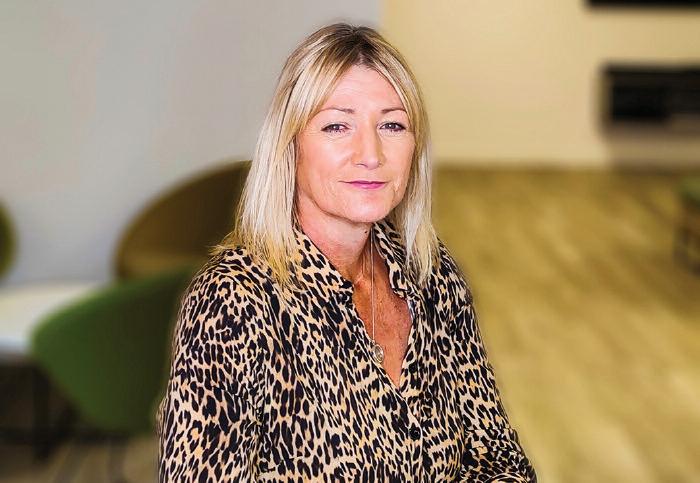


Now in its 10th year The Alzheimer s Dementia & Care Show is the UK’s leading event for care providers healthcare professionals, families and carers This is an unmissable event for those wanting to learn from leading experts, find practical advice and support resources help and information develop a better understanding of dementia and further professional skills
The show features a fully accredited CPD conference programme with talks from leading experts, family carers and people living with dementia alongside professional advice clinics, dementia and care exhibitors and unique individual training opportunities you won t find at any other event Held at The Business Design Centre London on Friday 3rd and Saturday 4th March, the doors open at 9 30am each day and close at 5 00pm on Friday and 4 00pm on Saturday One-day tickets are from £18 00 online £23 on the door
For further information and tickets visit www alzheimersshow co uk At the show - NEW for 2023
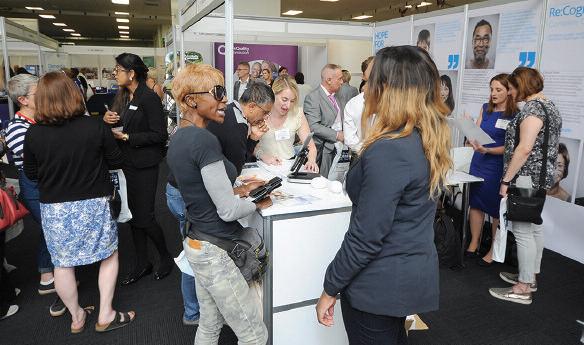
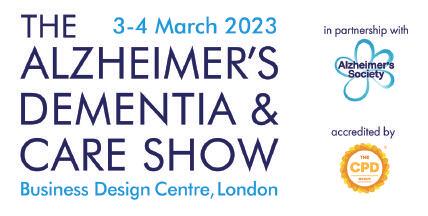
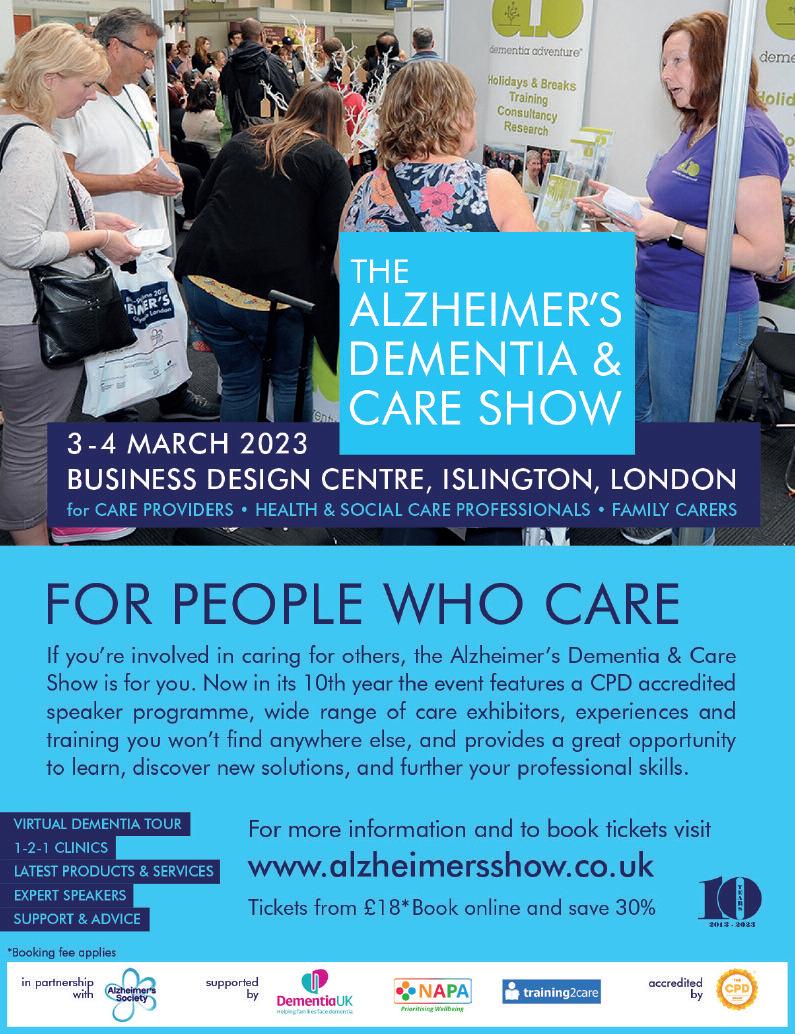
Full Dementia interpreters Course–Training2Care: Free taster sessions are offered to visitors who will have their ability to speak see hear and move impaired to begin to recognise the many forms communication may take for a person living with dementia Only at this event
Training2Care are offering individuals the full 1-hour workshop to allow you to experience the complete experiential practical session
Full Virtual Dementia Tour & Training Experience – Training2Care: As well as free taster sessions this is the only event where visitors can book the complete training as an individual – an 8 minute immersive experience followed by 75 minute de-brief – a must do’ experience for anyone involved in caring for people with dementia
Dementia and Care
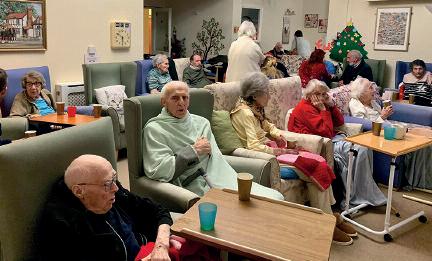
Matters Theatre: The main theatre hosts keynote speakers on range of topics as well as chaired daily
Talks Hub: A range of practical talks covering dementia and care topics from professionals and exhibitors
CpD Accreditation: Certificates available to professional attendees
Admiral Nurses & Alzheimer’s Society Advice

A CAMPAIGNER has issued a stand together and fight for social care message ahead of the New Year
Mike Padgham says social care providers must unite and demand a meeting with the Prime Minister to tackle the funding crisis and address care workers pay
He was speaking as care providers prepared to begin 2023 with 1 6m unable to get care, 165,000 staff vacancies and a 59% jump in provider failures
Mr Padgham Chair of the care provider organisation The Independent Care Group (ICG) said “We will start the new year in a desperate situation and it cannot go on any longer
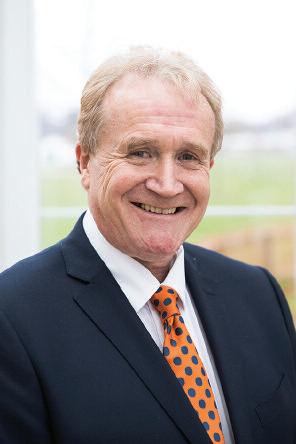
“This has to be the year when all differences are set aside and everyone –Government commissioners and care providers get together to find a solution to the crisis in social care
We are now in a winter where the number of people who can t get care is more than 1 6m where 13 000 NHS beds are occupied by people who cannot go home because of a lack of social care packages and ambulances are queuing outside where there are 165 000 staff vacancies and where residential care home insolvencies are up by 59%
“In crippling times like this, organisations retreat into their own corners and protect themselves If we are
going to solve the crisis in social care we can no longer do that we have to work together
It will only work if we have a united voice an appreciation that the social care market needs everyone –large small medium-sized providers profit-making and not-for-profit None of us can meet current and future care demand alone There has to be a mixed market and all must make a profit – or a surplus – however you term it to invest and grow their organisations
Nor can we find solutions if we are at loggerheads with the Government and with our commissioners
Social care staff deserve better pay as shown in a recent report which highlighted an £8 000 pay discrepancy between them and their NHS counterparts Some are reportedly turning to food banks to help make ends meet
The NHS and social care sector both need to be funded properly so that staff are recognised and rewarded adequately and with parity
“Confrontation and retreating to our own protected silos has not worked – it merely allows the Government to divide and conquer As a sector we must speak with a unified voice and must sit down with our commissioners, with local authorities, the NHS and the Government and thrash out sensible, practical and sustainable solutions
“Between us we have to find a way to make social care work again, to get more money to the sector and better pay and recognition to our front-line staff, giving them parity with their NHS counterparts and tackling the crippling staff shortages Then we can free up hospital beds and get people the care they need ”
Residents at a Hastings care home have been treated to a host of Christmas activities put on by the local community
Mountside Care Home organised a full schedule of festive entertainment for its residents and families courtesy of local community groups
Firstly, residents were treated to children from Blacklands Academy attending to put on a small concert of festive songs that some residents recognised and could sing along to
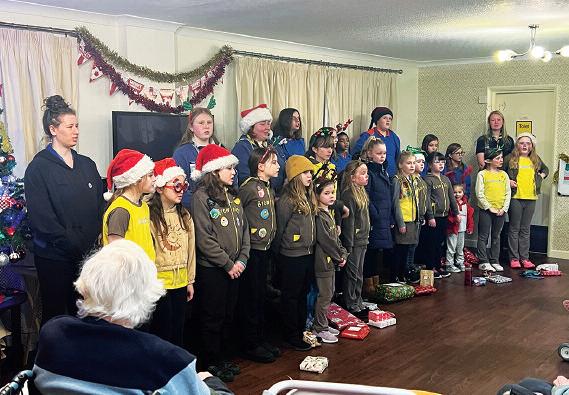
The local Rainbows Brownies and Girl Guides groups also paid a visit to the Laton Road home to sing more Christmas songs for the residents A brave four-year-old girl sang Twinkle Twinkle a duet from the Brownies sang In The Bleak Midwinter whilst the whole group joined in for a rendition of Rocking Around the Christmas Tree
With an action packed few weeks leading up to the big day one resident said: “It’s been great having so many visitors especially as I can’t get out and about to attend festive events myself so I m grateful they were willing to come to us
To help fund such activities the home has hosted a Christmas Fayre a raffle and has a collection box for donations to help raise money for its ‘Residents’ Fund’
Internal activities have also helped to get residents into the festive spirit as they offered their hand at making mince pies, decorating the home and creating Christmas cards
Shelagh Hazleton, Activities Coordinator at Mountside, said: “It’s been lovely to welcome so many of the local community into our home and to help bring the Christmas spirit to our residents We extend our thanks to all our visitors throughout the past few weeks we have thoroughly enjoyed the time you ve spent with us
“It's also been great to see the residents share some of these festive activities with their loved ones Unfortunately not all residents get to see their families on Christmas Day, so we ensure there are still plenty of opportunities to create festive memories this year
The mental health awareness campaigns days and initiatives don t seem to help many depressed stressed and burnt-out carers
Currently there s a mental health pandemic among those who care for our loved ones Long days nights and weeks seem to blend into a never-ending loop
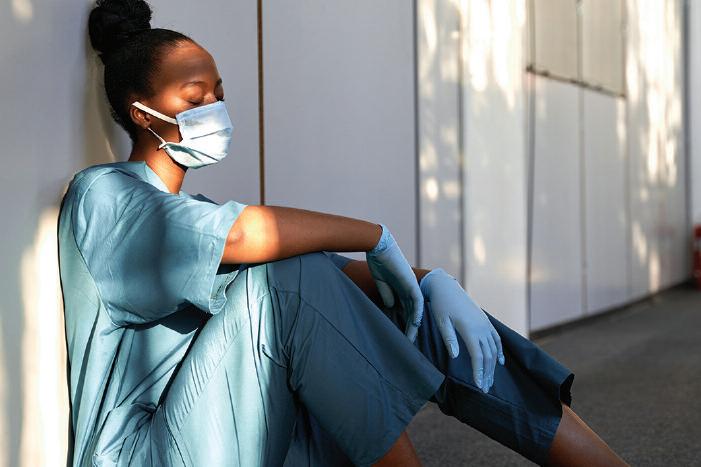
The Mental Health Foundation stated that "71% of carers have poor physical or mental health The figure may come as a shock but if you were to speak to a carer they would assume the percentage would be higher
Care agencies and care homes need to do more to look after the workforce that enables us to keep functioning Who would look after our grandparents parents siblings aunts uncles and old friends without the carers work? We couldn't continue working if they weren't there to do their job
A1 Care (www a1care co uk) claims that one of the critical reasons carers are struggling right now is due to the lack of staff within the industry For many years now and especially since the pandemic fewer individuals have chosen to become a carer
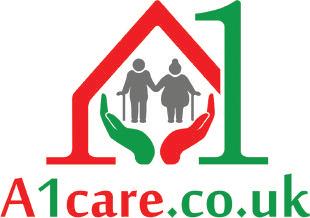
The current turnover rate in social care is approximately 31% and rising, which is more than double the UK cross-industry average of 15% 60% of those who leave their job leave care altogether In the past few years 50 000 carers have left the industry leaving over 165 000 jobsfigures released by Skills for Care
If the industry were inundated with carers they would thrive and there would be less overtime, more time off and a more manageable workload Despite the benefits of being a carer such as good pay flexibility, opportunities to build long-lasting relationships and being in a fulfilling role many are choosing a 9-5 which they can do from home So what can they do?
As most care agencies and care homes struggle to gain applications
from within the UK we suggest having a programme to hire from overseas Offer visa sponsorship and go the extra mile to attract suitable candidates by providing a relocation package
What your relocation package should include:
Support with relocation for the carers families
Paid plane ticket and airport pick up
Temporary housing until they can find a permanent residence
On-call assistance for any issues or support they may need
An introduction to the area they will be living in and a warm welcome into the community
By providing an attractive and valuable offer care agencies and care homes will be able to recruit the excellent carers they need
More carers mean a more manageable workload and more time to focus on quality
Which then will begin to tackle the current carers physical and mental wellbeing They will be able to work more reasonable hours have time for themselves and their family and most importantly rest
55% of carers
uk)
they
Care agencies and care homes need to implement these hiring measures to decrease this number and significantly save many carers from burnout
For all of the carer employers reading this there are many warning signs you can look out for among your carers Spotting these signs will lead to immediate support, as opposed to a carer being afraid to talk out and further burdened
Signs you can look for:
Being down
Less talkative and unenthusiastic
Significant tiredness
Poor concentration or mistakes in their day-to-day work
• Withdrawing from people
Constantly worried
• Frantic and stressed
Lack of confidence
We know hiring overseas is a lengthy process, so we suggest doing these 5 things to support in the meantime:
Appoint a mental health representative within the workforce
Introduce a scheme where they can talk to a wellbeing counsellor at the company's expense if needed
Offer paid mental health days where they can take the day off Remind them of their fantastic work and reassure them their workload will get easier
Encourage them to participate in wellness activities such as walking yoga and meditating
Right now carer employers need to lead the way with the change in the industry Too many have let their workers struggle
Small steps every day can lead to change
Eventually, with these turnarounds, we won't need to resort to drastic measures yet focus on the upkeep
Let's stand together to take care of our carers
games enjoy lots of conversation with residents along with plenty of tea coffee and cake We enjoy the time spent with residents and we know they look forward to our visits
AFC
three years, so it was great
South just continues to grow We go into the Care South care homes two or three times a week to play football related
Simon Bird, Chief Executive at Care South added We had a fantastic time at the stadium We had seven of our care homes come together with the senior citizen ticket holders of AFC Bournemouth and some of our Care South at Home clients who all joined in the morning of Christmas carols Our relationship with AFC Bournemouth and the Community Sports Trust is so important on so many levels Care South is all about food fun and friendship and the partnership we have with AFC Bournemouth completely embodies all those attributes which we have seen through this event alongside the additional activities that come with the partnership “It was fantastic for residents in our care to safely attend this wonderful event, especially as they all enjoy the home visits from AFC Bournemouth Community Sports Trust and the stadium
so much It was a delightful way to mark the start of the festive holidays Events with our partner AFC Bournemouth are an important part of our activities helping to keep residents engaged and active and part of the community ”
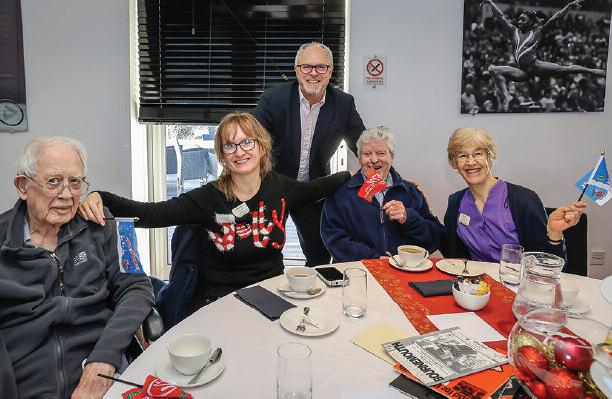
Care provider Homes Together partnered with Crimple Garden Centre to provide all 130 of their staff with their Christmas Day Lunch
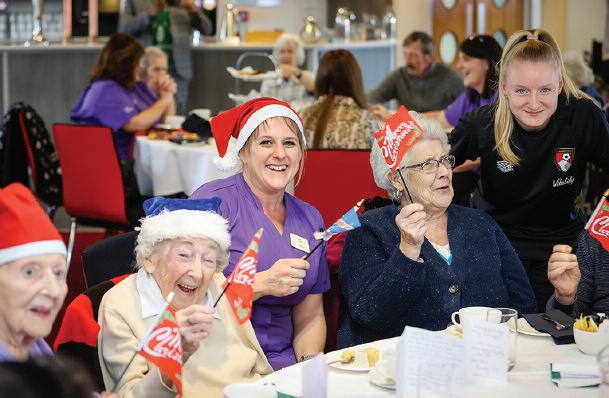
With many employees feeling the pinch this winter amidst rising energy bills and inflation Homes Together aims to help support its employees cover some of the cost of Christmas by providing them with hampers from Harrogate-based Crimple Garden Centre The hampers will include a Turkey with all of the trimmings along with a homemade fruit crumble and a custard pot Each hamper will contain enough food for four people
As well as helping to support its employees this year Homes Together will also donate Christmas Lunch hampers for all services of Harrogate Homeless Project The charity provides people experiencing homelessness with a safe place to stay and the support they need to build confidence and move towards independent living In addition to the food donations, Homes Together will be making a cash donation to Harrogate Homeless Project to further support the vital work that it provides for vulnerable people in the Harrogate area
David Ashton-Jones Managing Director of Homes Together said: “With the cost-of-living crisis affecting so many people we are very happy to be giving something back to our employees that work so tirelessly to ensure all of our service users receive the best possible care We re looking at numerous ways we can
support our employees through these difficult times and hope this is the first step in helping to ease some of the stresses that Christmas can bring
We are also conscious that there are people within our community that are unfortunately without a home this Christmas so we have extended our support to Harrogate Homeless Project by providing further hampers along with a cash donation to be able to give something back to our local community, and we’re delighted to be able to help Harrogate Homeless project with the amazing work that it does
Extraordinarily, and in true Christmas spirit, a large proportion of Homes Together employees decided to donate their own Christmas hampers that were gifted to them to Harrogate Homeless Project

Thomas Richards Fundraising Manager at Harrogate Homeless Project says:
We are overjoyed by Homes Together s donation and even more so by the generosity of their Harrogate-based employees who have kindly donated their own Christmas hampers that they have been gifted As a result we now have over thirty Christmas dinner hampers from Crimple
Harrogate Homeless Project is currently experiencing an increase in demand for our services as the most vulnerable people in our society are being impacted by the rising cost of living The support given to us from Homes Together has never been more important
With the recent announcement that made com is going into administration1 and further layoffs at Meta Group and Twitter, the worry over job loss may grow in a variety of industries
Life insurance broker Reassured has taken a closer look at different industries and ranked the most secure sectors looking at redundancy rates over the last 10 years
Looking at the past 10 years the top sector for job security is human health and social work This industry has a redundancy rate of 1 43, closely followed by education with a rate of 1 49
Public admin and law also appear to be the third most secure sector, holding a redundancy rate of 1 77 But then there is a substantial drop with job security rates sitting at 3 51 and 3 61 when it comes to professional scientific and technical roles and the agricultural fishing and utilities sector But things are looking up for the agricultural industry as
it has the least amount of redundancies compared to any other sector in 2021



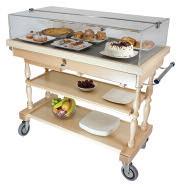
Looking at the years from 2011 to 2021 the public administration and defence sector saw the biggest decline in redundancies in fact, in 2021 the sector saw 68 2% fewer redundancies Construction saw 65% less job loss, however scientific and technical jobs (21 8%), manufacturing (20 1%) and hospitality services (19 5%) have seen the least changes over the 10-year period

The UK s best areas for job security
It would appear that Northern Ireland is the best location to seek secure employment with a redundancy total of just 7 579 Even though the Northeast experiences nearly double the number of redundancies (14 663) the region comes in second closely followed by Wales with 15,218 jobs made redundant
Scotland (26 431) and the East Midlands (28 473) are regions with fewer redundancies Considering the population in each region Northern Ireland still shows the lowest redundancy rate (2 55), closely followed by Scotland with a rate of 2 81
Wales also had one of the lowest redundancy rates (3 00) and so did Yorkshire and The Humber (3 31)
A spokesperson from Reassured commented on the research: With rising costs many companies are experiencing significantly higher outgoings, potentially resulting in changes to a company’s structure

Unfortunately this can subsequently affect the employees if job cuts are required Whilst income protection insurance cannot protect against redundancy it can cover you if you are injured or too ill to work This reassuring safety blanket could help many people in the UK ”
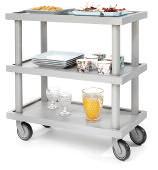

A care home in Hindhead has continued to countdown to Christmas by welcoming some very special visitors
Signature at Moorlands Lodge, which provides nursing, respite dementia and residential care to 90 residents, arranged the visit of Latte and Bubbles to visit residents relatives and their loved ones
Latte and Bubbles who are a pair of 11 and 12 year old reindeer dropped by for a spot of lunch in the gardens at Moorlands Lodge Residents and their loved ones hand-fed the reindeer their festive favourites namely sliced carrots and handfuls of their special dried moss

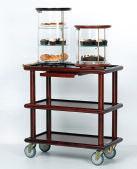
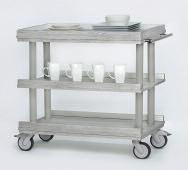

Their arrival added to the care home s Christmas Family Day which also saw it welcome members of the local community by serving up mince pies and a festive hot drink
The visit added to a series of festive activities organised in the run up to the Christmas Holidays by the care home This included birthday girl Pamela Bleach marking her 92nd birthday earlier this month by turning on the home’s Christmas lights a residents outing to RHS Garden Wisley a Carol service at St Lukes Church and several entertainers coming into the home

The County Councils Network (CCN) has released its latest County Spotlight publication which shines a light on best practice across the CCN membership on adult social care
The publication, CCN’s fifth and final Spotlight of the year, aims to showcase how the network s member councils have stepped up in what has been a challenging year in adult social care with demand continuing to soar and inflation rising to a 40year high – impacting on councils’ and care providers budgets
The network’s County Spotlight publication sets out the challenges faced by county local authorities in delivering social care but also shines a light on their innovative and transformative work carried out by its member councils including successful campaigns to recruit and retain staff, using cutting-edge technology and working with health partners to reduce demand
The report contains 16 case studies across four themes:
• Helping to ensure that those in care live independent and fulfilling lives
• Helping to attract and retain staff to create a vibrant social care workforce

Working in close collaboration with health partners to reduce pressure on the NHS
Using new technology to innovate services and improve care for those who need it
The report comes as councils brace themselves for one of their toughest winters yet in social care – with the latest data contained in the report showing the number of requests for care reaching almost two million as demand continues to rise
Local authorities in England saw 1 97m requests from people for social care services in 2021-22 – which is an average of 5 402 requests a day for each council This is a rise of 65 000 individuals compared with prepandemic levels in 2020 As we head into the winter period councils say demand shows no sign of abating
The analysis by the County Councils Network (CCN) shows 55,000 (85%) of the rise in new requests came from people living in England s county and rural areas Councils in these areas say care provision is under significant pressure heading into the winter period where services are at their most stretched
The CCN says health and social care services face a perfect storm of post-pandemic demand for care services including requests for short-term care packages and community care care providers closing down and wider pressure on the NHS
It comes as these councils await to find details of how they can spend £2 3bn of additional funding next year announced by Chancellor for care services in the Autumn Budget, with the government expected to place conditions on how councils spend some of the money to speed up hospital discharge and free up bed capacity to reduce the NHS backlog
Latest data shows that the number of beds occupied by people fit to be discharged from hospital is a quarter higher than last December – and many of these individuals will be waiting a social care package or bed in their community
With demand showing no sign of abating and with inflation still running high council leaders say they are
bracing themselves for a challenging winter This is despite the government providing extra funding for local authorities to address social care pressures and improve hospital discharges CCN say the government should ‘minimise’ the conditions placed on how councils spend this additional funding next year to allow councils to work most effectively with local NHS partners
The figures are released in a new report published today by the CCN The network s County Spotlight publication sets out the challenges faced by county local authorities in delivering social care, but also shines a light on their innovative and transformative work carried out by its member councils including successful campaigns to recruit and retain staff, using cutting-edge technology and working with health partners to reduce demand This good work has been done despite services remaining under strain and yearly rises in demand for care services which has forced councils to tighten their eligibility for services Of the 1 97m requests for care nationally last year, 1 087m requests did not result in a service being provided –some 55% of all cases The proportion not receiving a service is higher in county and rural areas – 58% of all requests
However nationally 662 615 people received short-term services – 25 910 more than in 2019-20 These include short-term care packages or reablement services Those going into residential or nursing care has declined – dropping from 33 790 in 2019-20 to 31 440 in 2021-22

Cllr Martin Tett Adult Social Care Spokesperson for the County Councils Network said:
“The Chancellor’s Autumn Statement provided vital funding for local authorities but the scale of the challenge facing the health and social care system means that were still facing one of our toughest winters yet “Figures show that demand for social care services continues to rise – with the number of requests almost totalling two million Add in a further decline of social care beds this year inflationary cost pressures and longer hospital discharge times and you have a perfect storm of pressures on the system
We will be doing all we can working in close collaboration with our health partners to ensure that pressure on local health systems are kept to a minimum and that people are not waiting too long for a care package The delay to social care reforms and the additional funding provided by the Chancellor gives us a fighting chance but there is no doubt significant challenges remain
“With new reporting requirements and grant conditions in relation to the new adult social care grant and the Better Care Fund expected we would urge the government to minimise conditions to ensure this funding can be used flexibility to meet the most acute pressures across both social care and the health service
Despite all these challenges however county local authorities have a track record in delivery and innovation when it comes to adult social care As today’s report shows there are numerous examples of best practice across the country where county authorities are working hard to improve the lives of those in care and ease workforce and wider health pressures
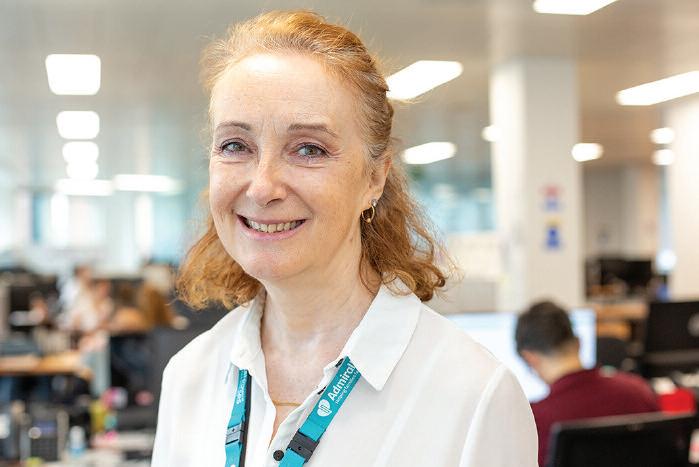
communicate is one of the greatest gifts to give them Remember that all behaviour is communication and it is our job as professional carers to TRY HARD to understand and help them If you have a question on helping someone living with dementia you can always contact Dementia UK’s Admiral Nurse Dementia Helpline on 0800 888 6678 or email helpline@dementiauk org
T Take a moment Look around, what might be wrong? What might that person want or need? Give them your time
R Reactions - is the person reacting to you, another resident, the temperature a noise or something else in the environment?
y Yearning - is the person yearning for something? Are they hungry or thirsty? Are they bored? Do they miss their family? Do they need a hug?
H How can you find out their needs and emotions?Are they sad stressed anxious fearful confused happy or in pain?
Don t: be too loud too fast or use too many words Don t argue and remember that it is not important to correct them if they believe something to be true(like they need to go home to their mum) Distraction techniques can work well Ask them to tell you about their mum, look at pictures or have a cup of tea together give a hand massage or play some music and dance with them if they are able
Some people living with dementia may have problems communicating and expressing their needs which can leave them feeling very frustrated
For anyone providing support to a person living with dementia thinking about ways to help the person communicate with you could be beneficial Are there picture cards to hand to help the person recognise a picture of what they need (for example the toilet) and point to it even if they cannot say the words? This helps them to express their needs and wants to their carer
Some people can write fluently long after their speech has gone Others may communicate through touch facial expressions or body language Taking the time to be with a person who is struggling to
A Activities and meaningful occupation - how can you engage the person in a way that gives them some sense of choice control or fun? What did they like doing when they were younger? Would they like to plant some bulbs go for a walk or visit other residents? If the person is walking, consider why -are they looking for something or someone? Maybe they have a sore bottom from sitting too long
R Repetition - restate and use their words Reassurance - take the time to calm them down and remember they might feel frightened
D Dos Don’ts and Distractions - Do: Smile be kind and get on their level Use more non-verbal communication like touch, gestures, pictures smells and show objects (like the juice box) to enhance understanding
Music can be a wonderful therapy for people living with dementia and for it to be most effective it needs to be tailored to the individual Find out as much as you can about the person through ‘Life Story Work’ which helps to ensure that our care always honours the person as an individual For example, what job did they do? Did they have children? Do they have a religion? What are their hobbies? This is often called Person-Centred Care or Person-Centred Practice Ask the person (if they can communicate) ask their family check their records and note it in the care plan so you can share it with all your colleagues
Think about how the music you like might differ from your friends your partner or your family How can it affect your mood? That will be the same for your residents Some might like jazz or classical music, whilst others might prefer music related to their religion If you find a favourite or something that calms them then make a note and use it in situations that they might find stressful If you find a tune that distresses them make a note of that too to help your colleagues to remember not to play it when they are around Music can be used passively (to listen to) or actively (for singing and dancing) – try it out, always remembering to keep it personal to the individual
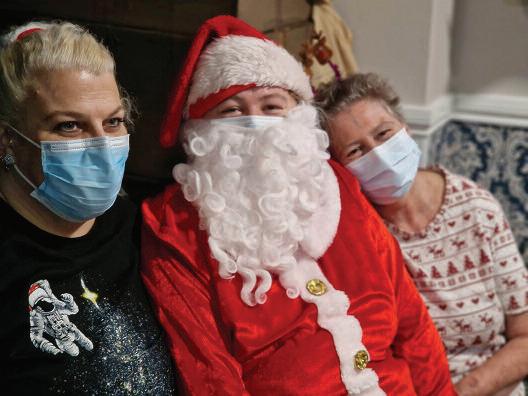

The festive season is in full swing and residents who are fondly referred to as family members, at Edenmore Nursing Home got into the festive season watching a Christmas Nativity hosted by the team members in the home
The team at Edenmore spent an evening building the nativity set from boxes and recyclables ready for all the family to enjoy With mince pies in abundance and cups of hot chocolate the family members sat and watched while the story began Team members got involved by dressed up as Mary, Joseph and the three wise men to bring their performance to life Family members
sang along to Christmas carols during the performance and loved watching the story unfold Home Manager Gayle Copper said When we asked some of the family members what show they would like the team to put on for them this year a few of them suggested a nativity So, we all got out thinking heads on The script was written by myself and all costumes were made by one of our registered nurses Teresa The Nativity made me so immensely proud and it was wonderful to see the family member’s join in with the Christmas carols, bringing them to laughter and tears of joy
A care home management software provider is seeing the year out in style – celebrating the success of its customers on the platform, having saved them time and money through streamlined processes
CoolCare is centred on admin made easy, with its services aimed at making operating care homes effortless more efficient and more profitable Its latest customer analysis has revealed results above pre-pandemic levels for many of its customers including increases above national average in weekly fees occupancy and private payer ratios In 2022 CoolCare customers achieved between 29-62% higher weekly fees compared to the national average
While customers are seeing increased business success, improvements have also been felt in major reductions both to the administrative tasks and the time taken to complete them Where care providers are using the functionality to run invoicing and fee adjustments, homes are saving an average of half a day per month on this area of admin alone
Furthermore homes are on average benefitting from an 11-hour reduction in the time to process shift requests too – a function that not only saves times but also reduces the reliance on external staffing agencies In an industry short of both staff and funding these savings are vital to care homes bottom line and
On the positive end to the year for CoolCare and its customers, Fiona Hale Managing Director said: CoolCare has been around for 30 years and we’ve learned a lot in that

about how
truly make a difference in the day-to-day running of care homes The administration requirements have increased consistently in that time so to see such positive results this year by saving so much admin time for our customers is a great end to 2022 and something we have every intention of building on in 2023 and beyond CoolCare customers using the enquiry management functions have also seen occupancy return to pre-pandemic levels as well as an average private occupancy ratio that is 5% higher than before Covid-19
seen exciting partnerships for CoolCare aimed at making the life of those working in care homes easier, from its integration with Person Centred Software providers of the country’s most widely used digital care management system to working with FlexEarn to offer earned wage access to care home staff amid the cost of living crisis While CoolCare software focuses on efficient and seamless admin its chosen partnerships create added benefits for users both within their role and in their wider lives For more information on CoolCare please visit https://coolcare co uk/
The year




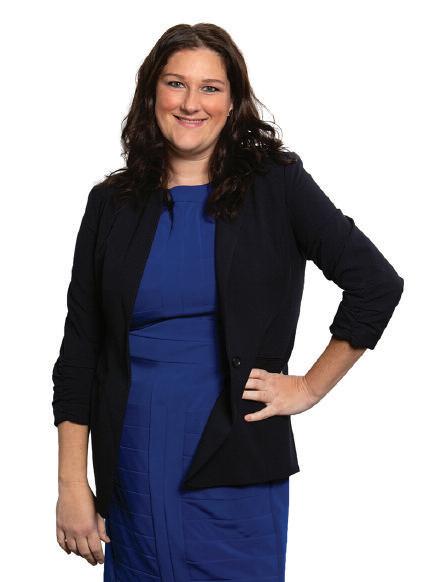
For regulated activities such as adult social care safeguarding is non-negotiable But are all care professionals aware of this? And how can they use it to embed best practice? Kate Oliver of Gateley explores the obligations of a regulated activity provider, post-pandemic
Most people associate safeguarding with protecting the health and welfare of children and young people While not incorrect this is not the full picture Any activity defined as a ‘regulated activity’ according to the Safeguarding Vulnerable Groups Act 2006 carries legal safeguarding obligations and serious ramifications for not meeting them
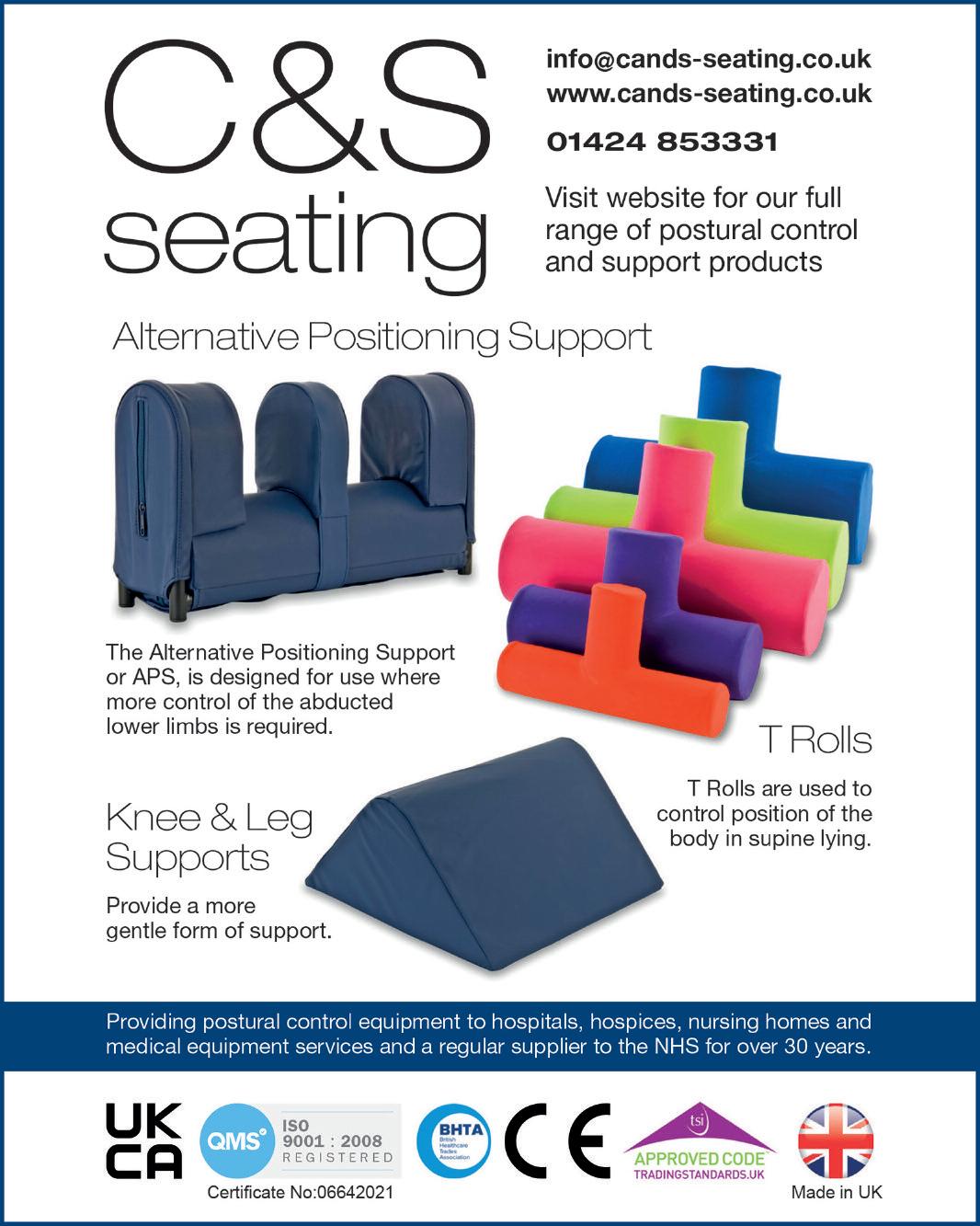
Many activities involving vulnerable adults are also defined as regulated Broadly speaking they sit within one of six categories: providing health care; providing personal care; providing social work; assistance with general household matters; assisting in the conduct of a person s own affairs; and conveying (i e transporting a person from one place to another)
Contrary to popular opinion regulated activity is not defined by the setting in which it takes place or its duration It is the nature of the activity provided to an adult that makes it regulated For example providing physical assistance with eating drinking bathing and dressing will all fall under regulated activity because the adult at that time is considered vulnerable
The complexity of this area means it is best not to make assumptions and seek advice when you can Organisations or individuals undertaking regulated activity are required to not only register their activity but also undertake a check from the Disclosure and Barring Service Failure to do so can mean fines and even prosecution
This isn’t just about red tape, though It’s about making sure the sector provides the best quality care possible – something that is becoming more important based on recent events in the sector
Even before Covid struck adult social care was in crisis High-profile inquiries and reports revealed systemic issues in multiple forms of care provision most of which were fuelled by a lack of staff under-funding, and poor leadership
More recently an undercover Panorama investigation into Edenfield Centre one of the UK s biggest mental health hospitals revealed what one expert described as a toxic culture of corruption perversion aggression hostility and a lack of boundaries
A robust approach to safeguarding exists to prevent such incidents through policies and procedures, regular staff training and a clearly defined system of reporting and accountability According to NHS England its role is to protect the health wellbeing and human rights of vulnerable people enabling them to live free from harm abuse and neglect
To be successful safeguarding needs to start at the top Leadership must understand and support the role of safeguarding within its organisation and define how this will be approached and enforced Too often, poor leadership is identified as the root of safeguarding issues An inquiry by Robert Francis KC for example traced systemic failings in patient care – including ensuring adequate nutrition and hygiene – to a management that had prioritised cost savings and status above service provision

As a minimum regulated activity providers must ensure all employees (both existing and potential) undergo a DBS check It is a criminal offence for a barred individual to undertake regulated activity but it is also an offence for employers or voluntary organisations to knowingly allow such an individual to do so Regulated activity providers must also refer individuals to the DBS if they withdraw permission from a person to engage in regulated activity whether by reason of suspected or known inappropriate conduct Safeguarding doesn t just mean sifting out individuals with relevant criminal convictions It s also about giving the best quality of life to vulnerable people while ensuring that staff or volunteers are happy and fulfilled in their jobs
While it is not all doom and gloom across the industry Covid has created additional problems in funding and staffing As a regulated activity however adult social care providers have a duty to bounce back and embed safeguarding across the organisation from the CEO to the agency staff
Gibraltar Nursing Home opened its doors this week and welcomed friends family and the community to join in festivities at their fundraising Christmas fayre and carol concert The event was hosted by Richard Dacey whose father used to live in Gibraltar until he sadly passed
away last year The home was delighted to welcome him back Team members went all out dressing up as nativity characters and setting up stalls selling homemade crafts wreaths, and baked goods

Home Lead Verity Walmsley also shared her gratitude for the raffle prizes which had kindly been donated by local businesses She was thrilled the event could go ahead “The team worked incredibly hard over many months preparing and I’m so glad we could make it happen To open the doors and hear the laughter and joy and watch as people enjoyed a mince pie and mulled wine with their loved ones was such a wonderful feeling
Altogether, they raised £618, which Verity says will go towards entertainment at Gibraltar in 2023 This is something not only the
but also their families, and we look forward to welcoming you all back for our next event ”
family members loveInsolvencies involving residential care businesses have increased 59% in the past year from 56 to 85, as they struggle to cope with mounting debt servicing costs and steep rises in energy bills says Mazars, the international audit, tax, and advisory firm
Rebecca Dacre Partner at Mazars says:
“The margins which care homes operate to have always been relatively thin Now rising costs are pushing an increasing number into insolvency
“A lot of care homes had taken on significant levels of debt on the properties they own all of which has become much more expensive to service as interest rates have risen ”
Many care providers have simply been unable to cope with surging energy and food prices increasing the basic costs of care combined with increased staffing costs in a sector where costs cannot easily be cut much further
One issue which has been frequently raised is the difficulty of discharging vulnerable patients from hospitals due to a lack of space in care homes
Rebecca Dacre adds:
The residential care sector is vital to looking after the most vulnerable people in our society It s deeply concerning to see care homes closing their doors in a sector which already has a massive shortage of provision and which has seen occupancy levels return post pandemic

More insolvencies in this sector are said to be leading to additional stress on the National Health Service as patients who could otherwise be discharged to care homes remain in hospital beds
Care businesses are expected to be hit hard by rising energy costs Soaring energy prices are predicted to cost the care sector an additional £2bn per year which will place more care homes into financial jeopardy
Many care businesses also have large mortgages on their properties The recent interest rate rises will be creating further costs on any floating rate debts they have secured against their properties It will also prove increasingly difficult for care homes to be able to refinance their debt at an affordable rate

Residential care businesses are also struggling with a worsening labour shortage, exacerbated by Brexit reducing the supply of care workers Vacancies in the care sector have surged 52% in the past year * with care businesses struggling to hire and retain staff This is pushing care homes to hire healthcare professionals from more expensive agencies
Research by Knight Frank shows care homes with lower care ratings are less profitable than highly-rated ones One major reason for this is that care homes rated as inadequate are not permitted to take on any new local authority-funded residents, leading to lower occupancy levels
“Things have been tough for a lot of people so seeing them come in numbers to support the cause was surprising but amazing at the same time
“Family members and volunteers got stuck in and supported the rest of us which was very nice of them
“Some of them took charge of the stalls and it was a great community event and one that put a smile on a lot of people’s faces
The residents had a lot of fun everyone was in good spirits and it s just what you want from a Christmas fair
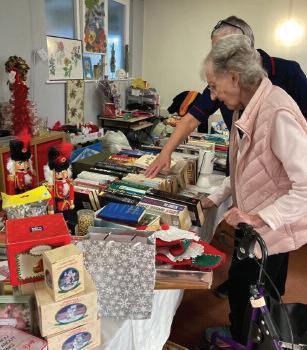
The home offers 36 places for residential care and will use the funds towards the homes amenity fund, used for trips and activities for the residents June Mansell community coordinator said “Seeing the steady flow of people throughout the day was lovely to see
To reach the amount we did in only four hours is a great testament to the support shown to the home by family members, staff and volunteers
We will make sure the funds allocated will go towards whatever it is the residents want to do and I am looking forward to seeing how we use the funds ”
We have a common saying in Chinese culture: Bad things that happen in the family stay in the family In our community a diagnosis of dementia is often swept under the carpet due to shame
Having grown up in Hong Kong and in a Chinese family I m all too familiar with this attitude
Five years ago I started noticing changes in my grandma s behaviour She would buy the same shopping items repeatedly and the kitchen would be bursting with crockery and utensils We figured her forgetfulness was just a natural part of getting older
It wasn t until she was admitted to hospital with hyperglycaemia (high blood sugar) that we got the full picture of what she had been going through
Grandma had been overeating all hours of the day and throughout the night She was confused and forgetful because she was experiencing trouble with her memory We weren t aware of just how much she was struggling, and it was probably because she didn’t want the family to worry about her She was diagnosed with dementia and this was just the beginning of her journey
Little did I know that I would end up supporting families living with dementia in Hong Kong at a community health centre I’ve brought this experience to the UK to work as a Clinics Admiral Nurse at charity Dementia UK I m delivering a first-of-its-kind Clinics service for families with dementia from the London Chinese communities in partnership with the Chinese Welfare Trust
As I can speak Cantonese and Mandarin fluently, I communicate with families from this community and provide tailored clinical advice and emotional support

It is estimated that there are more than 25 000 people currently living with dementia from Black Asian and minority ethnic groups which includes the Chinese community in England and Wales 1 This is expected to exceed 172 000 people by 2051
Research suggests people from ethnic minorities, including those from the Chinese community often face delays in getting a dementia diagnosis and barriers to accessing services 1
In Chinese culture there is a real stigma surrounding dementia It is
quite common for a family member to receive a diagnosis of dementia or suspect a diagnosis, and to keep it a secret from the family In some cases the family may hide it from others due to the shame surrounding the condition
The traditional term to describe a person with dementia translates as silly or dumb in Mandarin and Cantonese In many Chinese-speaking societies, the term has been replaced with a more neutral word to remove this stigma and adopt a kinder approach but there is more progress to be made Dementia UK’s Admiral Nurse Clinics Service along with the Chinese Welfare Trust has adopted this modern term to empower families from the community
It is even more common for symptoms of dementia including forgetfulness to be considered a normal part of aging which means some people never get a formal diagnosis Many families in the community do not receive vital information about dementia including information on signs and symptoms, and diagnostic and post-diagnostic services 2 This is largely due to difficulties in navigating health services as a result of language barriers, lack of information, and access problems
According to research findings there is a strong sentiment in the Chinese community around both needing and wanting professional medical support but being reluctant to seek it if it comes at the cost of being diminished as a person 3 This is either through shame in the family or through the navigation of the health and social care system
Death is considered a taboo subject in Chinese culture and is not spoken about openly This can cause huge challenges when it comes to arranging end-of-life care Following a diagnosis of dementia it is vital that the person can discuss and organise care plans while they still have the capacity and cognitive abilities to make decisions regarding their future
Moreover, in our culture, younger members of the family are often expected to look after their elderly relatives This dynamic can place additional stress and burden on young carers and cause friction in families around caring responsibilities It is not uncommon for families in the Chinese community to look to health and social care professionals to mediate these conversations around care As an Admiral Nurse working with the whole family to manage complex needs is central to my day-to-day work
My role as a Clinics Admiral Nurse has spurred me to share my knowledge of Chinese cultural practices, beliefs and values with colleagues so that we continue to work towards tackling existing inequalities in dementia care
This is even more important as dementia is a huge and growing
health crisis; the estimated number of people living with the condition in the UK is 944,000 This number is set to increase to 1 1m by 2030 Almost all of us will know someone affected whether it s a family member or a friend But there simply aren’t enough Admiral Nurses to reach every family that needs support With gaps in health and social care services barriers that the Chinese community face to accessing support, and the stigma around dementia, it is vital that we begin to educate and raise awareness among health and social care professionals, so they can begin to address these issues
Information about dementia and the services available need to be easily accessible and translated into different languages so that we reach these families and break down the stigma which leads to isolation Delivering personalised care is also critical Getting to know not only the person with dementia, but their whole family can enable healthcare professionals to better understand cultural attitudes and how they intertwine with care needs This might involve broaching conversations around end-of-life care with sensitivity or providing a space for families to share concerns around caring responsibilities and expectations For now Admiral Nurses like me with the support of Dementia UK are uniquely placed to provide life-changing guidance and inspire change within the dementia care system
My grandma remains at the forefront of my mind every day No person or family should have to face a diagnosis of dementia alone; we should walk through the change together and tackle the stigma around dementia in the Chinese community so that all families get the support they need
Dementia UK’s Admiral Nurse Clinics service in partnership with the Chinese Welfare Trust is available to families residing in registered with a GP or who are a member of one of the Chinese Welfare Trust s local community partners in the London boroughs of Barnet, Brent, Camden Tower Hamlets and Westminster To find out if you meet the referral criteria for the Chinese Welfare Trust Admiral Nurse clinic, please call 020 3870 9350 or email CWTANclinic@dementiauk org
To find out more about becoming an Admiral Nurse speak to the team at Dementia UK by emailing admiralnurserecruitment@dementiauk org or for more information visit https://www dementiauk org/forprofessionals/admiral-nurse-careers/ References
Ron Day a
World War II veteran enjoyed a double celebration as he marked his 100th birthday on Christmas Day at the Vale View Heights Care Home in Sidmouth, East Devon
Amidst the Christmas festivities Ron s family threw a special party in honour of him reaching his century They decorated the private bistro area at Vale View Heights and invited family, friends and staff at the home to join in the celebrations The birthday card Ron received from King Charles III and The Queen Consort was in pride of place
Ron was born on 25 December 1922 in Taunton Somerset Only 17 when the Second World War broke out, Ron joined the RAF and

entering active service Initially stationed
anti-shipping strikes along the
just three per cent expected to survive two tours[1]
On 11 April 1945 Ron was in a flight of 35 Mosquito bombers targeting shipping routes off the south-east coast of Norway when he was shot down He and his pilot, Sqn Ldr Phil Davenport, miraculously survived and were taken prisoner by the Germans and kept under armed guard in hospital in Oslo until the end of the war
After VE Day Ron married Clarice Griffin who he had met during the war, and had two daughters, Jane and Sally The family lived in Taunton and Ron worked for an agricultural equipment firm serving the South West
Commenting on reaching his 100th birthday Ron said: “I m sure the secret to a long life is happiness I was blessed with a wonderful marriage of 70 years, had two fantastic daughters and good health What more can you ask for?
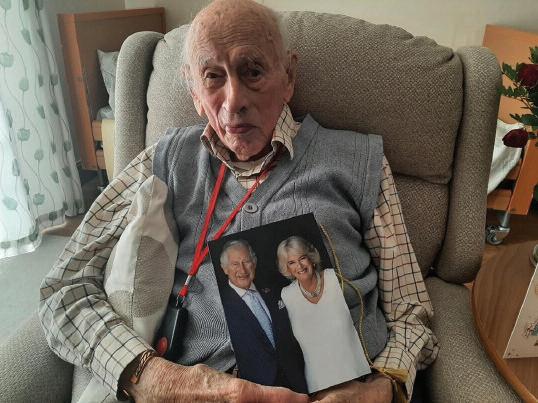
“I’ve had a really lovely day and the staff at Vale View have gone out of their way to help me celebrate my century
Paul Courtney care home manager Vale View Heights said “It has been a privilege for us to join Ron in marking this incredible milestone He has led a fascinating life as part of the unique generation that fought so bravely and successfully for our country in World War II
Residents at Brampton Manor Care Home in Newmarket
The generous donation by the family of a previous resident who are also members of the Newmarket Rotary Club have delighted residents and team a-like by their realism and unrivalled cuteness
Newmarket Rotary had earlier in the year held a fundraising gala dinner to raise money and awareness of the therapy cats and their benefits for those living with dementia and as a thank you to Brampton Manor have generously donated two cats to the home
Newmarket Rotary were able to raise £7,000 00 through their fundraising efforts and will be distributing the Therapy Cats to local charities and organisations around the Newmarket area

People living with dementia can become agitated anxious and frustrated Research has shown that an effective drug free way to soothe and ease a person living with dementia is to support them with a therapy pet they can interact with
The dementia robotic cat is sold by an American company, and it has shown to provide comfort for people living with dementia They purr, meow and move just like a real pet cat It also responds to touch when its petted and hugged These robotic cats supply the same known benefits of having a pet In some cases the cat can provoke nurturing and caring memories helping with loneliness and isolation
Zoe Kirk home manager said It was a pleasure to support the Rotary Club in their fundraising for these therapy cats, as a sensory tool they are ideal for the ladies and gentlemen at Brampton Manor who are living with Dementia, and I am very grateful for the generous donation”
People living with dementia are facing a ‘perfect storm of rising care and living costs that will leave many stranded in their own homes over Christmas warns Alzheimer s Society
The charity reports that amongst those struggling with cost of living pressures, nearly one in seven is cutting down on vital social activities, and one in ten is cutting down or stopping
While the cost of living crisis impacts almost everyone, people with dementia face additional pressures as many have to pay for their own care unlike those with other conditions that are treated by the NHS
A new Alzheimer’s Society survey of 1 166 people affected dementia from across the UK reveals that fees have risen on average £1 200 a year for residential care, home care and day care, and that people with dementia spend a lot of time at home an average of 22 hours a day In a bid to reduce costs, one in four who are struggling with the rising cost of living are retreating into one room to save on energy bills leaving them at risk of devastating isolation which could see their condition worsen
‘The rising cost of living has left people with dementia facing a perfect storm of rising care costs leading many to reduce their crucial care services and social activities while also struggling to heat their homes
‘For people with dementia cold and isolation can have a devastating impact on their condition leaving them at real risk of crisis this winter
Christmas for most of us is a time of joy and togetherness but for far too many people living with dementia it will be desperately lonely this year with many isolated in their own homes
No-one should have to choose between heating their home or getting the care they need, but as people with dementia face rising care costs almost one in seven are choosing to reduce or even stop vital social activities and one in ten have reduced or stopped using social care
One in four people who are struggling with the rising cost of living are retreating into one room to save on energy bills
We were disappointed that Government has delayed the care cap for two years which would have set an £86,000 limit on what people contribute to their own care This was a first step towards tackling crippling care costs, at a time when people with dementia are facing even bigger bills
We appreciate the additional investment for social care announced recently by the Chancellor but as we approach the difficult winter ahead we need a long-term solution to fix our broken care system and deliver the quality, affordable care people with dementia deserve ’

The findings also reveal many people with dementia will spend most of their time indoors over the festive season, meaning they will need to use more heating and lighting to stay safe and well
More than half (53%) of those surveyed who live in their own home said they either don t leave home at all or go out for less than an hour a
45% of people living with dementia who live alone said they never go out
Spiralling care fees are also forcing many to cut back on other essentials Living fees have risen by an average of £23 20 per week (£1 206 40 a year) for people with dementia in sheltered housing supported living, a residential care home or nursing home, with more than one in ten (12%) facing a weekly rise of more than £40 (more than £2 000 a year)
Meanwhile fees for support services such as private home care services support groups and day care for people with dementia have increased by an average of £22 91 per week (£1,191 32 a year) with one in seven (13%) facing a weekly rise of more than £40
The survey also revealed:
Two in five households with someone living with dementia said they have struggled to pay at least one bill in the last month
• One in four say they have struggled to pay their utility bills
One in five have struggled to pay for food and drink
• Dementia is one of the main causes of disability later in life, ahead of cancer cardiovascular disease and stroke
Two-thirds of care costs are currently being paid by people with dementia and their families either in unpaid care or in paying for private social care This is because unlike the NHS social care of which people with dementia are the biggest users is means-tested

I feel that Christmas is a time when we come out of our shells a bit and instinctively want to reach out and help people
“If you can enjoy yourself at the same time then that is a bonus!
Richard
Pam
The
So
Speaking
“The
the lives of the residents
I wasn t going to join in with this lot but Pam twisted my arm I have dressed up as one or two things before we used to have themed parties
In my 17 years as maintenance man at Weston and Queensway I have been superman a hippy scrooge and I have dressed up in full black tie and tails before too “The wife will be a bit surprised when she sees me, she’ll probably wonder how I got talked into it!“I feel like you have got to have a bit of a laugh now and then and anyway some might say the green moustache is an improvement!
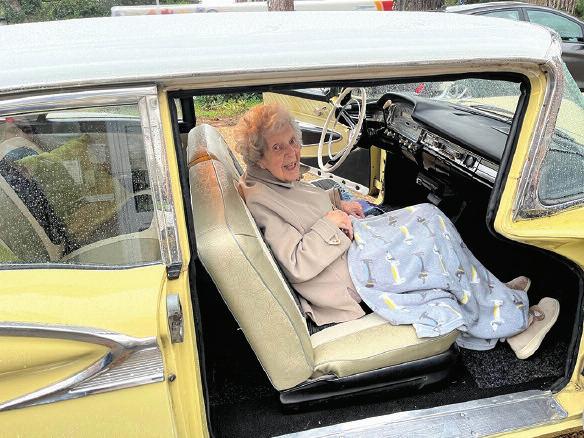
A resident at a Hastings home was rightly spoiled as she celebrated her 106th birthday
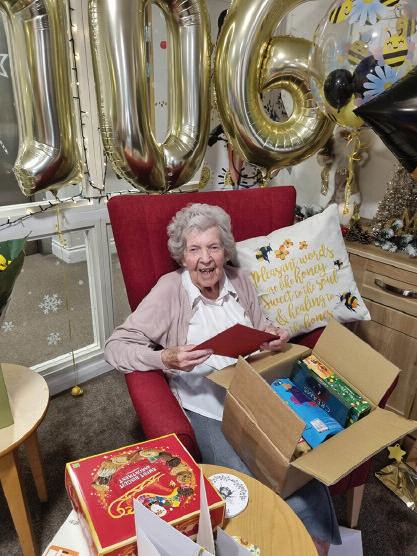
Marjorie Bartlett lives at MHA Lauriston and was treated to a day full of surprises for her 106th birthday
The home organised an amazing bee themed birthday party for her due to her fascination for bees and there was also time for
She credits her decisions to keeping bees and having a spoonful of honey on a daily basis her secret to a long life
Marjorie spent the day with her nieces and nephews who came to visit her and received plenty of gifts and cards
Maddy Painter admin manager said: The day started with getting Marjorie ready which included her getting her hair done for the big day
She absolutely adores bees so the day was themed around bees including the birthday cake which was yellow and black
We set up her presents and cards in the lounge ready for her and she was greeted with a round of applause from residents
There was plenty of singing for her and the family were blown away by the arrangements
After visiting Rye she was ready to go again but we had to carry on with the rest of the day including opening her presents
She is a real joy in the home she is still very active and plays the piano and is such a lovely person to have in the home
She has the energy of a 20-year-old and is already planning what she wants for her next birthday!
Care home residents across Surrey have welcomed members of their local communities as their homes were illuminated with Christmas lights decorations and played host to a range of festivities

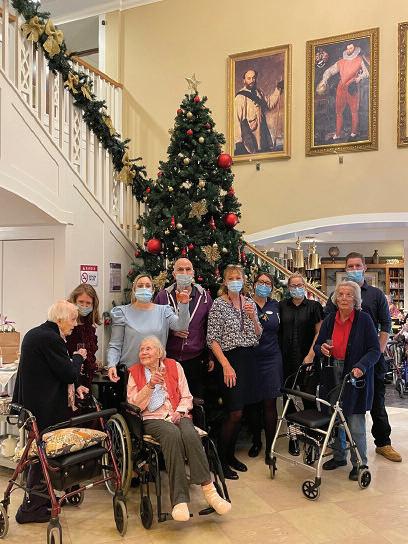
Thursday 1st December marked a unique occasion where Christmas lights were switched on concurrently at 13 of
Signature s care homes in Surrey with each home marking their celebrations in their own distinctive manner
Not one, but two Mayors were on hand to mark Signature at Banstead and Signature at Guildford s Christmas celebrations
Cllr Frank Kelly, Mayor of Reigate and Banstead, officiated Banstead s switch on While Cllr Dennis Booth Mayor of Guildford served as the care home’s guest of honour and was on hand to turn the care home’s Christmas lights on
Signature at Camberley s celebrations saw them welcome Bramshill Beaver Group who helped residents by decorating Christmas crackers Signature
the sound of Christmas carols with mulled wine flowing and a tasty selection of homemade minced pies
Commenting on the celebrations at Signature at Moorlands Lodge, birthday girl Pamela Bleach, said: “It was lovely to celebrate my birthday and to bring in at Christmas at Moorlands at the same time! Seeing everybody in such good spirits made the day particularly special ”
Celebrations at all 36 Signature care homes across London and the south east proved particularly poignant as it marked the first anniversary of the operator s new enlarged family of care homes
It came following the integration of 20 former Sunrise and Gracewell care homes into the newly formed Signature Senior Lifestyle brand in December 2021
Commenting on Signature Senior Lifestyle’s first anniversary Kay Cox Chief Operating Officer at Signature Senior Lifestyle said:
“Just as families and loved ones come together over the Christmas period we felt it was a wonderful opportunity for our family of care homes to unite at Christmas
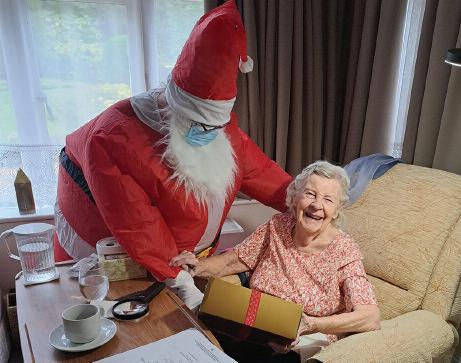
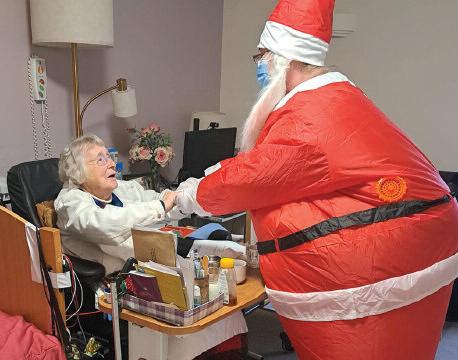

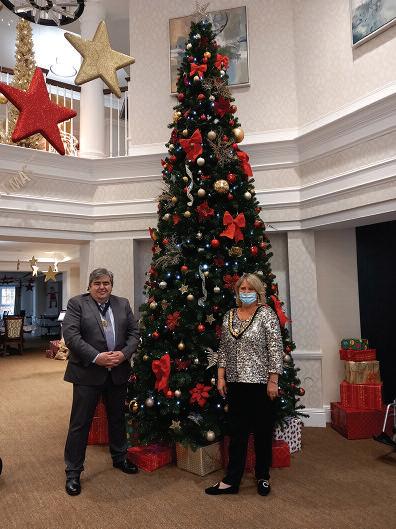
“Over the last 12 months we have welcomed wonderful new residents and talented team members to our homes Whilst each home has its own community, we have a shared bond that spreads across more than 2,000 residents and 3 500 colleagues
“The light switch on is also an important opportunity to reflect on cherished residents whom we have sadly lost throughout the year and to pay a special tribute to them ”
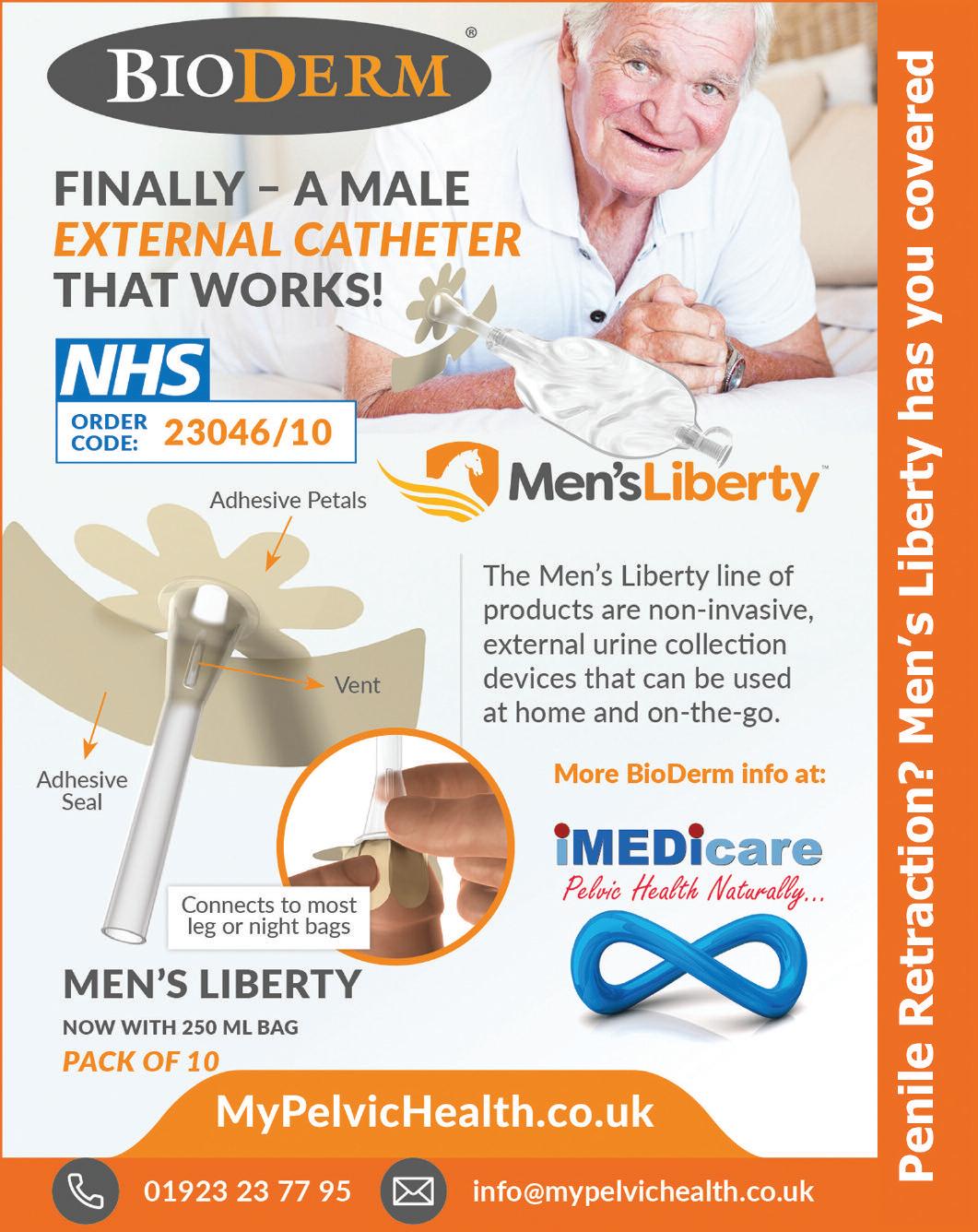

Care England has welcomed the announcement from the Department for Business Energy and Industrial Strategy that many of those who draw on care or support will receive a £400 discount on their fuel bills through the Energy Bills Support Scheme Additional Fund or £200 for those using alternative fuels
Professor Martin Green Chief Executive of Care England says: We are grateful to have received this support measure from Government, at a time when the care sector is balancing a multitude of financial pressures whilst maintaining high-quality care and support Care England has worked closely with Government to ensure this level of support was actualised The payment will be paid directly to residents and we now await the details of how this funding will be operationalised to ensure it reaches the individual or organisation incurring the increased energy cost We will continue to work closely with our members to ensure it becomes a tangible benefit to those who incur the increased cost ”
The Department for Business Energy and Industrial Strategy announced details for how people in England, Scotland and Wales without a direct relationship to a domestic energy supplier, including care home residents and others in care facilities/sheltered accommodation will receive a £400 discount through the Energy Bills Support Scheme Alternative Funding (EBSS AF) Care England has questioned the definition of wholly or partly self-funded to ensure those entitled to funding receive it and has asked for clarity on how this payment is to be passed on to the entity paying the increased cost of energy Online applications will open in January for England Scotland and Wales who are eligible for the £400

EBSS Alternative Funding to submit their details Payments that meet the eligibility criteria – including people who get their energy through a commercial contract will be made by Local Authorities in Great Britain This is likely to include care home residents
The Government is also providing a further £200 Alternative Fuel Payment (AFP) to help those households in Great Britain who use alternative fuels such as biomass or heating oil to meet energy costs this winter Those eligible for the AFP support in Great Britain will receive payment automatically via their electricity supplier in February with no need to take any action Those who need to apply for the AFP, for example, because they do not have a relationship with an electricity supplier will be able to do so in February through the same GOV UK portal as the one that will be used to apply for support under the EBSS Alternative Funding scheme

Martin Green continues: “The Government support for the care sector on energy has been welcome and this represents another measure to ensure that the profound effect the energy landscape has had on our sector is minimised We are however saddened to learn that any further support measures will not be announced until January 2023 contrary to the previously envisaged December 2022 announcement The energy crisis has been immense for adult social care, where the disproportionate impact of energy price rises is threatening the existence of care providers nationwide As of today there is one short-term energy deal on the table so this delay only hampers care providers efforts to take advance of the current Energy Bill Relief Scheme which is due to end in March 2023 ”
The
Chef Sean Carty prepared the festive feasts which were served up by The Hall management team The entertainment was Michael Buble tribute singer Lee Hutton with karaoke and background music from DJ Lynne of AvA Entertainment supported by her husband Terry The seasonal atmosphere was completed with a flurry of snow as the
community shared stories and reunited after two years apart Diane Hagen, manager at The Hall, said: “It’s wonderful that we were able to revive this magical tradition, with friends from Thornton-Le-Dale joining us to celebrate Christmas over a meal and a raised glass or two!
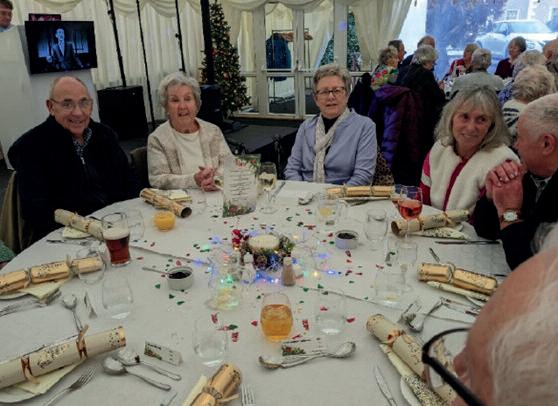
It was lovely to catch up with people we ve not seen in a long time These lunches are a social gathering at a time when it can be lonely for those on their own Previously we’ve had singletons meet and become couples, so there’s even romance in the air!
“As an organisation that provides care to the elderly we believe it is important to give opportunities to spend time with others in the community especially at Christmas

“We’re delighted that we’re now back in a position to be together again and we’re already looking forward to next year ”


Whilst there are many diagnostics available to a test laboratory –dependent upon the level of analyses required and the type of sample being processed we will focus on the traditional microbiological methodologies for processing water samples and the associated benefits and limitations of these tests

With this in mind new (rapid) diagnostic technologies will also be highlighted and the associated benefits of using such tech
Traditional microbiology typically refers to the process of using selective agar to determine the presence of bacteria in a given sample Therefore, agar may be defined as a combination of nutrients required for a particular organism to grow
That said, some microorganisms (such as Legionella) are considered fastidious (fussy growers) even when attempted to be cultured on Legionella-selective agar – buffered charcoal yeast extract (BCYE) with cysteine thus giving them the best chance to grow This is a problem as other microorganisms (such as Pseudomonas aeruginosa) which are less fussy growers may inhibit the growth of Legionella, which therefore means that additional provisions are required to encourage the growth of the ‘target organism’, which is the one you want to grow!
Such provisions require the use of glycine vancomycin polymixin & cyclohexamide (GVPC) agar as these ‘selective agents inhibit the growth of non-target organisms thus assisting with the growth of Legionella bacteria (in accordance with ISO 11731) ISO 11731 references the use of the x3 plate method for the detection and enumeration (counting) of Legionella bacteria (this x3 plate method ensures the best chance of recovering this fastidious pathogen from water samples)
The x3 plate method requires samples to be; directly plated onto selective agar, which are either untreated, treated with heat or treated with acid These additional (heat and acid) treatments further inhibit the growth of non-target organisms thus helping to ensure a more accurate final result For this reason it s important that the test laboratory of
By Roy Sullivan / Authorising Engineer [Water], Water Hygiene Centre Ltd (www waterhygienecentre com)
choice are able to process such samples in accordance with this methodology
Once samples have been plated they are placed in an incubator at 36 +/- 2°C and checked 3 times with the final plate reading being on the 10th day of incubation Therefore from the day the water sample is processed by the test laboratory, it may take up to x2 weeks to receive a confirmed Legionella result this time taken to report highlights the main limitation with this test method
You can now appreciate why it takes time for the laboratory to report your final results!
As we have a duty of care to ensure that individuals are protected from such waterborne pathogens this has given rise to new technologies which aim to deliver faster results than those obtained through traditional methods That said many new technologies have been centred on using a molecular process known as polymerase chain reaction (PCR) and whilst it’s unequivocal that these diagnostics may provide results in a fraction of the time taken by traditional tests they re still not without limitations
The additional benefits of using rapid diagnostics - that utilise PCR for example are that these diagnostics often have a ‘negative predic-
tive value’ (NPV) of 100% which means that this test will correctly identify a negative test result 100% of the time
Therefore due to the high sensitivity of this test method there is no chance of receiving a false negative test result This however can be considered a ‘double edged sword’ as whilst it’s very appealing to be using a test that will always report a negative result correctly PCRbased methods are traditionally poor at discriminating between living and dead bacterial cells so whilst the NPV may be 100% the chance of reporting false positive results may be quite high from previously affected water systems and especially from systems that have been recently disinfected - following chemical thermal disinfection etc
Some PCR-based tech utilise pre-filtration stages which aim to mitigate this by only capturing viable cells that will be used in the molecular stage of the test but there are still concerns about whether PCR actually reports viable but non-culturable bacterial cells or whether the tech is still reporting a combination of living and dead cells due to its historical limitations with discriminating between the two!
The other issue with utilising PCR-based technology is that test results are reported in genomic units (GU) rather than colony forming units (CFU) (as detailed in HSG274 part 2) Therefore as the action limits for organisms like Legionella are reported in CFU/L then one must question the relevance of counting GU/L (known as quantitative PCR or qPCR) in the absence of logarithmic data that converts one unit of measure to another
In summary whilst PCR-based technology undoubtedly has its limitations at present the speed and sensitivity of test results generated (in respect of selecting for pathogens like Legionella) should not be ignored and whilst qPCR may also have limited value at present PCR can still be used as a useful screening tool on previously unaffected systems – where detecting the presence of an organism is good enough and where many samples require processing quickly
Following such screening, traditional test methods (plating and colony counting) may then be used to complete confirmatory works –where samples have tested positive for the target organism! Therefore, using a combination of PCR-based methods and traditional testing may form the ‘blueprint’ for the best way forward with regards to microbiological test work
The
The
areas
On this occasion Joanne Balmer was named the inaugural winner of the newly introduced ESG Champion award, honouring an individual who has demonstrated exemplary commitment to deliver positive change on environmental, social and governance issues in the sector
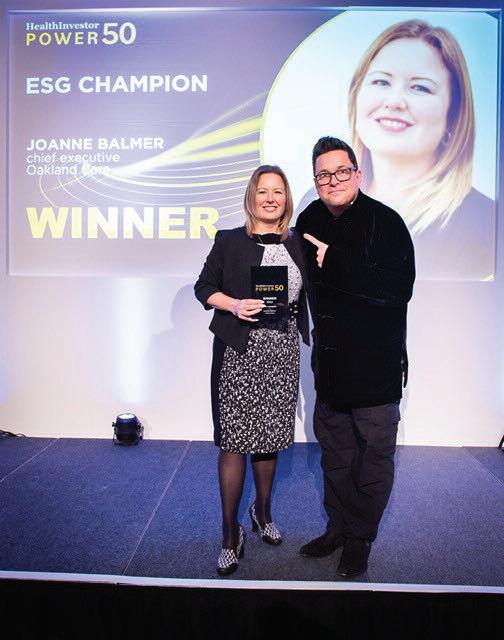
Since joining the luxury care home provider in August 2019 Joanne has successfully navigated the provider through the COVID-19 pandemic overseen the opening of new care homes and helped pioneer Oakland Care’s sustainability agenda She received a British Empire Medal in the 2021 Queen s Birthday Honours List for her services to social care during COVID-19
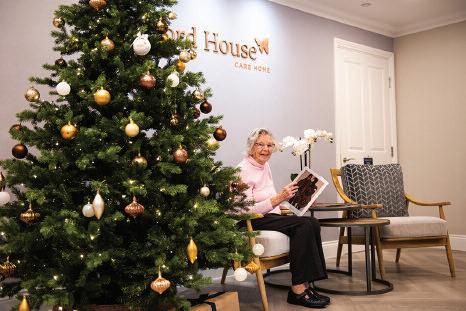
For Joanne and Oakland Care 2022 has proven to be yet another success Under her leadership, Oakland Care were named as a ‘Top Employer’ – the only social care provider on the list This achievement was testament to the provider’s excellent policies and practices to support the wellbeing of its people in addition to the fantastic career and development opportunities on offer
Meanwhile
Reflecting on her award, Joanne Balmer BEM said
I am extremely honoured to receive this award which represents not only a huge personal success but is also a testament to the industry-leading efforts of all those I work alongside at Oakland Care
As I reflect on my journey I am proud we have shown what is possible for care homes across the country Whether that be for the people who work in social care residents we support or even the real contribution we can make towards wider global issues At Oakland Care we are committed to pushing the boundaries of what is possible on environmental social and governance issues and I look forward to maintaining Oakland Care’s position as an influential leader on these topics ”
ices the experience of the workforce and providers ability to comply with the legal requirements placed on them

“Low fee rates from councils and the NHS lead directly to homecare workers receiving poor pay and terms and conditions of employment It’s hardly surprising there is a shortage of homecare workers as fuel prices remain high and many are struggling to pay their household bills
It
hour) a wage equivalent to NHS Band 3 with 2+ years experience (£11 85 per hour) the London Living Wage (£11 95 per hour) and a competitive labour market wage rate (£13 64 per hour) of between £26 79 and £31 55 per hour Many providers are already paying above the national minimum wage some as high as £15-17 per hour, but this is only possible with hourly fee rates to match Homecare Association’s CEO Dr Jane Townson said:
Too many local authorities and the NHS continue to commission homecare at fee rates far below the true cost of delivering care Persistently underestimating providers costs risks diminishing the availability of serv-
Without adequate investment in homecare by central and local government providers will be unable to maintain and grow the workforce to meet rising demand Over half a million older and disabled people are already sitting on council waiting lists, unable to access the support and care they need At least 13,500 people are stuck in hospital ready for discharge, of which 1 in 4 are waiting for homecare Delays in discharging people back home are contributing to lengthening ambulance response times and waiting lists for NHS treatment of over 7 million which affects all who need medical help
Whilst the significant investment in social care made in the Autumn Statement was welcome it falls short of what is needed to develop strong sustainable homecare services fit to meet current and future needs “We call on the government to recognise the value of homecare and the vital role it plays in enabling people to live well at home With adequate funds for home-based and community support we could help to extend healthy life expectancy reduce inequalities take pressure off the NHS and reduce costs for the health and care system
Eve Belle care home in Wickford, operated by Sanders Senior Living, were honoured to present care home resident Gwen with a framed badge for her dedication to the Wickford s Brownie Guides over the years and to celebrate 100 years since the service began The celebration was attended by family, friends, and members of the Wickford Brownie Guides to mark the special occasion
During Gwen s time as a Brownie she walked 30 miles to fundraise towards providing a brownie’s mum with a motorised car Gwen has also dedicated much of her life to the Brownies and led the 1st Runwell

Brownie pack
Arrianne Concepcion Home Manager for Eve Belle said: We were delighted to invite the Wickford District Brownies into Eve Belle to celebrate and commemorate such a special occasion – 100 years of girl guiding in Wickford is such a wonderful achievement, and we’re so proud of Gwen for being part of this movement To celebrate with the Brownies Gwen s family and our community of residents in the home was really special; a huge thank you to all who attended ”
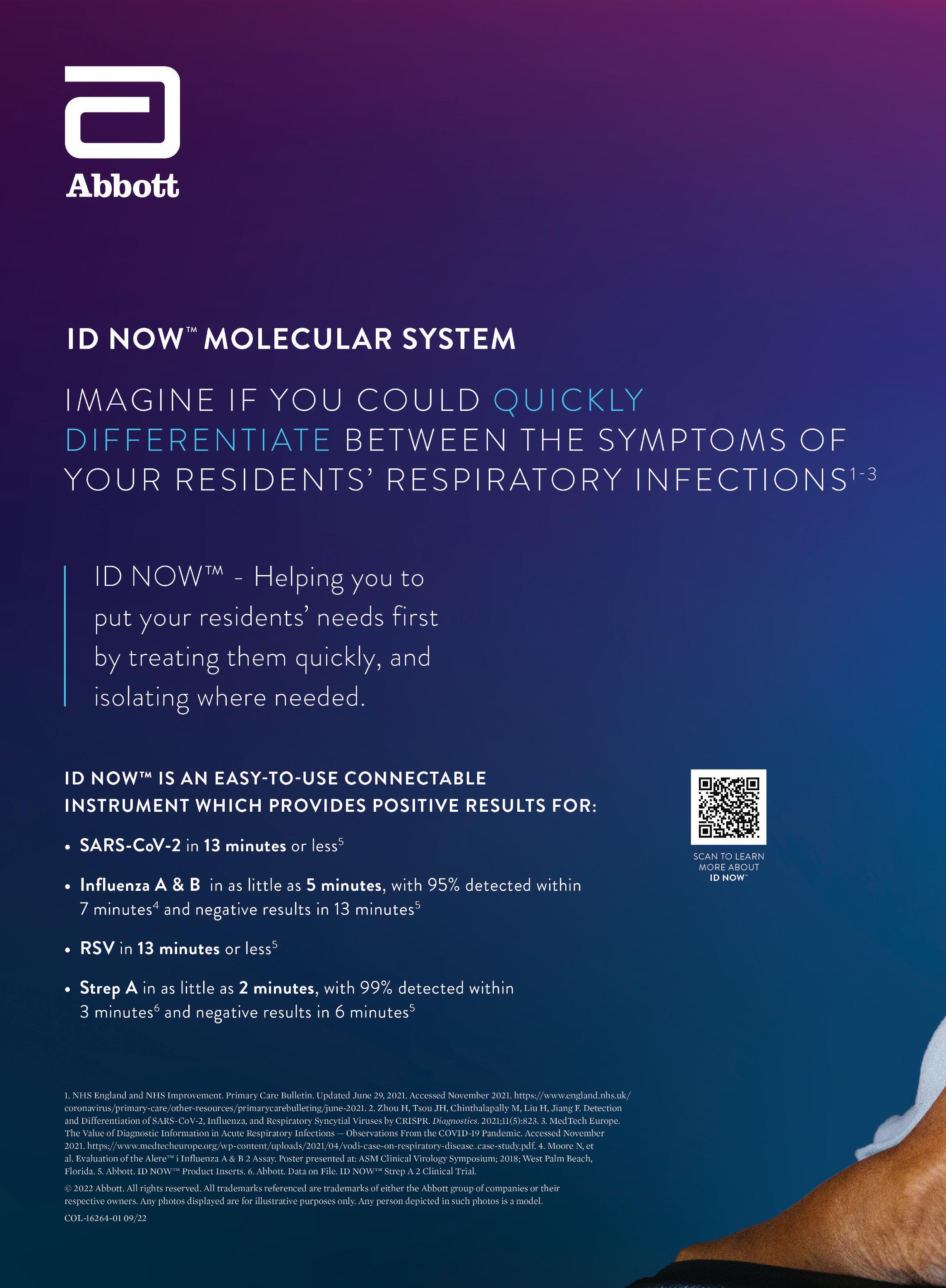
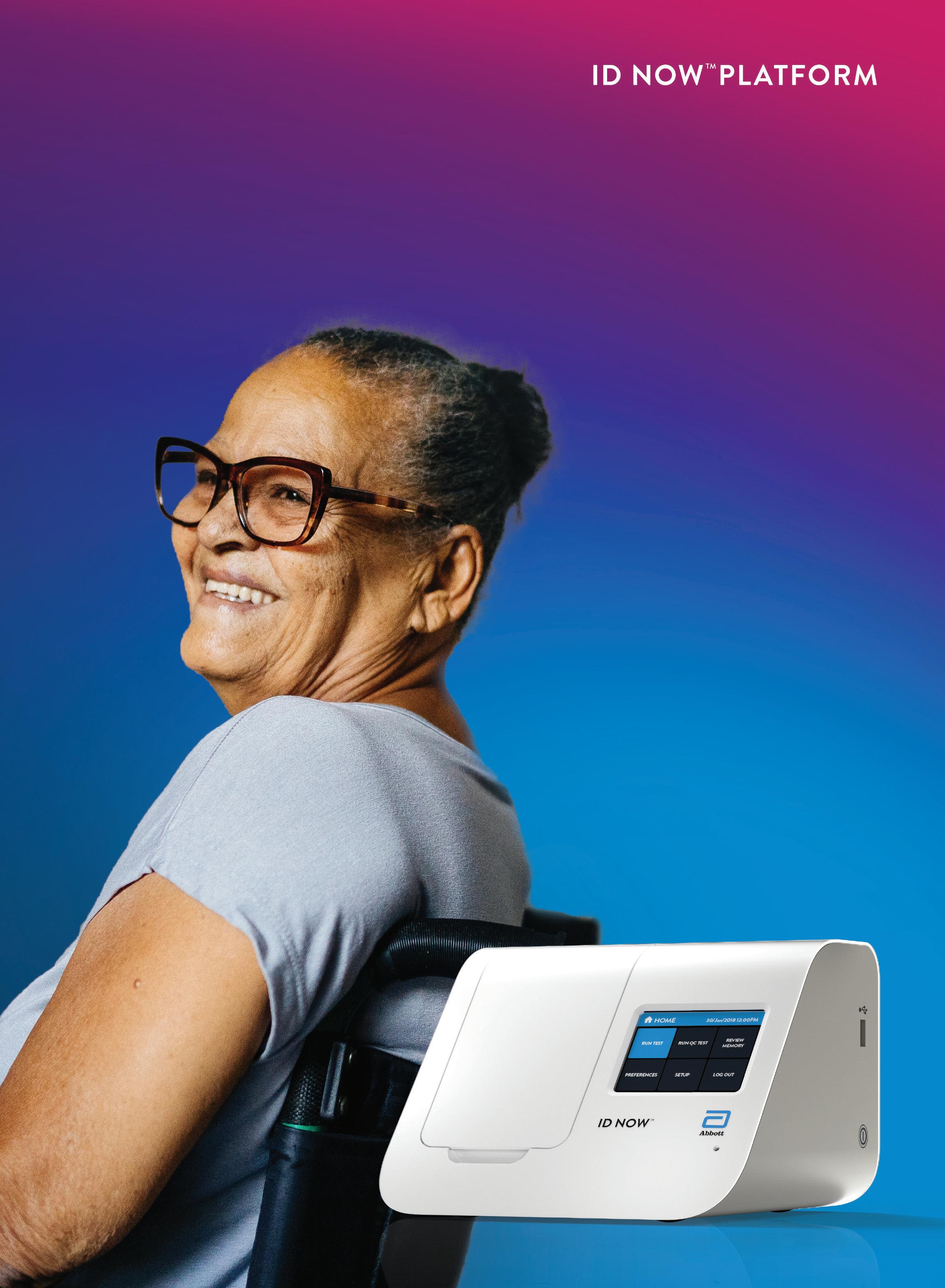
Also returning after a successful debut in 2021, the Cleaning & Support Services Association will once again host the CSSA Innovation Showcase The dedicated pavilion is designed to highlight and celebrate the industry’s most innovative cleaning products services and initiatives Among the big trends anticipated to take the spotlight the theme of sustainability will return to help operators minimise their impact on the planet Cobotics and the evolution of robotic technology to support the cleaning process and tackle the ongoing resources challenge will also play a key role alongside healthy buildings where the Internet of Things (IoT)

Alongside
of speakers and topics will be announced in the coming weeks
GOJO experts in skin health and surface hygiene were recently exhibiting at the 14th annual Infection Prevention Society (IPS) conference, where healthcare professionals were invited to join GOJO THE INVENTORS OF PURELL - and the hand sanitiser category itself on stand 37!
The team of GOJO Healthcare Support Managers offered support and advice on their total solution approach to infection prevention in healthcare facilities highlighting the company s ability to help hygiene standards across all areas and situations within hospitals and healthcare facilities
GOJO showcased its role as a specialist partner in healthcare hygiene by focussing on three areas with specific need:
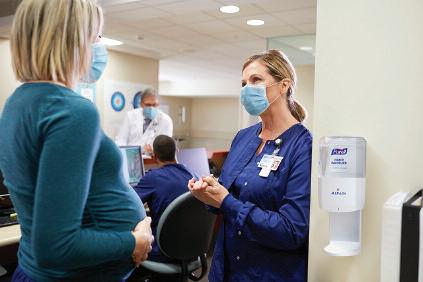
• SURGICAL WARDS
Meeting key hygiene norms is of the utmost importance in these environments but the harsh products used to do so can really take their toll on hands In contrast, using
PURELL Advanced Hygienic Hand Rub offers a gentler way to meet EN 12791 standard
•
GOJO provides a straight ‘out of the box’ solution for hand hygiene incorporating dispensers products accessories and signage as well as training and on-boarding support It also manages installations thereby reduc-

ing the staffing impact of changing suppliers
• COMMUNITY & SOCIAL SERVICES:
These environments often have radically different needs from what are traditionally catered for in healthcare packages GOJO takes these specificities into consideration and offers specially adapted products – for example locked dispenser units and foam sanitiser, so they can only be opened by trained personnel in demanding environments
Its train the trainer programme allows all staff to be trained on product use whatever shift they work Personal formats can also be supplied so healthcare professionals always have products on hand when they are needed – even if their work is off-site
Chris Wakefield Managing Director UK & Ireland, GOJO Industries-Europe Ltd comments: ‘We know the key to increasing hand
hygiene compliance is to ensure that the right products are available in the right places at the right time We are constantly innovating to keep people and places healthy This means formulating products that are not only effective at killing germs but that won t irritate hands that must be repeatedly cleaned throughout a shift
‘Ensuring that the products are available when and where they are needed – be that personal bottles of hygienic hand rub or dispensers positioned in optimal locations And last but not least, developing solutions with the environment in mind
For example from 2023 we plan to move to RPT refills; all collapsible refills will be made from recycled materials, as well as being recyclable
Widely used in the NHS PURELL® is a trusted brand in healthcare facilities around the world Our solutions encompass fastactive effective formulas that care for skin state of the art dispensers and specialist support such as the Royal College of Nursing (RCN) accredited training making us the ideal healthcare partner
For a tailored effective total solution for your setting or for more information on the benefits of partnering with GOJO please call +44 (0)1908 588444 email
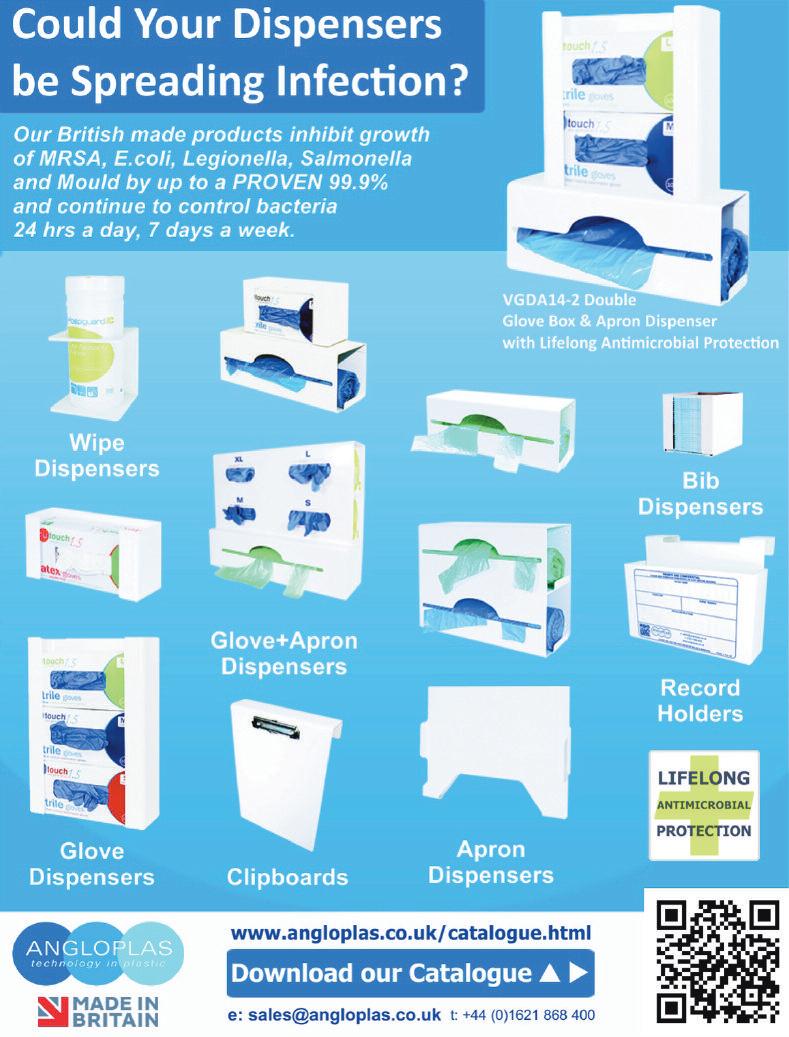


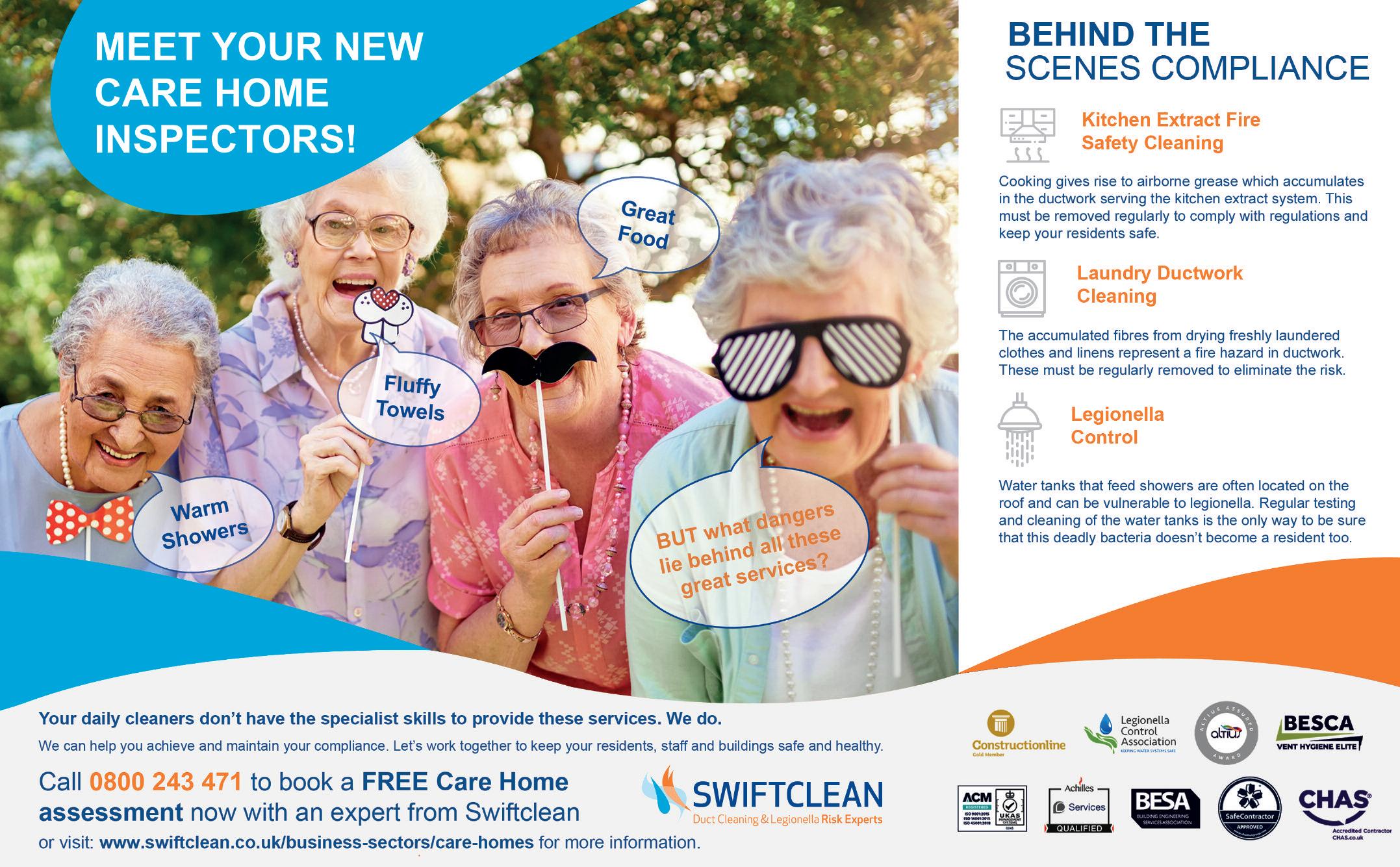
known as BESA This means that after we ve completed your TR19® Grease compliant clean we can provide certification to demonstrate that you have done everything required of you to protect the users of your premises
There
In the event of a fire, certification will help to demonstrate that you have not been negligent If there should be a fire, and particularly if residents are harmed or negligence is proved, the Responsible Person can face legal proceedings and even if convicted a custodial sentence If you cannot demonstrate TR19 Grease® compliance your buildings insurance provider may also refuse to pay out following a fire
And don t worry about disturbing your residents
ll work with you to establish a time frame to perform your TR19® Grease clean when your kitchen is not being used and your residents are safe elsewhere
As we enter into winter, we know people seek warmth through the enjoyment of hot beverages with tea remaining the most popular pick on the list of wintertime beverages 1
At Tetley we’re here here to support your staff and residents to feel cosy with a comforting cuppa As the UK s No 1 tea brand in the foodservice industry 2 we are dedicated to going beyond simply providing delicious tea solutions we aim to support all our customers with useful tools, tips and resources to help with your day-today operations

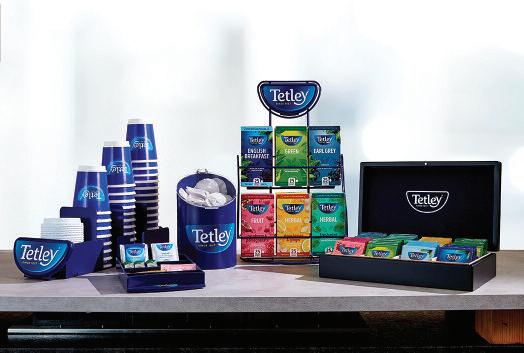
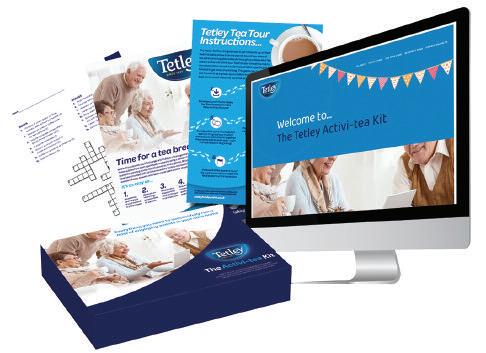
Current research shows that 20% of care home residents are dehydrated,3 and this is becoming a leading cause of hospitalisation Therefore, understand just how important it is to keep residents healthy and hydrated while also making the experience enjoyable and the challenge this can face for care providers Did
know? Tea counts towards your daily water intake 4 and so aids with rehydration! Offering resi-
We’ve been serving quality cuppas to the Nation for the past 185 years
Operating globally we source buy and blend the finest tea leaves so you can promise residents perfection with every sip We are also environmentally conscious and committed to operating our business in a way that supports the
At It’s Made For You, we believe that everyone should look forward to tasty safe and nutritious texture modified meals The It s Made For You range is designed for the International Dysphagia Diet Standardisation Initiative (IDDSI) framework standards and includes valuable nutrition It s Made For You are proud to be Gold Sponsors of IDDSI Our range of meals have been developed to ensure the nutritional content will meet the nutritional needs
Research has shown that


The autumn and winter months are a busy time for anyone in the care sector and it is important that all residents have a chance to enjoy warming nutritious food at every mealtime
Mary Wedge Business Development Manager at Anglia Crown comments: “In our experience many of the residents look forward to the desserts They often represent familiar comfort foods and, even if they cannot face the main course will often go straight for the pudding

Anglia Crown offer a wide range of hot and cold desserts that are ideal for a well-balanced nutritional diet including choices that do not contain gluten Our Crown Choice and Advantage ranges include some fifty-eight dishes, including our new, autumnal warming Ginger Chocolate Chip Sponge and delicious comforting custard that goes with almost any hot dessert

Our Crown Choice cold dessert includes the perennial favourites such as Chocolate Cake whilst our Crown Advantage range also offer reduced sugar desserts All individual Crown Advantage desserts come in packs of eighteen whilst the Crown Choice desserts come in packs of 3 and 6 allowing accurate portioning and cutting down on any potential waste
Many of the Anglia Crown dishes can be teamed up with fresh fruit allow-
ing for additional choice Items such as our Carrot Cake or Vanilla Cheesecake can be accompanied by whipped cream garnished with seasonal fresh fruit
Our hot desserts are high in energy our hot portions of 170kcal and above provide energy and protein dense options and when served with custard provide over 250 kcal per serving Our cold desserts of 250 kcal and above also meet the energy guidelines in the British Dietetic Association (BDA) Nutrition and Hydration Digest (2017) requirements VEGAN SUITABLE CHOICES
At Anglia Crown we pride ourselves with the array of vegetarian and gluten free dishes that we offer including an impressive range of desserts This was recognised with us being named at the Vegetarian Wholesaler of the Year 2022 at the VfL Awards for Excellence in Veg n Care Catering
All the Anglia Crown hot desserts are suitable for vegetarians Most of the Anglia Crown vegan products have been registered with the Vegan Society, including some thirteen of the dessert dishes ”



Anglia Crown are here to help take the strain out of your menus throughout the year Visit www angliacrown co uk for further details

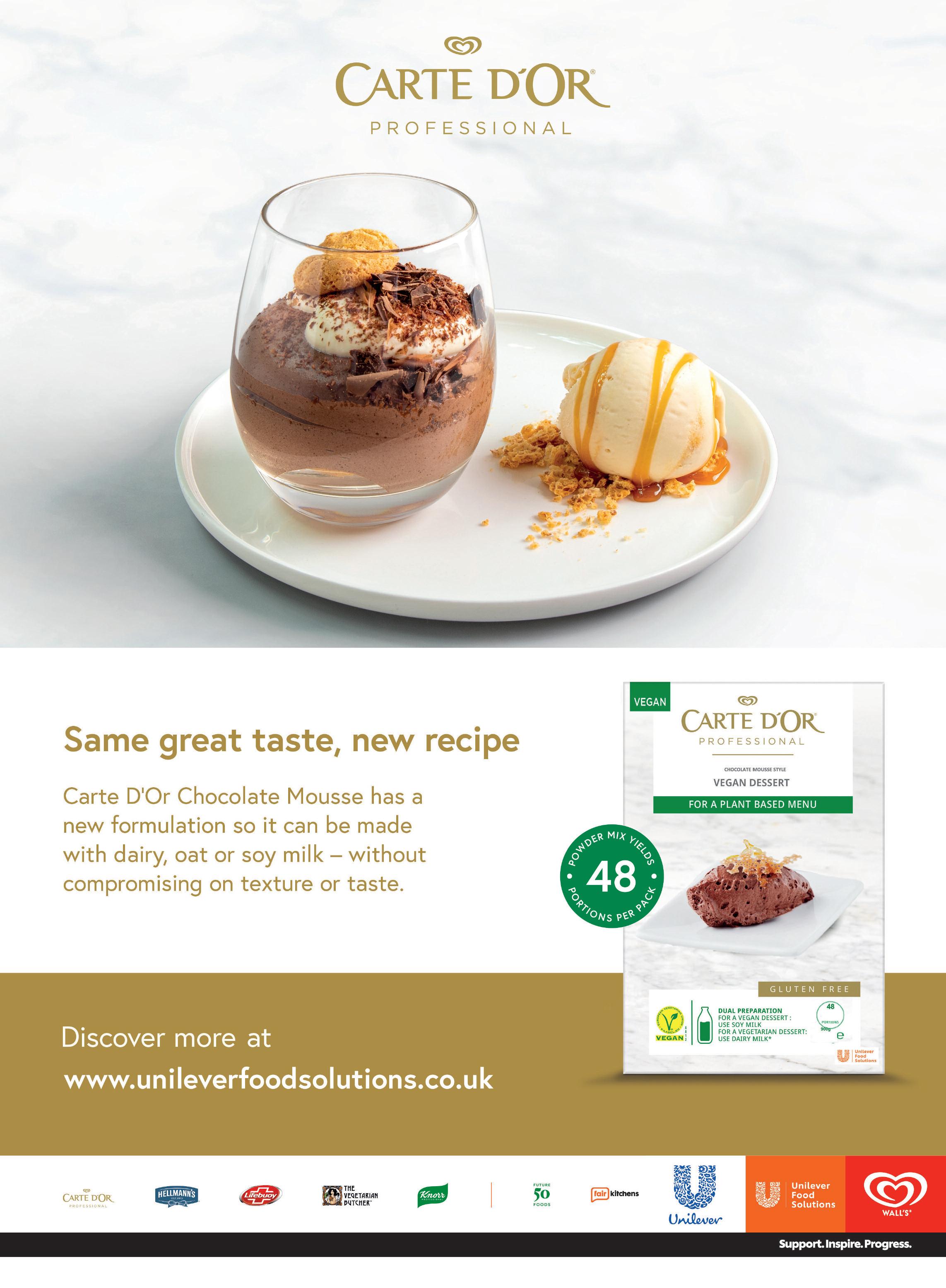
bination of natural ingredients including ethanol menthol eucalyptus peppermint and MSM Reported benefits of BIOFROST® Relief include lasting pain relief, improved joint movements comfort during sleep fewer cramps calmed nerve pain reduced joint and muscle discomfort and faster post-activity recoveries

BIOFROST® Cold Therapy Gels are natural drugfree topical cold therapy gels for muscular and joint pain chronic arthritic pain, post-activity muscle tension general aches and overuse disorders Easy to use and fast acting, BIOFROST® Cold Therapy Gels relieve pain reduce inflammation and swelling without drugs and drug-related side-effects
BIOFROST® Gels: BIOFROST® Relief Cold Gel for pain relieving cold therapy

• BIOFROST®
BIOFROST®
Care facilities typically exhibit significant but varied hot water and heating usage patterns which contributes to the current 40% tally of UK greenhouse gas emissions generated by the built environment
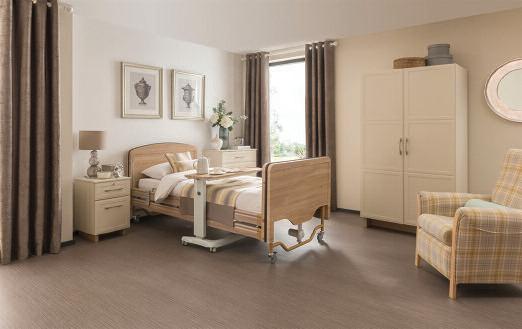
To help achieve climate-neutral building stock by 2050 the industry is being challenged to reduce operational energy use over all other measures By increasing the use of renewable energy supply and prioritising on-site renewable energy sources the hope it to reduce both carbon and bills
Sustainability comes with a cost Whether in the form of new build projects or and far more likely the refurbishment of existing yet ageing facilities understanding the necessary capital investment operational savings and payback periods is going to be key Addressing the efficiency of domestic hot water (DHW) systems - whether through the implementa-

BIOFROST® Active is a dual-action fast-acting cold gel with heat sensation for effective relief of muscular and joint pain Containing 10 natural herbal extracts (i e Arnica Burdock Roman Chamomile Garlic Watercress Ivy White Nettle Pine Rosemary Menthol) BIOFROST® Active relieves chronic pain releases muscular tension loosens stiff joints and effectively treats back pain Benefits of BIOFROST® Active include easier joint movements, effective pain relief in treated areas discomfort-free sleep fewer cramps and reduced post-activity muscular and joint fatigue
BIOFROST® Cold Therapy Gels are usable standalone or alongside other pain relieving therapies (i e medication, physiotherapy, etc ) BIOFROST® Cold Therapy Gels are suitable for people of any age including elderly and disabled people living independently or in nursing care
BIOFROST® Cold Therapy Gels are Class 1 Medical Devices made in Finland Win Health Medical Ltd: T: 01835 864864866 / E: biofrost@win-health com W: www win-health com See the advert on page 5
Fire Doors are an imperative part of fire safety and are considerations of the design and maintenance of any building but especially residential Article 17 –RRFSO states fire safety provisions (includes fire doors) must be maintained in a suitable condition order
If you are the Responsible Person it s imperative you appoint a competent person to assist in meeting your duties under the fire safety order to ensure fire safety measures including fire doors are kept in working order
Yeoman Shield’s Fire Door Services can help to take the guess work out of fire door maintenance by providing fire door inspections condition reports remedial work and fire door installation all carried out by FDIS and/or FIRAS accredited team members
Having a good maintenance routine will dispel some needs of fire door replacement therefore being more cost effective
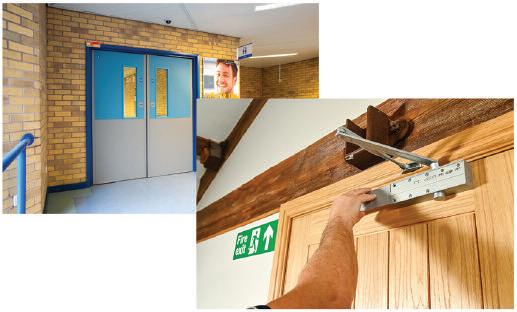
ation of Yeoman Shield Fire ction products can also be in the long term financially beneficial by halting impact damage from the start eliminating many repairs in the future and again will extend door lifecycles
Installing Yeoman Shield door protection products such as door protection panels door edge protectors and PVCu glazing bead units will not affect the integrity of the fire door as all products have been tested in situ to the current standard required
Vulnerable frames and architraves can also be protected from impact with Yeoman Shield to prevent dangerous splintering and splitting as well as abolishing the time-consuming, repetitive need for repainting
For a complete repair and protect service contact the team today frdp@yeomanshield com or visit www yeomanshield com or see the advert page 10
tion of heat pumps solar thermal direct electric water heating or even simple modernisation of existing gas appliances - helps care facilities meet sustainability goals in a practical and cost-effective manner It also delivers improved year-round conditions for staff and clients in care providing access to spaces better suited to delivering medical care and assisted living
For buildings already on gas and that rely on large amounts of DHW - a large proportion of current UK care and nursing home properties - solar preheat is the preferable option For new build properties the expectation is for specification to default to a mixture of heat pumps and direct electric afterheat New system approaches including prefabricated packaged plant rooms also provide for better use of the spaces that already exist without the need to undertake expensive and disruptive building projects This is especially valid as demands for beds continue to increase placing new demands on care facilities
Adveco can help achieve emission reduction targets With more than 50 years of specialised expertise in designing, supplying, and servicing hot water systems to the nursing and care industry, Adveco is the single resource you need for independent expert technical guidance on choosing and developing bespoke sustainable applications today to get you on the right path towards net zero operation
Visit https://adveco co/sectors/healthcare/ or see the advert on page 15
Whether
As


Facing unprecedented energy costs and an increasingly pressing climate crisis care home operators are all aiming to minimise energy consumption According to the Carbon Trust the care sector spends over £400 million on energy each year and after heating and lighting it is irrefutable that appliances are a main contributor to this figure For any care home, laundry is a key service area and one that is absolutely critical to maintaining infection control Thankfully, whereas you can’t turn down the heating in a care environment, or turn off the lighting there are ways in which you can significantly reduce the energy consumed by your laundry function Forbes Professional helps care home operators source the most energy water and user efficient laundry solutions whilst advising on all relevant WRAS and industry requirements When choosing dryers, it is notable that care homes are increasingly turning away from gas appliances due to increasing running costs and safety concerns This is all the more notable now that changes to industry requirements are necessitating considerable investment in order for gas appliances to meet the current standards Forbes would generally recommend that electrical appliances should be the product of choice with heat pump dryers enabling astounding cost and energy savings Miele’s new heat pump commercial dryers are particularly highly rated for their safety functionality and energy efficiency They employ a highly efficient and economical filter system and heat exchanger to keep run times low and enable an energy saving of up to 60% when compared to vented dryers Additionally these heat pump dryers do not require any make-up air
which enables the laundry function to be installed in the basement or in a central location within the care-home and saves on costly vent-ducting Due to the effective interaction of the Miele filter system and the maintenance-free heat exchanger fluff cannot clog the heat exchanger or adversely affect the exceptional drying efficiency
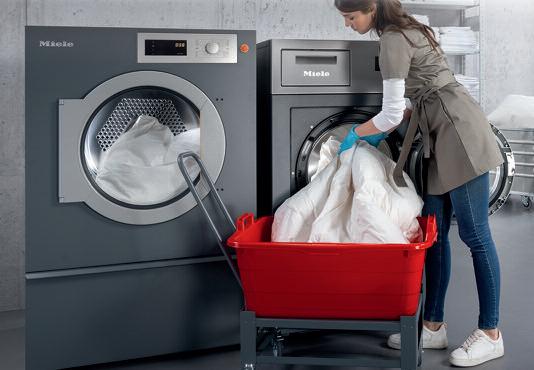
With regards to washing machines only a commercial washing machine will suffice in a care environment as only these machines will meet the WRAS requirements for Fluid Category 5 Forbes recommends using Miele commercial washing machines as they are highly energy and water efficient whilst delivering both thermal and sluice disinfection As an illustrative example based on an electricity cost of £0 34/kWh and three machines being used four times/ day for five years, Miele machines can realise a running cost saving of £9 529 when compared to another industry brand
Auto-dosing equipment also provides a great solution for ensuring that the right amount of detergent is dispensed for each cycle; minimising waste optimising the wash cycle and saving both money and time
Forbes Professional provides a range of options for commercial laundry equipment including auto-dosing equipment as well as Miele commercial laundry machines All of their products are available on a purchase rental or lease basis, with access to a comprehensive service that includes installation, commissioning, usertraining and a multi award-winning repair and maintenance response
Working
combat counterfeiting and grey market activity


Our industry leading eCommerce system is designed to reduce cost improve efficiency and streamline supply chain management and will fully protect the integrity and accuracy of critical business data The order entry process is very simple meaning suppliers and vendors can spend their valuable time on tasks other than ordering apparel labelling

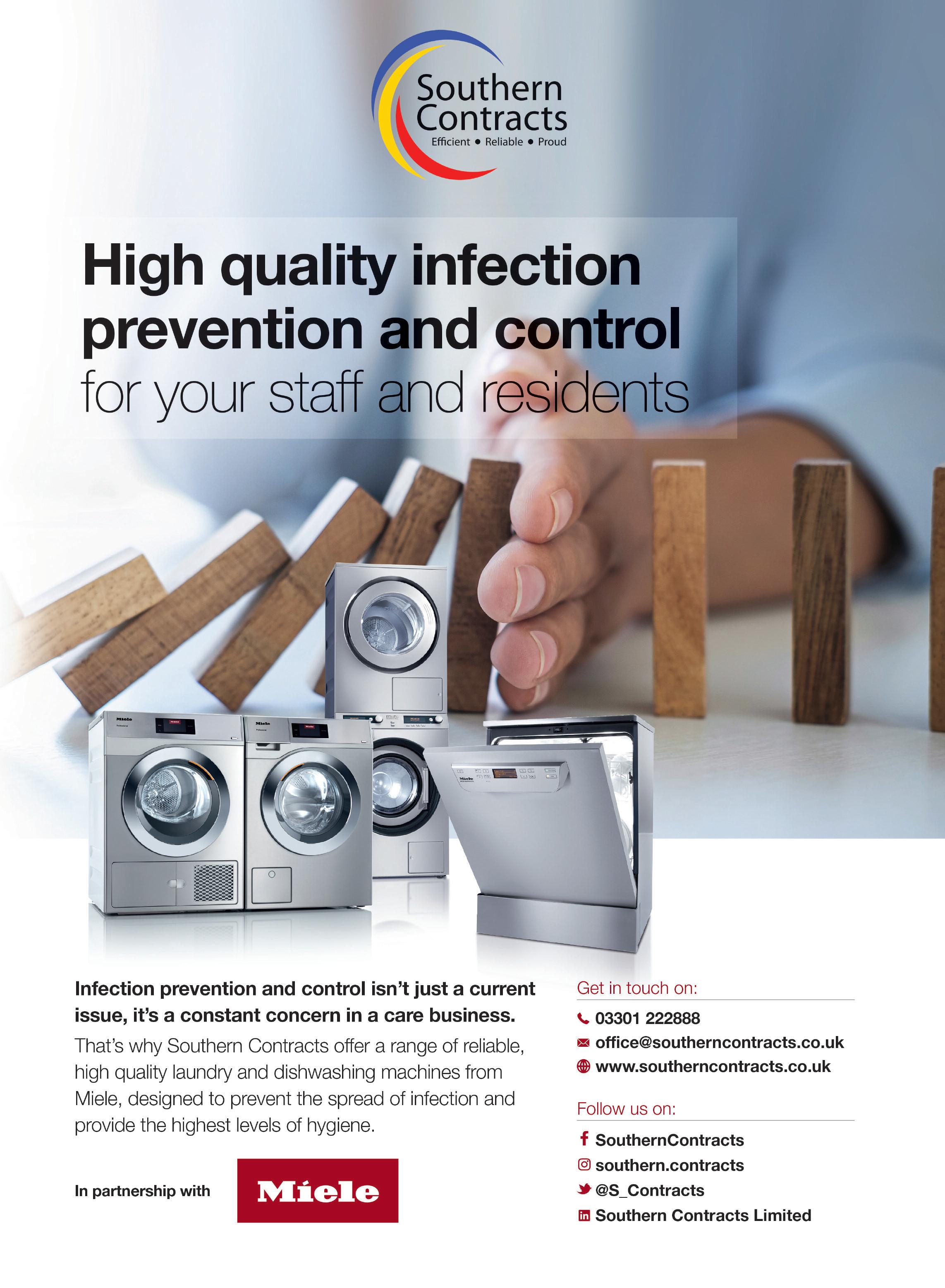
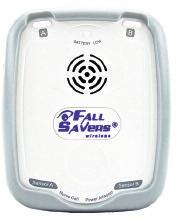

Fall
The TreadNought® Floor Sensor Pad is built to last with a durable construction that far out lasts the competition Our anti-bacterial floor sensor pad is compatible with most nurse call systems or can be used with a portable pager to sound an alert when a person steps on to the sensor pad Caregivers typically place the sensor pad at the bedside in a doorway or other locations to monitor persons at risk for falls or wandering An optional anti-slip mesh reduces the potential for slippage on hard surface floors
Features include:
Connects directly to most nurse call systems
High Quality anti-bacterial Floor Sensor Pad Large Size Pad Measures (L) 91cm x (H) 61cm Options (sold separately): Anti-slip mesh for hard surface floors See the advert on this page for further details or visit www fallsavers co uk

Care technologies have advanced at an amazing rate over the past decade The digital age is a place where we all live and all use technology as a familiar part of our daily lives At Medpage we have harnessed these advancing technologies into products to support Social Care and Independent Living Medpage brand products are designed to provide affordable user-friendly care support products for domestic and professional care Our new wristband activated door egress alarm is a perfect example of how advanced technologies are transformed into a system to safeguard people prone to wandering Simple to install suitable for single or multiple residents the system allows residents to remain mobile while providing an alert to carers if they attempt to leave the building through a monitored door Further details available at www easylinkuk co uk search Doorwatcher
Medpage have supplied Care, Residential Homes, and Hospitals with fall prevention and detection alarms for more than 25 years From basic bed and chair exit detection alarms to more complex cordless sensor pad systems with nurse call integration, we supply quality systems that deliver cost effective performance
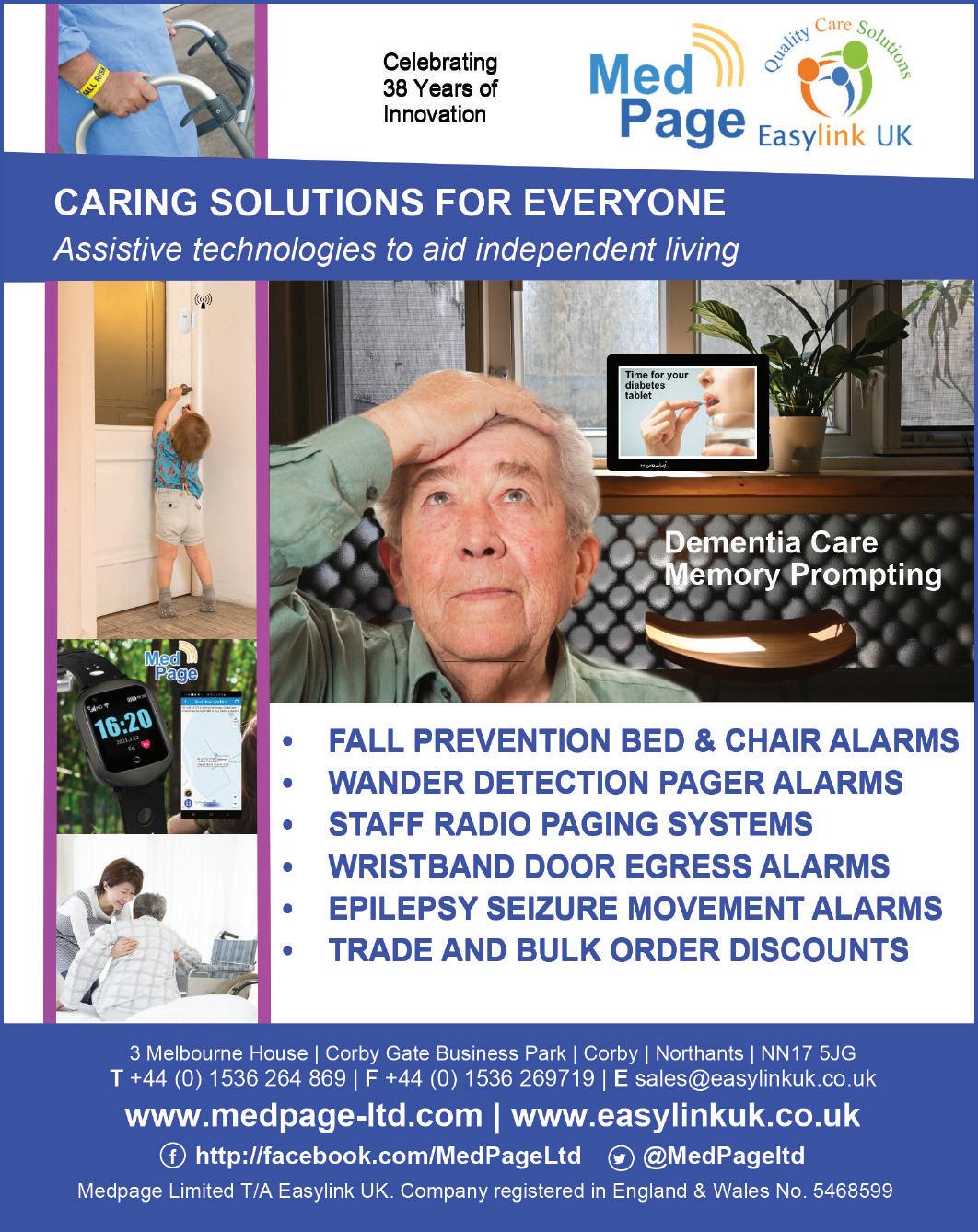
Our new sensor pad controller the MPCSA11 has been included into numerous falls management projects in Hospitals and professional care establishments The system already proven to reduce care costs allows a patient with mobility to transfer from their bed to their chair or to visit their washroom without alarm notifications to carers providing the transfer is completed within a selectable time Failure to return within the selected time will result in alarm notification to carers either by pager nurse call trigger or ward wall mounted alarm receiver
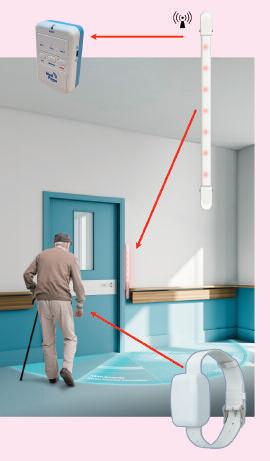
Quiet and calm care homes ensure that residents are able to live in a more relaxing and pleasant home environment
Similarly carers and staff find that they too benefit from reduced stress when working in a home where noise levels are kept to a minimum There are many environmental factors that can affect those sensitive to their surroundings particularly those suffering from dementia these can be fluctuations in ambient temperature light and of course noise Repetitive and high levels of noise can originate from a number of internal and external sources for example telephones ringing loud conversations in corridors and call bells sounding, often one of the largest contributors to increasing the levels of stress and discomfort in residents
A published study by the University of Stirling stated that unanswered Nurse Call (Call Bell) alarms can be one of the most common causes of stress in dementia sufferers The University recommends “fitting call alarms which alert nurses but do not resonate throughout the whole building Alarms can be particularly disconcerting as they may encourage the person with dementia to respond or investigate what the matter is At the very least the loss of sleep will compromise a per-
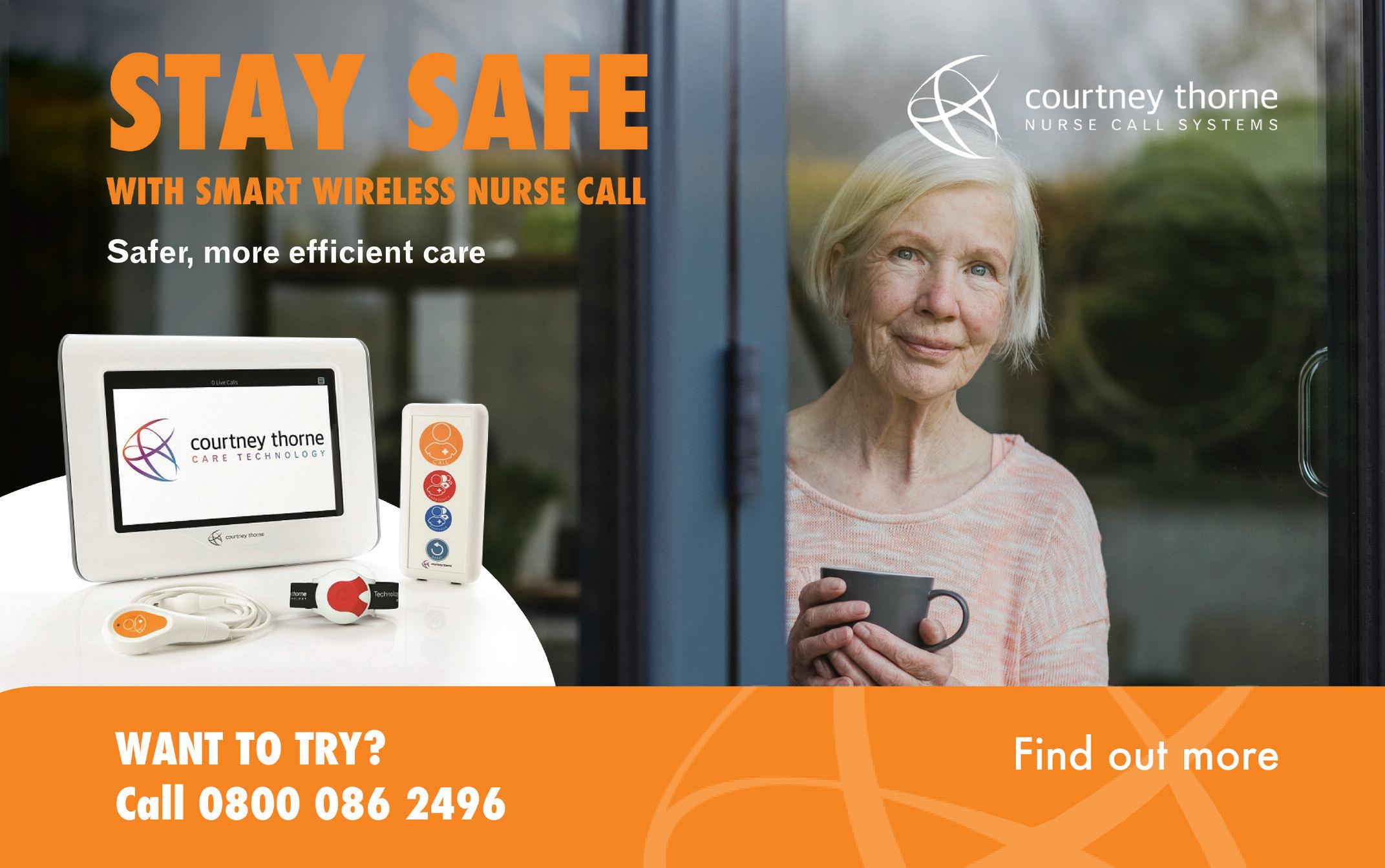

stressed also this
son’s ability to concentrate It can affect their attention levels and capacity to cope as well as being detrimental to their overall state of wellbeing Personal paging systems are preferable to bells and buzzers Modern Nurse Call systems can incorporate a number of methods to reduce their impact in a care home These include zoning whereby there are separate alarm types used depending upon the location of the call In these circumstances dementia sufferers and those vulnerable to noise can be located in one zone whist less vulnerable residents live in an alternative “zone” Each “zone” can operate different call tones warning lights or other methods to alert when help is required
Reducing noise levels is essential to create a tranquil environment for residents Pagers have been around for many years are a relatively simple and cost-effective measure in reducing the levels of noise, and can be added to most Nurse Call systems Smart Mobile Devices are now becoming more commonplace for care home staff and hold a variety of apps for care planning e-medication etc Many Courtney Thorne clients are now utilising the “Go” app with their Nurse Call system With the “Go” app nurse call alarms are delivered immediately and silently straight to the handsets alerting the individual carers to all Nurse call alarms without creating any general alarm sound and rarely disturbing the rest of the residents in the home
Calmer residents ultimately means that staff are less
www.nursecallsystems.co.uk
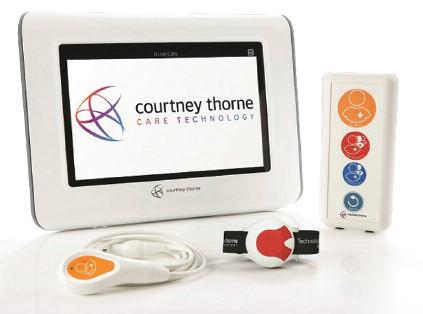
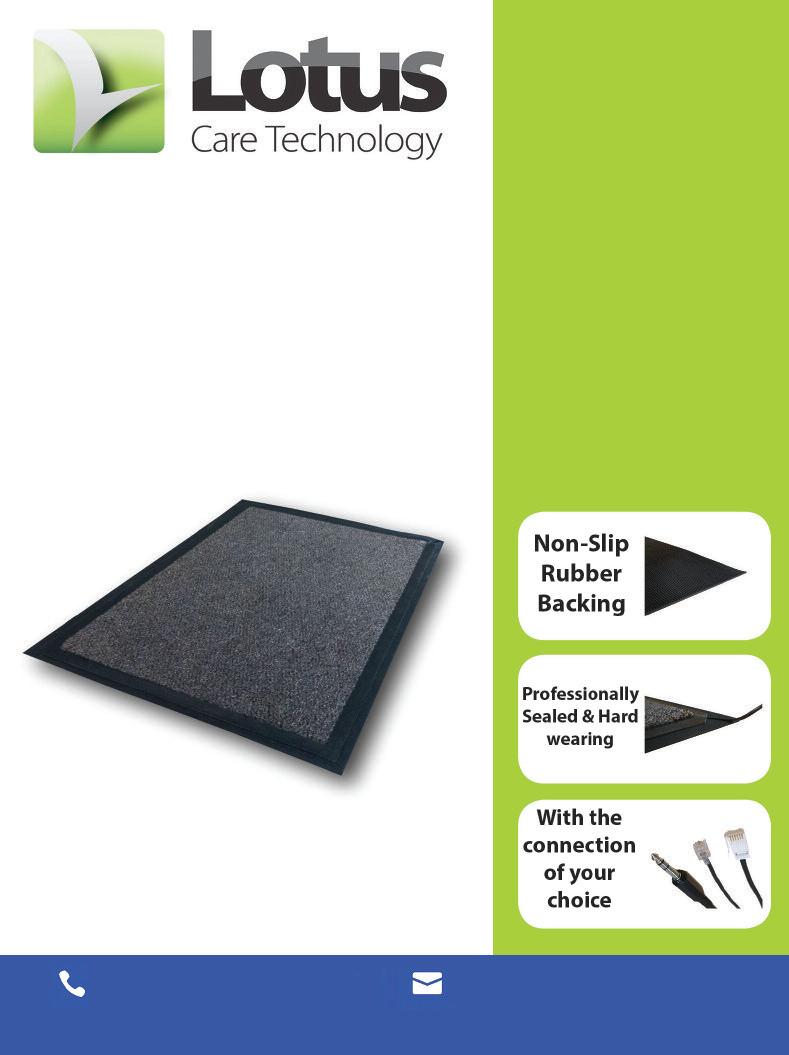
The UK is embracing a new era of data-driven social care reform Digitisation and datafication are enabling enhanced visibility, unlocking a new paradigm of proactive person-centred care How is data enabling this transformation what are the stumbling blocks and what strategies are necessary to create a new digital roadmap that leads to better outcomes?
Stuart Barclay, UK sales director of fall detection and remote monitoring supplier Vayyar Care recently chaired a live roundtable discussion with key players in the social care sector to explore the power and potential of technologyenabled care


Four of the field’s leading providers and thought leaders explored the key factors driving change in social care The conversation brought together Alyson Scurfield, CEo at TSA, paul Berney, CMo at Anthropos, Claire Aldridge, Strategic Contract Manager at Millbrook Healthcare Group and Tim Barclay CEo at Appello to share their visions for the future and how they are leveraging data to truly transform care
STUART BARCLAY:
Thank you all for being here Alyson, can you tell us about the need, demand and market readiness for data-driven social care and digital transformation?
ALYSON SCURFIELD, TSA CEO:
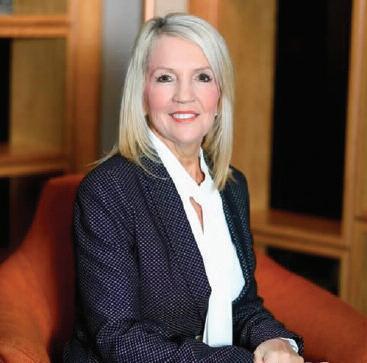
First I d like to thank Vayyar Care for bringing us together for this important discussion I’m delighted to be here
As part of the advisory body for technology-enabled care in the UK I’m passionate about the power of data to transform care, enhance lives and deliver better outcomes for people and communities Using data to provide better care is at the heart of what we do at TSA We’ve been talking about this since early 2019 pre-COVID and identified three cornerstones – data people, and partnerships – as the key drivers of transformation to enable true preventative care We ve had a bird s eye view of the process of change that’s impacting services and communities across the UK
We learned that we’re data-rich but intelligence-poor We need to give people relevant data insights that they can use to make more informed decisions and carry out better care planning not only for family members and frontline workers, but also to allow care recipients themselves to play an active role in managing their own self-care Technology is delivering better outcomes for people It’s the glue of transformation and we’re starting to prove it
Data can drive better outcomes, enabling people to live longer independently in the place of their choosing The scene is set for true health and social care reform
Let s talk about the journey from analogue to digital How are reactive legacy solutions and devices falling short when it comes to falls management?
We recently conducted a survey of social care providers that identified falls management as the primary drain on resources 69% of respondents said that falls are the most common reason for responder visits But more than a quarter of those callouts turn out to be false alarms putting a huge strain on staff
A big part of the problem is that the vast majority of fall detection solutions on the market aren t practical Take cameras for example Most care users do not feel comfortable with video cameras invading their privacy at home
In the past caregivers had to deal with so many false alarms especially when it comes to fall detection Reactive legacy solutions like buttons and cords are useful only if they re within reach and the resi-
dent is conscious mats are often unreliable and break frequently and wearables have to be charged, while the care user must remember to put them on
At Millbrook we ve recognised that historically the sector hasn t been using data as smartly as we could and that’s something we’re keen to address That s why we re partnering with companies like Vayyar and Anthropos, who share our vision, so that we can start leveraging data to get the best outcomes for our service users and help them feel secure about using the technology
We ve adopted a digital-first approach meaning that we re phasing out all analogue devices Our goal is to start leveraging data to get the best outcomes for our service users
We want to capture the full benefits of technology to overcome the problem of false alarms and use it to predict and prevent crises
It s an exciting time right now and there s plenty of new tech coming on board We want to be sure that Millbrook is at the forefront of change and innovation in the sector
False alarms have made people weary – and wary – of technology that wastes valuable time and resources With all new technologies we need to give people confidence that they meet rigorous standards and have fully proven themselves
The transition from analogue to digital has been going on for the past seven years One of the good that the TSA and the industry s momentum have helped us to understand is that this isn’t just about replacing a device that signals analogue with a device that signals digital It s an opportunity for a step change to business models service models, and the outcomes you deliver because there is so much more power and capability in a digital environment We have more digitally connected customers than anyone out there and proven solutions to choose from We ve put digital infrastructure into more than 25 000 apartments and scores of case studies of people who were considering the journey and now have accessed proven innovative solutions
We ve gone out of our way to make ensure that we are as interoperable as possible We have transition models both commercial and technical to help the transition from analogue to digital We re not just moving from one box to another – that would be missing the point The transition to digital can deliver services in a more effective personalised, and meaningful way for the end user, and that doesn’t mean at a higher cost You can deliver better services at a lower cost through more intelligent use of the digital capabilities that technology-enabled care has to offer
Our survey also revealed that 90% of service providers acknowledge that frontline staff are spending too much time on administrative tasks More data should really mean less paperwork for staff What s more 88% of providers agree that more data about how long users spend at home and their activity would help deliver more personalised care And that leads to our next topic: outcomes How can we use data smartly to reduce the burden on overworked caregivers and ensure better care?
It s worth contextualizing the word data It s not reams of information that need to be analysed It’s data delivered simply and sensibly Data is machine-driven pieces of insight that can be easily shared in a digital form
We must be able to deliver single nuggets of information that care providers can act on Simple messages like “I m OK”, clearly delivered on a dashboard, can make an enormous difference to the productivity of frontline staff

It’s the job of the connected care platforms like Anthropos and others to process manage and analyse the data Ultimately care providers are only interested in the intelligence that will allow them to make better-informed care decisions
They re only interested in the end product – the insights That’s our job and we do it best when we know the desired care outcomes Then we know what insights we need to identify We take the data and divide it into four basic categories: environment daily routine and behaviour patterns physiological wellbeing and safety and security Then we take all that data and turn it into intelligence But we can only do that when we know what the goals are what insights we need to provide and what actions are required When you have a platform can reveal behavioural changes you can step in and take preventative
action Then you can make a real difference to someone s life no matter stage of the care journey they’re at
STUART:
You touched there on the importance of the joined-up care journey Ultimately, it s collaboration that enables the delivery of person-centred predictive care According to our survey almost 80% of service providers agreed that sharing behavioural data is critical to unlocking personalised outcomes We need to change the norm so that we can start working together cohesively as suppliers to support service providers in collaboration with TSA But let’s get more specific
What insights have been unlocked by the behavioural data you gather and how do you share them with key stakeholders?
PAUL:
We re good at integration and that s because we understand the importance of working together I’ll give you an example We got an alert that showed that a resident hadn t started her morning routine within half hour of her regular pattern, and then the data revealed she had been up several times to go to the bathroom This is a person with long history of UTIs so the platform could identify this wasn’t the norm for her and sent an alert It s then up to the care provider to decide if it’s necessary to take action or just to keep an eye on them
STUART:
You re absolutely right Data sharing is the key to cohesive meaningful and fruitful partnerships between technology suppliers platform providers and frontline caregivers Sharing behavioural data that reveals mobility physical and mental health and potential medical conditions is critical to unlocking personalised care and optimising outcomes That applies both to overall care management and to the risk factors of falls
PAUL:
Exactly and that s why our customers want Vayyar Care Managing falls more effectively through better communication is at the top of our priority list when it comes to care management
Passive falls monitoring is so important because we all understand the drawbacks of wearables
We want to give people confidence that they re buying into a system that’s gone through exhaustive evaluation and testing, because if you re going to make a care decision based on data you need complete confidence in the quality of that intelligence
ALYSON:
Achieving the best results through focused insights and intelligent data sharing is all about partnering with the right people Collaboration is paramount in terms of providing better outcomes We want to help people feel secure about using technology as a reliable resource and that s a team effort We re partnering with leading tech and platform providers like Vayyar Care and Anthropos who share our vision and want start to using smart tech much more wisely We need to guarantee that our partners deliver the best quality adhere to the highest safety standards and like us, are committed to putting the service user at the heart of everything they do Above all we re committed to the quality standards framework which includes ethics and continuous quality of care
Come visit the TSA website We ll put you in touch with organisations that have loads of case studies to show how we’re making this possible We also have a list of certified members that we can guarantee are delivering this partnership approach and are delivering quality service
Well that brings us to the end of our roundtable on how data is transforming social care I d like to thank you all for being here and sharing your insights and experience As the social care sector expands, it’s clear that local authorities across the UK need to embrace new sensor technologies leading-edge platforms and above all fresh best practices if they’re going to continue to put people at the heart of care
If you d like to discuss any of the issues raised in this roundtable or connect with any of the contributors please email Stuart Barclay directly:
stuart barclay@vayyar com
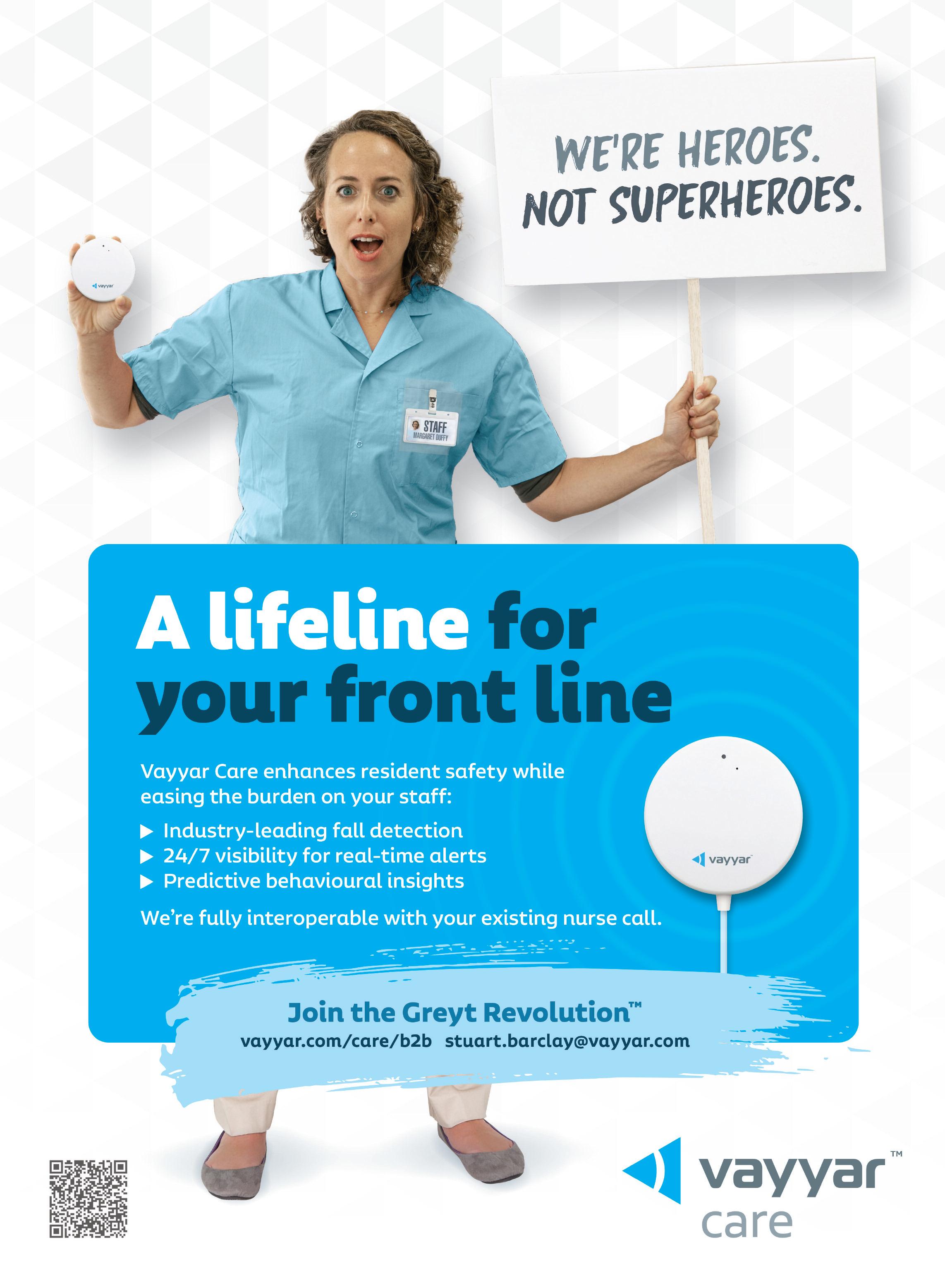
Carers never have enough time to care but going digital can provide more
There are so many time-consuming tasks such as writing care notes completing paper assessments filling in charts preparing handovers and countless other administrative tasks
Going digital can automate many of these tasks and enable recording care interactions in real-time ensuring nothing is left undocumented and saving time that can be better spent providing care
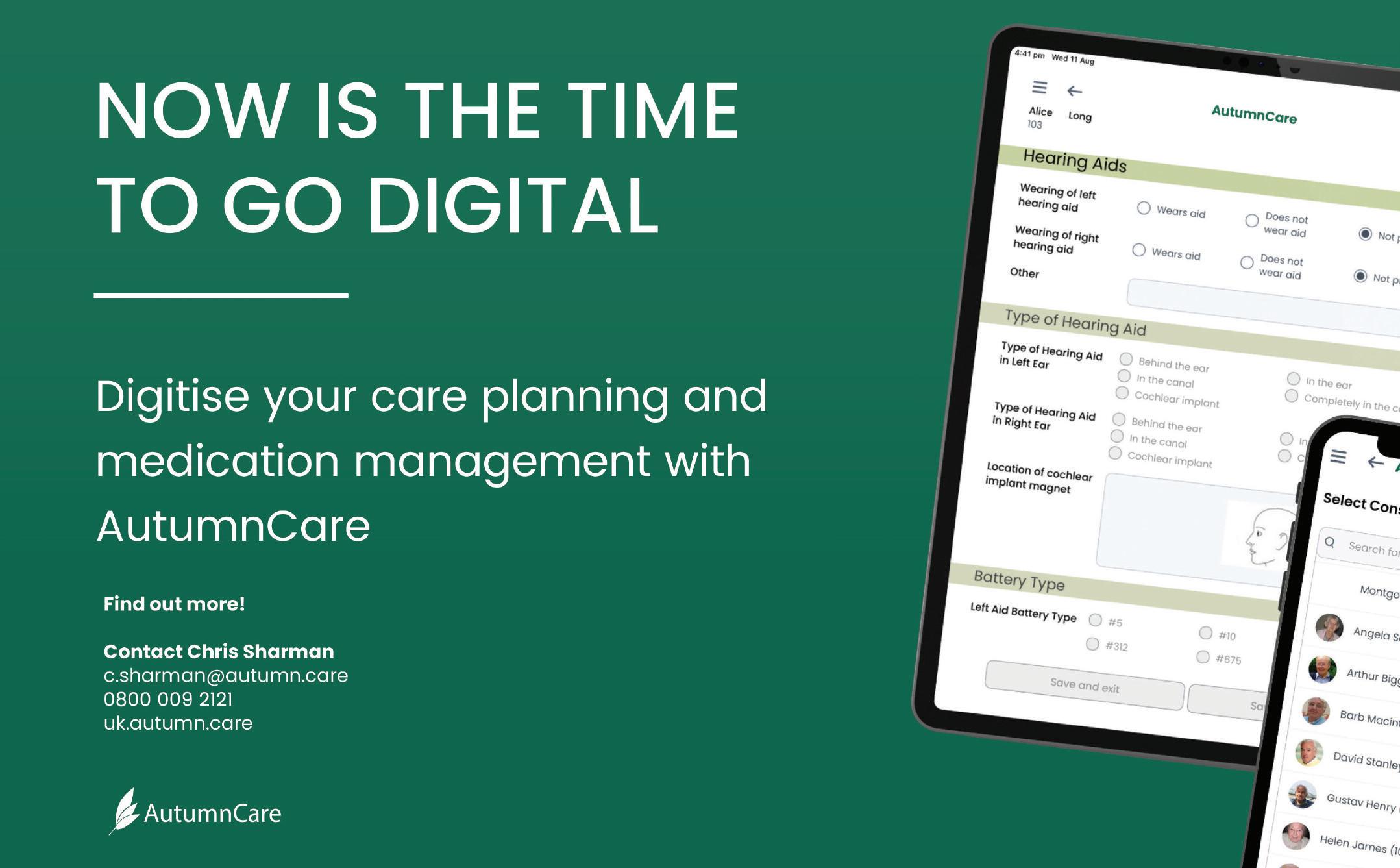
Digital care systems are safe and accessible maintaining the security and confidentiality of your data
This is difficult to achieve with paper because sensitive information must be locked away when not in use per GDPR
Furthermore digital allows you to determine who can access and what via permission controls Staff only see what they need to see based on their role
Protect your business
Going digital makes it easy and efficient to evidence
the quality of care you provide In addition as a digital system has a complete audit trail you can be assured the information you are providing is accurate and complete COSTS
The most considerable cost saving that going digital can provide is time While the amount of time saved will vary between service types and roles this alone makes going digital worthwhile
RISK
Using inbuilt alerts ensures that nothing is missed whether that s a care plan change or a fall report Using an eMAR will help reduce medication errors and ensure that the 6 Rs are always met

Going digital also allows the collection of data at the point of care which can be analysed to identify trends and risks and demonstrate corrective action
RETENTION
staf f retention
Using electronic care systems to change the focus from the administration to the delivery of care helps
stage engage more with service users
Additionally providing smart tools like care planning and eMAR software to reduce the administrative burden will decrease staff stress
With pre-built assessments covering all aspects of health you can get to know your service users intimately
But it s not just health; other characteristics such as emotion likes/dislikes and how they correspond to a wide range of activities can be recorded
EVIDENCE
Demonstrate quality of care deliver y
While the delivery of person-centred care is paramount care providers must also provide evidence of the care they deliver and regulatory bodies actively encourage the use of technology
Digital care plans are the best way to achieve this!
Improved visibility
Electronic care systems ensure that managers have real-time access to notes and information to instantly understand the care provided and help identify
changes that need to be made to improve the quality of care
AutumnCare contains a customisable Dashboard to provide Managers with a snapshot of what is occurring across the care service at any point in time
WONDERING HOW TO GO DIGITAL?
AutumnCare provides specialist digital care planning and eMAR software enabling providers to migrate to a digital system and providing the foundations for outstanding care We can walk you through what is required step by step as well as provide training and support every step of the way
To realise all of the benefits above plus many more get in touch with us today
Contact Chris Sharman
Email c sharman@autumn care Call 0800 009 2121
Website uk autumn care
Reminiscence therapy is proving to be particularly effective for people living with dementia and this is a fantastic example of how we can utilise modern technology to help them to unlock treasured memories and engage with others ” he further explains
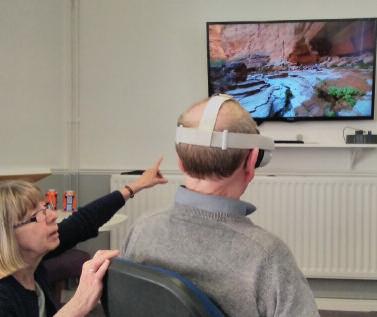
Advinia is one of the UK s largest care providers and has for some time now been engaging in groundbreaking technological advancements to provide the best care for residents With a vision to create a better everyday life for its residents Advinia continues to explore the ever-present opportunities that technology provides to make life for the elderly more enjoyable
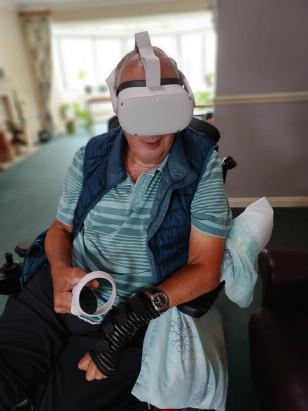
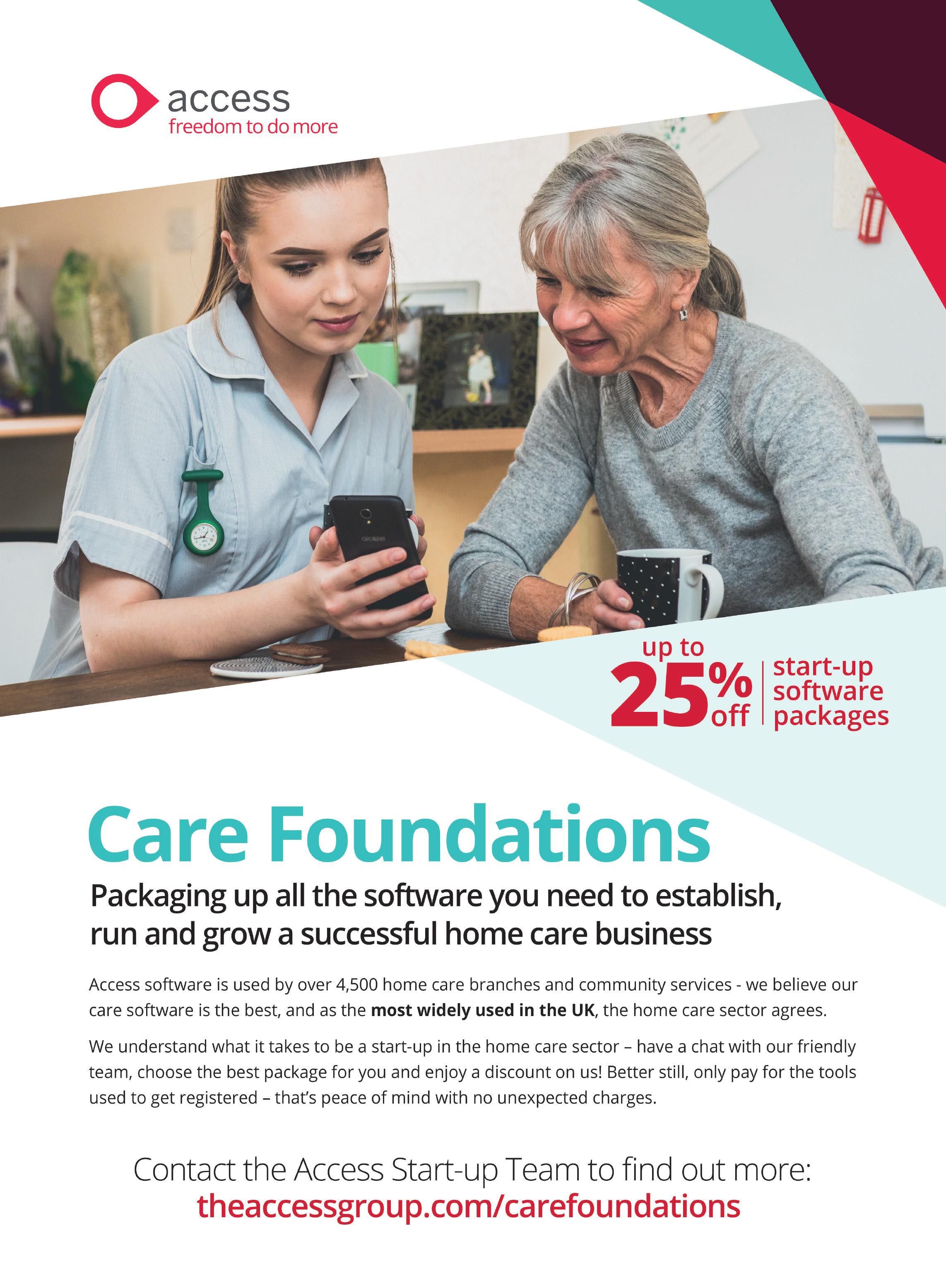
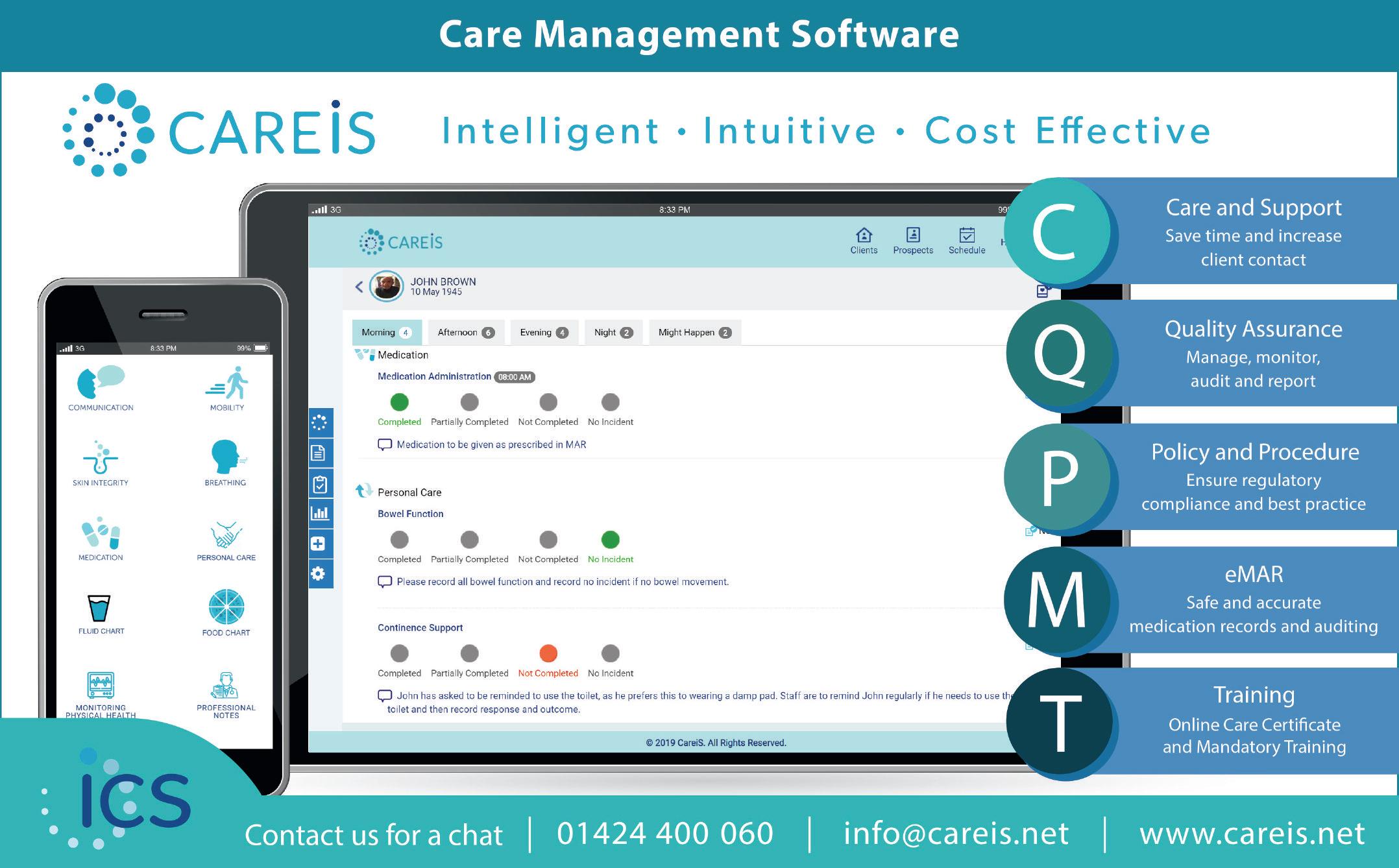
CAREAudits apps and systems evolved via an associated company Kern Systems were Ken Newlove director and founding member had been developing and deploying paperless systems for EPoS and Finance in the private and public sectors since 1999
Back in 2014 the team had more than 50 years experience in IT and software development as well as having been heavily involved in the third sector with a trustee of three charities a director of a business directly involved in the care market and a consultant in a £10 million turnover charity and interim CEO and Chair at an adult hospice

Working in the Care Sector the team recognised in 2014 the sector was becoming overwhelmed with
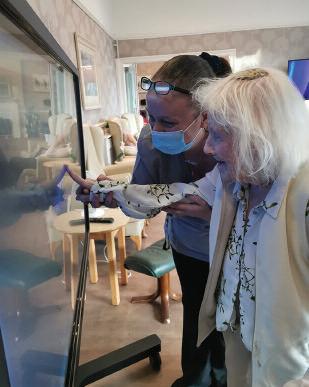
administration driven by ever increasing legislative compliance requirements and controls and pressurised by ever increasing costs The CAREAudits apps evolved from their desire to give something back to the Care Sector; to develop systems that genuinely reduce costs and increase efficiency as well as improving accountability and quality And above all a system that would be easy to install and use by everyone
The CAREAudits app and Web Portal Auditing Tool is now being used throughout the UK and Ireland by all care service providers in numerous locations There are thousands of carers checking everything from CQC Compliance and Safety to Medication Audits Training and Maintenance as well as service users quality and wellbeing and now Corona Virus Steve Smith regional manager at Care Homes UK
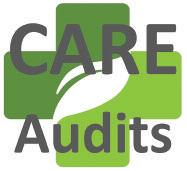
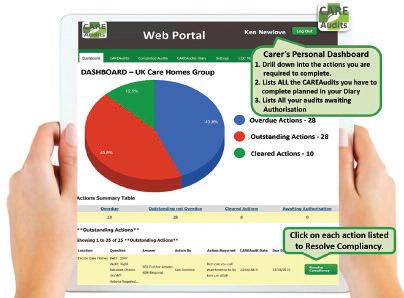
says “We were able to implement the system ourselves and are now benefitting from management having all the information we need at our fingertips in real time wherever we are
The system allows care providers to audit or check just about everything and manage areas requiring actions (or non-compliances) in it s Web Portal Encrypted date and time stamped evidence including photos is seamlessly auto attached and recorded in the system
Natalie Lawrence at Yorkare Homes says It s a paperless system that runs alongside our existing client records system helping to make our whole operation paperless ” CAREAudits ensures management and staff are aware at all times of what needs checking that it’s been checked actions required by whom by when including full resolution management Each CAREAudit also scores the answers so manage-
ment can monitor improvement Steven Tegart from Talbot Group likes reporting and says “I wish all my other systems were as easy to extract data for management reports as the CAREAudits Excel links
The system has over 120 example audits to select from CAREAudits apps are extremely easy to use and care providers can easily add or edit their own audits in minutes ensuring simple management of ever-changing requirements App auditors can use CAREAudits with virtually no training it s that simple The Care Auditor s Hands Free Operation guides the user through each audit each question and answer with it’s own help text standard answers and standard actions required ensuring that the least skilled operative becomes the care provider’s expert Users can download the app for a free trial and be up and running with the full system in minutes
Please mention THE CARER when responding to advertising. Please mention THE CARER when responding to advertising.
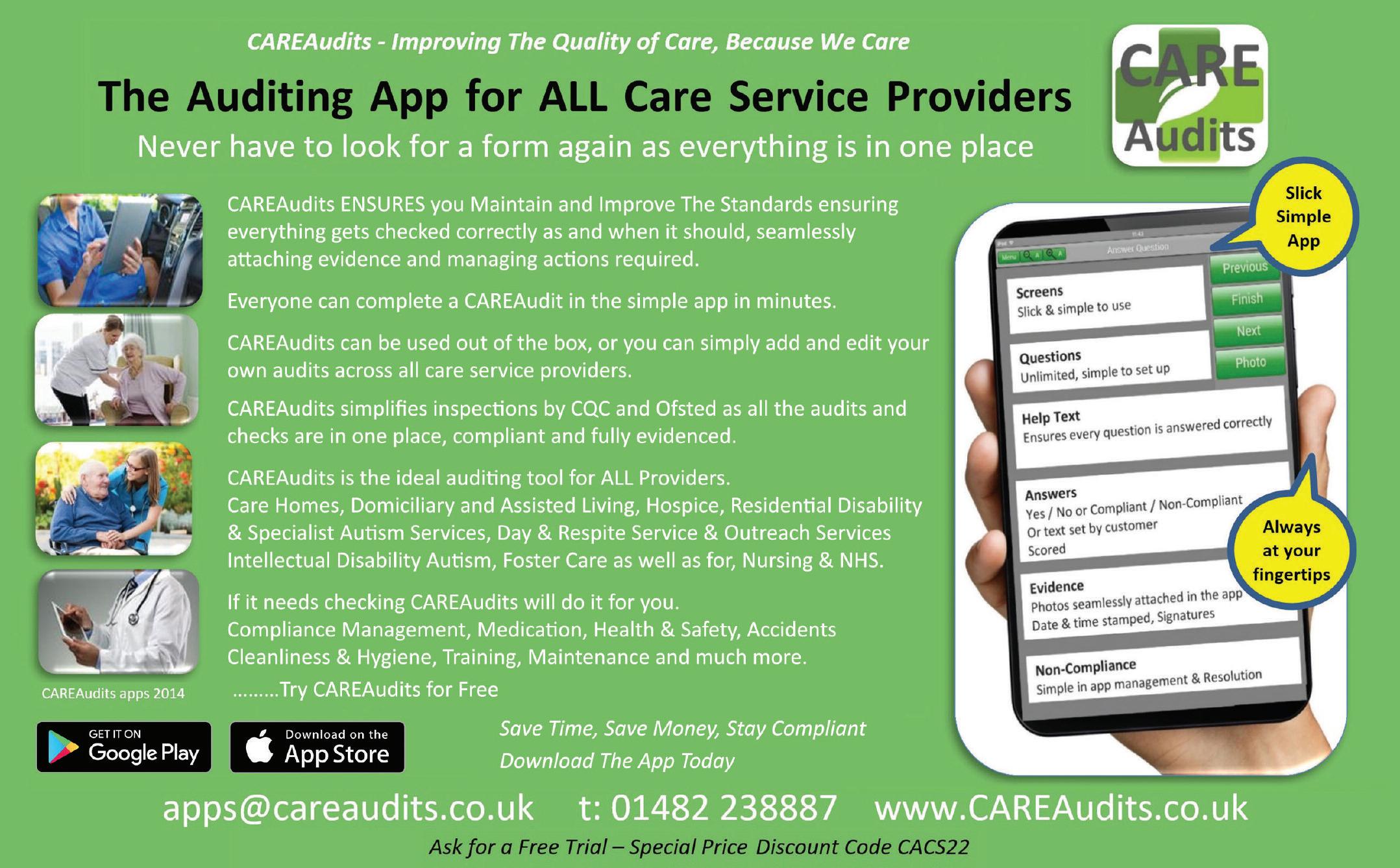
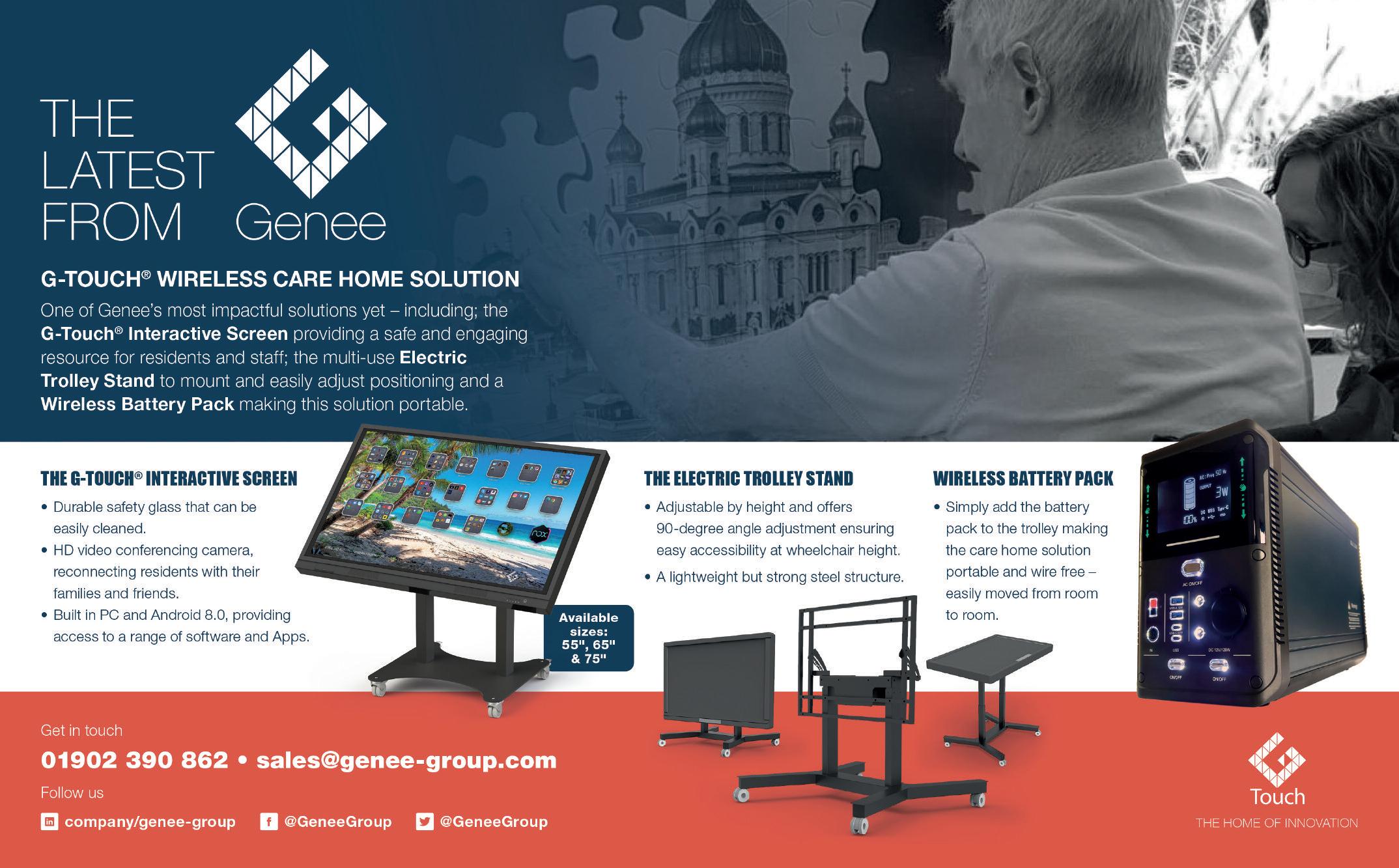
Specialist business property adviser Christie & Co has today launched its first Care Market Review 2022 report which analyses the transactional healthcare market in the UK: looking at buyer appetite transactional activity and investor demand local authority fee increases and the funding landscape It also includes an operator survey which gives an insider view on occupancy and agency staff usage from some of healthcare’s leading operators
Christie & Co reports strong demand for care home opportunities throughout the UK with a 78 per cent increase in completions from 2020 to 2022 and deal numbers significantly ahead of pre-pandemic levels This year offers sat at an average of 101 per cent of asking price underlining that strong investor appetite with competitive bidding is commonplace Christie & Co noted however that with the changing macro-economic landscape the trend moving forward will be driven by a number of factors including the availability of capital and the alignment of vendors pricing expectations relative to prevailing market conditions
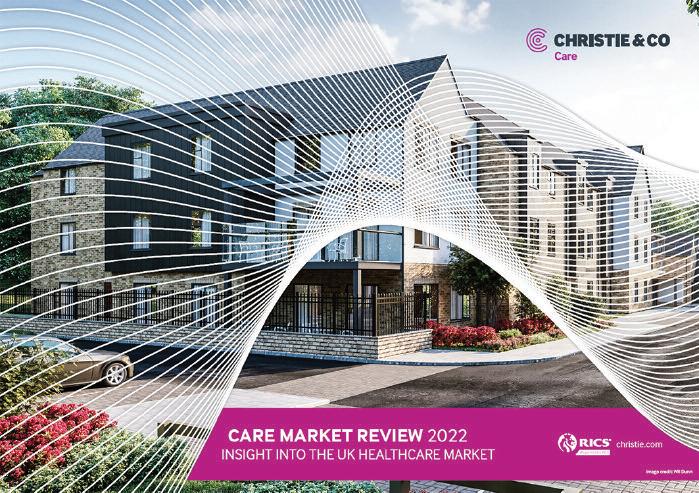
New instruction levels increased by around 30 per cent from 2020 to 2021 and they continue to grow as operators capitalise on the buoyant market conditions and strong values achieved
The company notes that its most active buyer type over the past five years has been independent operators with one or two homes which, on average transacted on 41 per cent of deals in the sector So far in 2022, corporate operators and investors have made up 33 per cent of deals while first-time buyers made up just 7 per cent – a fall of 9 per cent since 2018 which is reflective of the increasing funding challenges for first-time buyers the regulatory burden of the CQC and the increase in quality, higher value stock on the market Thanks to a competitive marketplace and the increased use of technology in care homes which can allow for some operational work to be conducted remotely buyers are increasingly looking further afield with almost half (48 per cent) of deals in 2022 concluded to buyers who live over 100 miles from their target business A large number of deals were concluded in and around urban centres yet there has been an increase in the number of care homes transacting in rural and coastal areas
CLOSED CARE HOMES
Over 1 500 care homes ceased trading between 2015 and 2020 This was not solely linked to CQC ratings, as over 40 per cent of care home closures in 2020 had ‘Good’ ratings and were closed for a range of reasons, including margins and cost pressures
A record 31 per cent of the care homes Christie & Co sold in 2021 were on a closed basis – 56 per cent of these were sold for ongoing healthcare use whilst 26 per cent were sold for residential conversion The number of closed care homes sold dropped to just 13 per cent in 2022 however an increasing proportion (80 per cent) of these closed homes were sold to care home providers
When analysing local authority fee rate rises across the UK in the fiscal year 2022/23 Christie & Co found that fee increases fall short of inflationary cost pressures in the sector There was a large disparity between fee increases throughout the UK from 3 1 per cent to 12 8 per cent with an average residential fee increase in England of 5 4 per cent and nursing fees rising by 6 8 per cent Going forward the company expects the burden on the self-funded client base to increase OPERATOR SENTIMENT
Christie & Co interviewed a cross-section of local and regional
providers in the UK to gain insight into some of
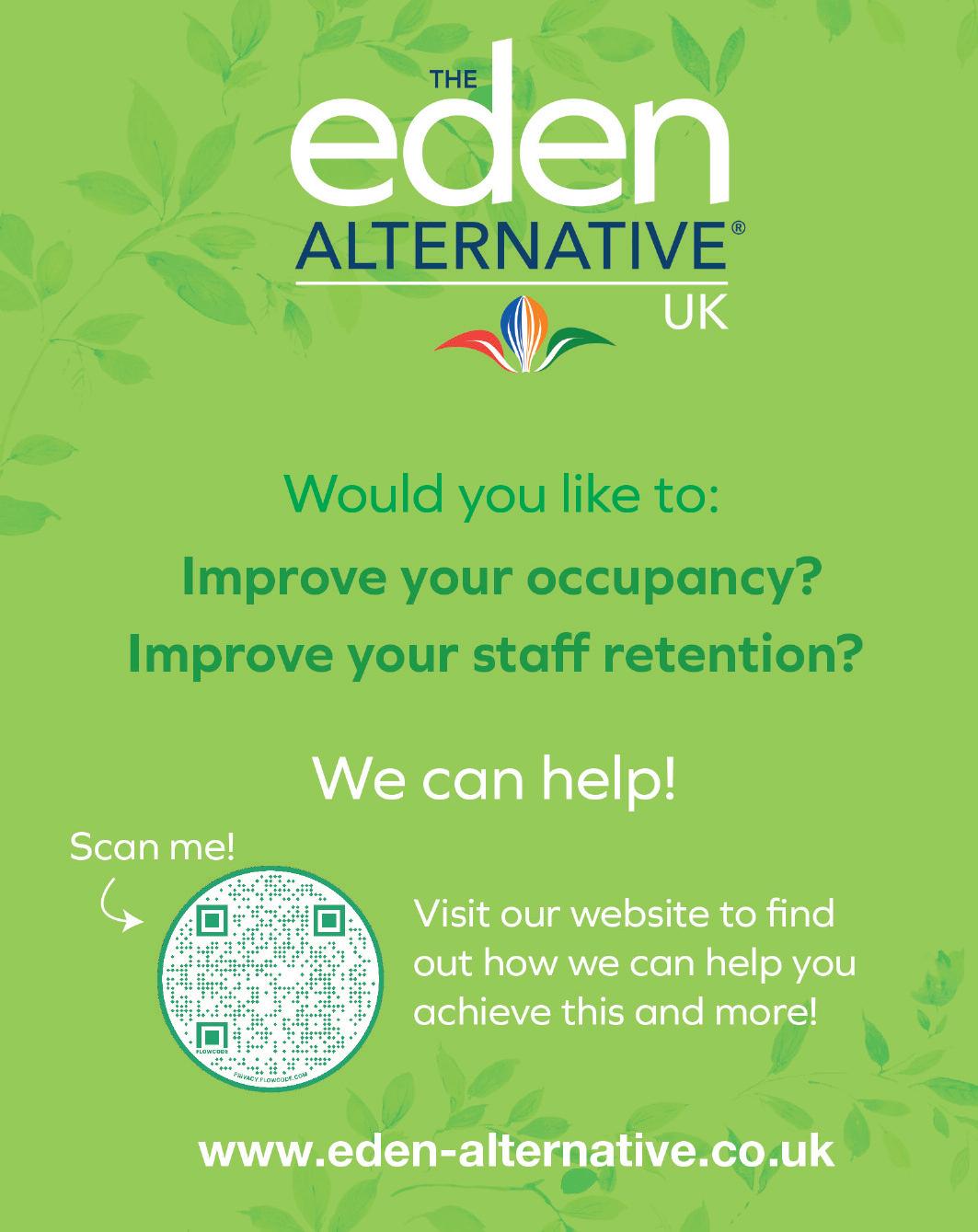
operational challenges they re facing
With resourcing placing a huge strain on care home operators 52 per cent of respondents said that they have a widespread use of agency staff Those that have obtained a sponsorship licence to recruit staff from abroad have been able to tap into new markets for their recruitment needs and this has been successful for many However with over half of providers still having to use agency staff to fill their rotas business costs are increasing further
While 43 per cent of operators said occupancy has returned to prepandemic levels for 57 per cent occupancy is still recovering There is a wide variation in occupancy trends across the UK with many smaller regional operators saying that their homes are largely back to pre-pandemic levels and larger providers generally reporting lower overall average occupancy rates Positively though the majority report good enquiry levels which suggests that occupancy rates will continue to re-build during 2023
The report concludes with a look at the funding landscape written by commercial finance specialist Christie Finance which has seen 8 33 per cent fewer funded deals in the sector this year as operators look to their portfolios to expand or restructure existing debt The average loan size increased by 5 8 per cent, which suggests that funding in the sector is evolving to provide more refinance to buy or expand
First-time buyers making offers on care businesses fell from 48 per cent in 2021 to 45 per cent in 2022 due to the perceived difficulties in raising finance This area of the market has been more challenging as the recognised lenders retrench to service existing operators with proven track records
Rob Kinsman Regional Director – Care at Christie & Co comments
“The last couple of years have presented the sector with huge operational challenges but it is heartening to see that investor appetite has fully recovered We have confidence that the entrepreneurial nature of the sector will ensure the transactional market continues to thrive despite the growing economic headwinds ”
To read the full report visit www christie com/newsresources/publications/care-market-review-2022/
theImagine a situation where you would have little or no worries about staff walking away and having a team that are very committed to your organisation
HOW IS THAT POSSIBLE?
By hiring overseas staff through the Sponsorship Licences Government Initiative (We can help you if you don’t have a Sponsorship Licence yet)
WHY WOULD THE STAFF BE COMMITTED AND LOYAL?
According to the legal arrangement of their visa (right to work in the UK) all these overseas staff are obligated to stay at your organisation for 3-5 years otherwise they lose their immigration status and are liable for deportation to their country of origin
This makes them committed and legally bound to stay and work with you
Someone might say this sounds too good to be true What happens if the staff is not happy? The reality of the matter is that a very small
percentage will not work out but that is where we come in
Firstly we preselect the staff that we feel will blend into the culture of your organisation Secondly we will supply you with the tips that ensures a better settlement procedure for overseas staff Finally we are at hand through the continual coaching and mentoring program to identify ‘sticky areas’ and work with you on getting a mutually beneficial solutions
Purer Health Care Agency has been specially designed to help reduce the high staff turnover and its associated cost and disruptions as well as help overseas candidates obtain a better economically enhanced life This way we serve a business, social and economic purpose
We have conducted a robust background screening conducting Criminal Checks Identity Checks Work Reference Checks and Family History Checks Hence all our staff have been prequalified and have
The Eden model is built on what people say they want in a Home or a workplace which therefore attracts residents and team members alike
As an Eden Home builds its reputation upon the quality of life it offers to the people that reside there it follows that occupancy improves
As a programme that empowers staff and focuses on their wellbeing, It follows that staff retention improves
With a positive culture, a motivated and dedicated workforce, It follows that positive innovation becomes more possible sustainable and continuous
When demand for services increase it follows that viability improves
As a cohesive cultural progression programme it follows that innovation modernisation and positivity increase
The model is efficient cost effective and the training is delivered by experienced practitioners in Care Homes Homes are very busy places and the programme is therefore run on line for 1 hour per week for 6 weeks and people can do
this at work or at home
The 6 weekly sessions are run online with a workbook with links for further optional reading or viewing and should not be a burden to busy Homes teams and managers
It is however effective You can try without obligat on It is designed to make business sense to providers
It is designed to enhance viability
It is designed to support recruitment and retention
It is designed to motivate Care teams and is open to any individual to add their CV
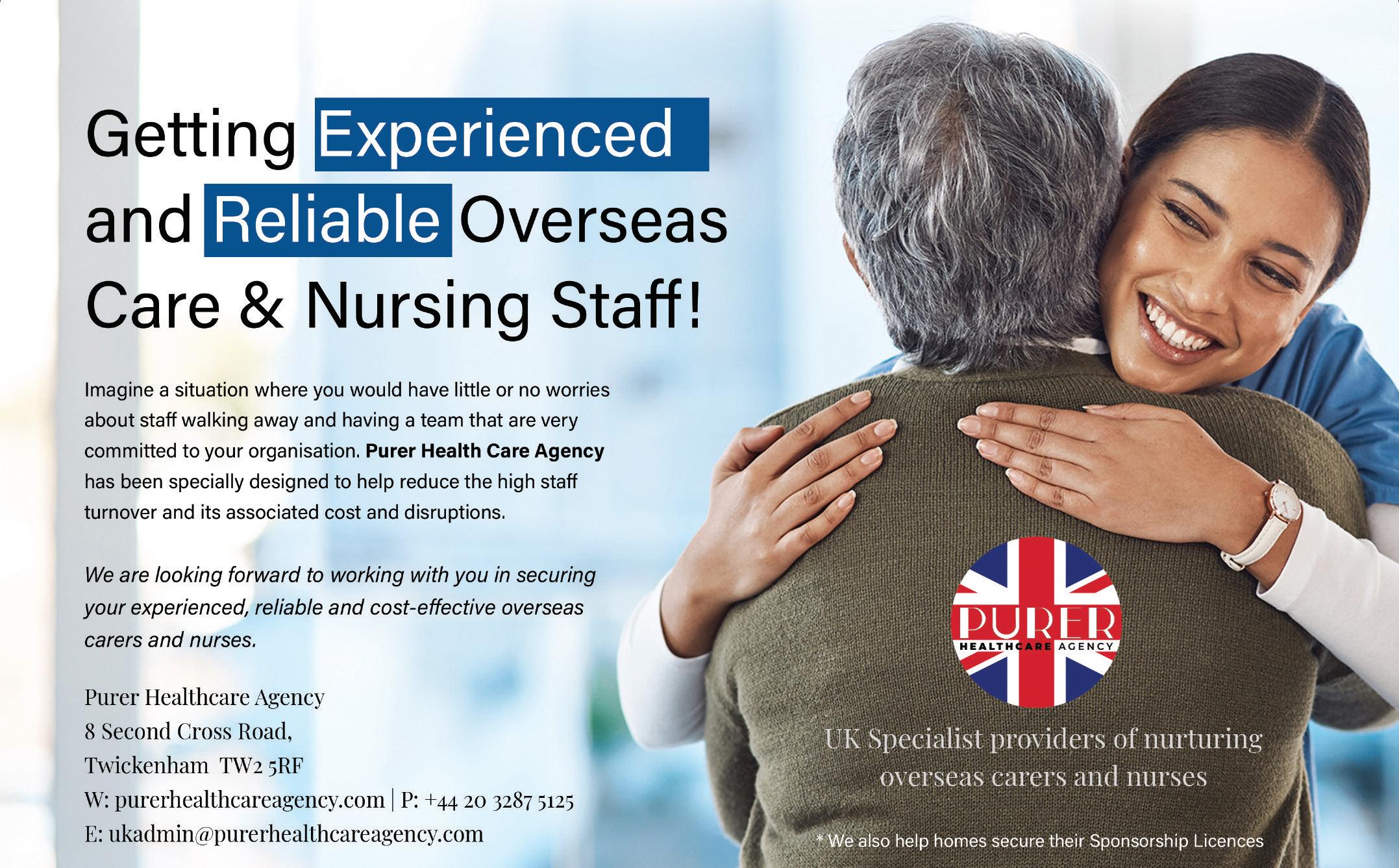
WHAT IS IT
It is a training programme which leads to accreditation and focuses in detail on 7 domains of wellbeing 10 principles and is particularly designed to address instances of loneliness helplessness and boredom Geoffrey Cox The Eden Alternat ve Call today on 01626 868192 or visit www eden-alternative co uk
Global assists clients throughout the U K who specialise in the healthcare sector to achieve their objectives of purchase development and refinance

We have organised over £1 8bn for clients in the past 30 years providing clients with competitively priced funding to refinance existing debt ease cashflow and develop businesses further
From helping clients make their first purchase through to allowing groups
to grow significantly in size we assist at every stage of your business expansion
Every proposal is individual and deserves to be treated that way, so we hope you will allow us to be of assistance to you and call us to chat through your plans and requirements I am sure we will be able to tailor a facility to your requirements
Call us on 01242 227172 or e-mail us at enquiries@globalbusinessfinance net
